

85 Critical Thinking Questions to Carefully Examine Any Information
There might be affiliate links on this page, which means we get a small commission of anything you buy. As an Amazon Associate we earn from qualifying purchases. Please do your own research before making any online purchase.
The ability to think critically will often determine your success in life.
Let’s face it. Every day, we are bombarded by news, social media updates, and an avalanche of information. If you take all of this at face value, it’s easy to be deceived, misled or ripped off.
That’s why it’s important to develop a mindset that focuses on critical thinking . This is a skill that needs to be developed in the classroom. But it’s also a valuable life skill.
With that in mind, the following post will share 85 critical thinking questions you can use to increase your awareness about different problems by carefully examining available information.
Let’s get started…
Table of Contents
What Are Critical Thinking Questions?
Critical thinking questions are inquiries that help you think rationally and clearly by understanding the link between different facts or ideas. These questions create a seemingly endless learning process that lets you critique, evaluate, and develop a depth of knowledge about a given subject. Moreover, you get to reinforce your viewpoints or see things in a new way.
We make decisions every day, whether at work or home. Adopting logical, rational, and practical approaches in addressing various issues requiring critical thinking is essential in decision-making. Therefore, before arriving at a decision, always ask yourself relevant questions and carefully analyze the matter’s pros and cons.
Critical Thinking Questions When in an Argument
When you make an argument using a critical thinking approach, you focus on justified claims that are valid and based on evidence. It helps one establish a strong argument.
- Do I disagree with the other person? Might the person I'm arguing with be misinformed on what they are saying?
- Would I be comfortable saying what I am telling him/her if I was in front of a group of people?
- What would happen if I lose this argument? Is engaging in this argument worth my time and energy? How will I feel if I lose?
- Is there room for ambiguity or misinterpretation? Are we arguing because I didn't make my point explicit? Should I take my time to understand his school of thought?
- Do I need some rest before saying something? Am I arguing because of other reasons other than the issues at hand? Do I need to take some time and cool down?
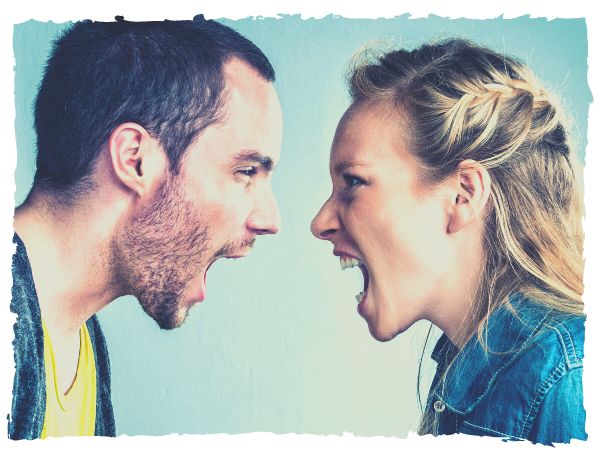
- Is it more important that I’m right? Am I trying to ask to prove an unnecessary point?
- Is this argument inductive, deductive, or abductive? Is it a weak or strong argument that I need to engage in? Is it compelling or sound?
- Is my opponent sincere? Given that they are wrong, are they willing to admit that they are wrong? Can they depend on available evidence, wherever it leads?
- Are my opponents only trying to shift their burden to me? What is the best way to prove them wrong without making them feel bad?
- Are the people I'm arguing with only interested in winning, or are they trying to pass some information across and help me discover the truth?
Critical Thinking Questions When Reading a Book
When you read a book, you probably ask yourself many “why” questions. Why is this a problem? Why did the character say that? Why is this important? The most challenging part of reading a book is assessing the information you are reading. These questions can help.
- If I learn only two things from this book, what will they be? How will they help me? How will I apply them in my daily life?
- What message are the authors trying to pass across? Are they making suggestions or providing evidence for their arguments?
- Given that almost every book is about solving problems, what is the most prevalent issue that the author is trying to solve?
- What is the author’s writing style? What strategy or master plan does the author employ to convey his/her main ideas throughout the book?
- Do I have background information about the book’s topic? If so, how is what the author is saying different from what I already know?
- What didn’t I understand from the book? Should I re-read the book to understand everything the writer is trying to convey?
- Which sections of the book do I love the most, and why? Generally, do I like this book? Should I look for more books that are written by the same author?
- If I had a chance to meet this book’s author, what questions would I ask him/her? What would I tell the writer about the book? Is it a great book worth recommending to your friends and family members?
- Who are the main characters of the book? If there is only one main character, what overarching goal does the character accomplish?
- In what ways did the protagonist change from the start of the book to the end? What caused the changes? Was the protagonist reckless in some ways? Which ways?
Critical Thinking Questions to Spot a Scam
Asking questions when you feel that a fraud or a scam is being presented to you is a good way to stretch your critical thinking muscles. Are you being emailed or messaged by a stranger? Or maybe there are other red flags you are unsure about. If so, ask these questions.
- Does it seem to be too good to be true? Is this stranger pushy or trying to lure me into making a poor decision?
- When trying out online dating: Is my new “friend” professing strong feelings towards me although we’ve only interacted for a few hours?
- Why is a stranger calling me to ask about my Social Security Number (SSN), personal contact information, or bank details while claiming they are from the bank or a phone company?
- When buying products online, why does the seller ask me to pay for goods using an insecure payment option like Bitcoin or money order?
- Does the email I have received have any spelling or grammatical errors? Is the language used overly formal or informal?
- If I do a quick search about the exact words of the email I received, does Google indicate it's a fraud or scam?
- Why should a stranger manipulate me using obvious questions like “Would you want to be rich or poor?” While they already know the answer?
- Is the email asking me to download an attachment? Or click a link to some insecure website?
- Is the person trying to make me feel selfish or guilty for not sending them money, whether for a donation or buying a product?
- Is the stranger portraying a sense of urgency and using pressure tactics? Are they telling me that their family member needs urgent medical attention?
Critical Thinking Questions About Your Life
It can also help to ask yourself a few critical thinking questions about your life. This way, you can gather basic information and uncover solutions to problems you might not have otherwise thought of.
- Where do I wish to be in a few years, probably two, three, or five years? What short-term and long-term goals should I set?
- What have I achieved so far from the time I set my previous goals? What should I be grateful for?
- Do I have any values that guide me in life? If so, what are these values? Am I always true to these values?
- Am I always worried about what people around me think? Can I act independently without the need to meet social expectations?
- What should people say about me at my funeral? Would they talk about how good I made them feel or how rich and flashy I was?
- If I wasn't afraid of anyone or anything, what would I have done? What if I didn't have any fear in me?
- If today was my last day, what extraordinary thing would I do? Can I do it right now?
- What should I do with the things that matter the most to me?
- What things will make the greatest difference in my future life if I take action now?
- How should I react when I feel unwanted by the people I love the most? Should I tell them?

Critical Thinking Questions for a Debate or Discussion
When you are in the middle of a debate or discussion, you need to know that what you are saying is fact, have evidence to support your claim, and position yourself as an expert in what you are saying. Here are some critical thinking questions to ask when you are in a debate or discussion.
- Is there fairness in this discussion? Is the moderator supporting one side? Do they want to make one side look stupid or wrong?
- What is the aim of this discussion? Is there a major problem that needs to be solved? If so, how can I help solve it?
- Who are the people affected by this discussion? If they were here, what would they say?
- Do my views on this discussion matter? If I raise my point, will I be redundant?
- What am I supposed to learn from this debate, and how can I use what I have learned in my daily life?
- Does the audience seem to be biased towards one side? Are they booing one side? What can I do even if it's our opponents being booed?
- Who are the discussion panel members? What views have they held about this kind of discussion or any other related discussions in the past?
- How can I make my point without being ambiguous? Before I speak, should I take down some notes to avoid any confusion during my speech?
- Am I ready to apologize if I make a mistake during the discussion? If so, what are the limits?
- What information does my team, or I need before this discussion?
Critical Thinking Questions About Lying
Admitting when you are wrong, choosing not to cheat, and sharing constructive feedback are all ways to show your honesty. Here are some critical thinking skills to ask regarding lying.
- Will the lie hurt those I am telling, or will it help them? What if being honest might cause my friend unnecessary pain?
- Should I be the one telling this person a lie, or I let someone else do it?
- Will I be the one hurt if I tell this lie? Will my friend feel I am a betrayer? Will it affect our friendship?
- Do they answer my questions in detail, or are they always trying to ignore and dodge the main problem?
- What if I ask these people the same question using different terms and wording? Will they give me the same response?
- Did the tone of my friend suddenly change after I asked him/her this question? Do they sound louder, faster, or slower compared to how they usually speak?
- Does this person have something to gain by lying to me? What is their motive?
- Does this person take a sudden pause or hesitate more than usual when responding to my question?
- When I look at these people's faces, do their facial expressions match what they say?
- Should I believe this person or not? What are my intuitions? Does it look like they are telling the truth?
- Do they blink like other days when I ask them questions? Are they always trying to avoid direct eye contact?
- Why do they seem uncomfortable when it’s just a normal conversation?
Critical Thinking Questions When Presented With a Claim
Critical thinking is much more than just evaluating whether a claim is true or not. It also means a critical thinker reflects on what follows from true claims.
- What does this claim mean, and what are its implications? What if it's a false claim?
- Which of my morals, values, or beliefs do I have to give up to accept this claim?
- Do professionals in this field agree or disagree with the claim that has been made?
- Do they have evidence to back their claim? Which is the most robust evidence to support the claim?
- What argument can I come up with to refute this claim? Or what is the best view that can support this claim?
- Who is the primary source of the claim being made? Is the basis of the claim reliable?
- Is it a claim, or it's just an opinion?
- Is the claim likely to be 100% false, true, or partially true?
- Am I allowed to refute the claim and table my evidence, or is it one-sided?
Critical Thinking Interview Questions
Critical thinking skills are valuable in any industry or field and for almost all roles. During a job interview, you will be asked questions so the potential employer can assess your skills and see how you use logic. Your critical thinking ability is just one vital part that can play into your professional development.
- Is there a time you had to convince someone to use an alternate approach to solve a problem?
- Have you ever had to make a difficult decision quickly?
- How would you handle a situation where your supervisor handled something wrong or made a mistake?
- What is one of the most difficult decisions you have ever had to make at work?
- How would you solve a disagreement between coworkers when approaching a project?
- Can you describe a time when you anticipated a problem ahead of time and took the appropriate steps to stop the problem from becoming an issue?
- If you discover a cheaper way to do something or a better solution to a problem and try to explain it to your supervisor, but they don’t understand, what do you do?
Critical Thinking Questions for Kids
We can’t leave the kids out either. Critical thinking questions for kids get them thinking and talking. It also allows a parent to get to know their child better.
- How many grains of sand do you think are on the beach?
- What would happen if it stopped raining?
- Do you think there is life on other planets?
- Should children be able to set their own bedtimes?
- How would you describe what a tree looks like without saying green or leaves?
- Can you name five different emotions?
- Can you talk for five minutes without uttering “um?”
What Are the Basic Principles of Critical Thinking?
Your critical thinking skills involve gathering complete information, understanding and defining terms, questioning the methods by which we get facts, questioning the conclusions, and looking for hidden assumptions and biases.
Additionally, we can’t expect to find all of the answers, and we need to take the time to examine the big picture of it all.
Here are the basic principles:
- Disposition: Someone with critical thinking skills is often skeptical, open-minded, and practices fair-mindedness. They can look at different viewpoints and change positions if the evidence and reason lead them to do so.
- Criteria: In order to think critically, one must also apply criteria. Certain conditions must be met before someone believes in something. The information needs to be from credible sources.
- Argument: An argument is simply a statement or proposition that is shown with supporting evidence. When you use your critical thinking skills, you identify, evaluate, and construct your argument.
- Reasoning: With critical thinking comes reasoning. You must examine logical relationships among the statements being made.
- Point of View: Critical thinkers can see things from different perspectives and different points of view.
What Are Good Analysis Questions?
Analysis is a part of critical thinking that allows you to examine something carefully. Someone with analytical skills can examine the information presented, understand what that information means, and then properly explain that information to others. Analysis in critical thinking provides more clarity on the information you process.
When analyzing, you may ask yourself, “how do I know this,” how would I solve this problem,” and “why does it matter?”
Why Is Critical Thinking an Important Skill?
Critical thinking skills allow you to express thoughts, ideas, and beliefs in a better way. It also leads to improved communication while allowing others to understand you better. Critical thinking fosters creativity and encourages out-of-the-box thinking. This is a skill that can be applied to many different areas of your life.
For example, knowing the answers to critical thinking questions for a job interview will better prepare you for the interview. Many employers, during questioning, are likely to ask you critical thinking questions to assess if you have the ability to evaluate information effectively so you can make more informed decisions.
Final Thoughts on Critical Thinking Questions
Although it's common to get torn between making two or more choices, nobody wants to make the wrong decision. The only thing you can do to avoid this is use critical thinking questions to examine your situation. The answers to these questions will help you make informed decisions and help you comprehend crucial matters in your life.
Want to learn more about critical thinking and decision-making using a real-life example? Here is how Jeff Bezos uses critical thinking to make some of the most challenging life decisions.
Finally, if you want to ask better questions, then watch this short, 20-minute course to learn how to have a great conversation with virtually anyone .
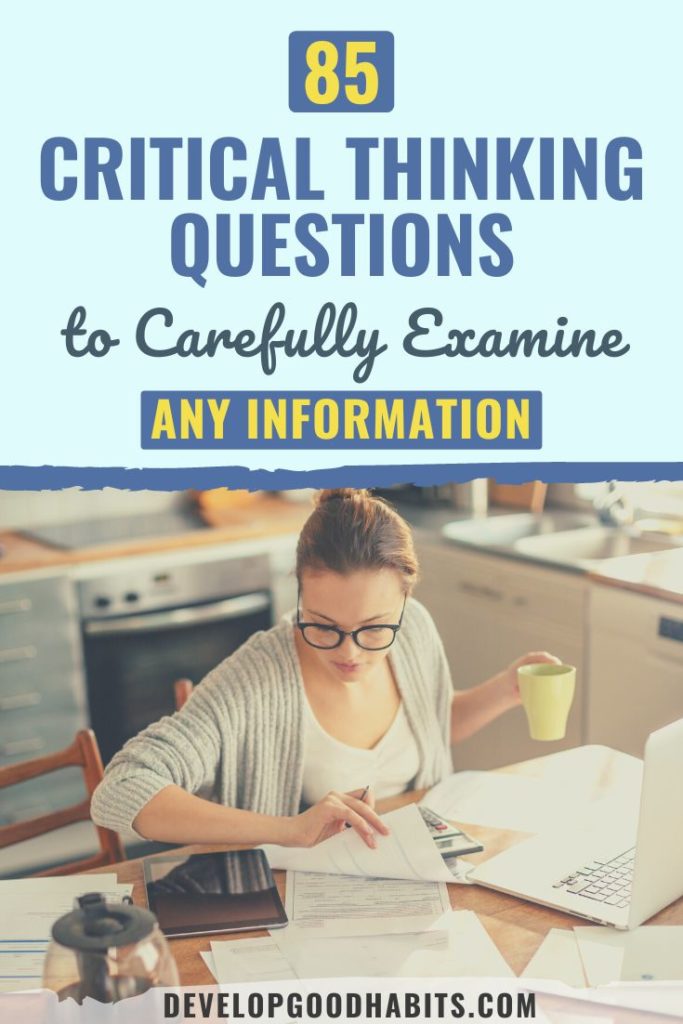
283 Philosophical Questions to Spark Deep Critical Thinking
Philosophy has implications for daily life. Pick a handful of these 255 questions as a starting point for thinking critically.
Subscribe to our weekly newsletter
It can be easy to get so caught up in daily life that we forget to stop and think about our world. Thinking about philosophical questions can help you think critically.
Building a practice of thinking critically of the world will empower you to make decisions that you feel confident in—whether it’s how you vote, spend your time, or use your resources.
If you’re looking for where to start, check out this list of philosophical questions!
What is a Philosophical Question?
A philosophical question often doesn’t have a clear, straightforward answer. They are questions that usually require deep thought and sometimes don’t have answers.
Philosophical questions typically involve human nature, the origins of the universe, morality, ethics, and the afterlife.
Philosophical Questions About Behavior
Humans are complex beings, and our world is also complicated. This can make it hard to parse the good from the bad and right from wrong. Take a moment to consider some of these philosophical questions about behavior and human nature.
- What is the difference between good and bad people?
- Is it essential to be a “good person”?
- What makes people feel more attached to some people than others?
- Is tribalism, or looking out for others like you, innately good, bad, or neutral?
- If one existed apart from other humans, would they still value goodness?
- Are there moral commonalities amongst diverse people groups and cultures?
- Are individuals important, and if so, in what ways?
- Are humans more important than other animals? Why or why not?
- Are some people more important than others?
- Is the death penalty right or wrong?
- What should be the repercussions for wronging someone else?
- What is wisdom?
- Is wisdom a helpful tool?
- Why is wisdom often associated with age?
- If a person has an accident and is no longer able to contribute to society, has their value as a person decreased, increased, or stayed the same?
- Can people change?
- How does one become a “good person”?
- If someone’s personality changes, does that mean they have also changed?
- Can you ever honestly know another person?
- If someone’s intentions were good but the outcome of an action is terrible, at that moment, is the person good or bad?
- If someone does a kind deed but has a selfish motive, does that impact the goodness of the deed?
- When babies are born, are they good?
- If identical twins grew up never knowing each other, how similar and different would they be?
- Is there ever a justifiable reason to kill someone?
- Are people born with a specific personality, or is the character the result of their circumstances?
- Is lying ever a good thing?
- If you steal money but use it to save someone’s life, does that justify the theft?
- Should someone being ignorant be a valid excuse for their rudeness?
- Can we choose our emotions, or do they happen to us?
Watch our video below to learn how to start a conversation with anyone using these killer conversation starters:
Philosophy Questions About Love
“Love is a biological necessity. We cannot live without it” —Stephanie Cacioppo, neuroscientist specializing in love and loneliness
As people, we need to love and be loved. You can express love in many different ways. Use these questions to spark some critical thought on the topic of love, or check out these truth or dare questions while you’re at it.
- What is love?
- How do you know you are loved?
- How do you know that you love someone?
- Is the desire to be loved an innate human desire?
- Why do people desire love?
- Does love necessitate action, or can it exist simply as a feeling?
- In what ways are love, lust, and sexual desire different from one another?
- Is an understanding of pain necessary to appreciate love?
- Does the loss of love change one’s outlook on life?
- Can one show love without first being loved? Is love an intrinsic aspect of human nature or a reciprocated act?
- Are there different forms of love such as parental, friendship, or romantic? Or are they all diverse expressions of the same substance?
- Can romantic love for one person last forever?
- Can love ever be a bad thing?
- How does unreciprocated love affect people?
- What does falling in love mean?
- What causes someone to fall in love?
- Does love feel different to different people?
- Is love, health, or money more important?
- Can you choose to feel love for someone?
- Does being loved by more people correlate to a person’s value?
- Is there a difference in depth of love versus quantity of love?
- To love someone well, do you need to show their love how they want to be loved, or can you love them the way you naturally show love?
Pro Tip: If you’re interested in learning more about different ways to show love, read up on the five love languages .
- Is there “The one?”
- What does it mean to love yourself?
- Do you need to love yourself before you can love others?
- Is loving yourself selfish?
- Is it essential to have a friendship with your partner?
- If your partner grew up in an abusive household, are you more understanding of unhealthy behavior?
- Would you rather be respected or loved?
Fun Philosophical Questions
Philosophy can be fun! If you think philosophy is all heavily intellectual, overwhelming, abstract, or existential-crisis-inducing, take a moment to ponder if a hot dog is a taco.
- Are you currently dreaming, and how do you know?
- Do memories exist even if you forget them?
- Does grass feel pain when you step on it?
- Can trees feel pain?
- Does 1+1 always equal 2?
- Would it be ethical, unethical, or neutral if time travel were possible?
- If time travel were possible, would it be wrong to change history?
- What is the purpose of humor?
- Why are jokes funny?
- If one person doesn’t find a joke funny, does it mean they have a lousy sense of humor, or is the joke flawed?
- Are humans responsible in any way for caring for wild animals?
- Can inanimate objects be either bad or good?
- Does morality bind animals?
- Is water wet?
- Are hot dogs tacos?
- Is it wrong to visit a zoo, thereby financially supporting an establishment that isn’t ideal for the animals?
- Is it wrong to purchase fast fashion , rapidly produced clothing that uses manufacturing methods that negatively impact the environment and exploit workers?
- In a fictional world, could you have a five-sided square?
- How do we know what words mean?
- Why do some people feel scared while watching a horror movie even though they know it is not real?
- What would you say if you had five minutes to defend the human race in front of a group of aliens who were going to obliterate humanity?
- Are there any physiological changes you would make humans make us a better species?
- Should the legal age for alcohol consumption be different than it is?
- If your life expectancy suddenly increased to 500 years, would you live differently than you currently are? What about if your life expectancy decreased and you only had five more years to live?
- If immortality were possible, would you want to be immortal?
Questions from Philosophy About Human Rights
What are human rights? Whose job is it to ensure that all humans have rights? These types of questions can be multifaceted and hard. It can be easy to avoid them or think they’re someone else’s job.
However, your daily choices can have a ripple effect on other people’s lives. Whether with who you vote for or how you spend your money, how you live impacts others.
Take some time to consider what you believe human rights are if everyone is entitled to them, and whose job it is to ensure everyone has rights.
- What are human rights?
- Is autonomy a human right?
- Is liberty a human right?
- Is free speech a human right?
- What is the difference between a human right and a privilege?
- Is it the responsibility of privileged individuals or the government to bridge gaps between privileged and disadvantaged people?
- If people are spreading misinformation, should they still be allowed to continue?
- Should abortion be legal?
- At what point in human development, from a fetus to a baby, does one become a person and gain rights?
- Is war ever necessary or even reasonable?
- How can societies work to dismantle systemic racism, ableism, sexism, and other forms of discrimination?
- If two people’s opinions differ, how should they resolve their differences?
- Has technology made it easier or harder to advance human rights?
- Is it the responsibility of wealthy countries to support impoverished countries?
- Should women’s rights be a priority to men? Why or why not?
- What makes a person a person?
- If a person has lost consciousness and doctors know they will not regain it, but their organs are still functioning, are they still a person?
- Is the internet good, bad, or neutral?
- Is being able to financially support a family a human right, or is having a large family a privilege?
- Do more humans have fundamental rights in the modern world, or have we lost human rights as time has progressed?
- If you could ensure every person on the planet would have access to a single human right, which one would you choose? Would there be any repercussions?
- What rights should prisoners of war have?
- Do you think those serial killers have an equal value to other people, or do their actions impact their value?
- Is privacy a human right?
- Is technological advancement minimizing our privacy?
Philosophical Questions About Society and Government
When we look at the societies we live in, they often have good and bad elements. These questions can help you think critically about the structures in place in your country.
- Are there any innately evil governmental structures?
- What would a perfect society look like?
- How involved should governments be in caring for the individuals in their country?
- If you could create your society, what would look different from the one where you live now?
- What role should the government have in the lives of individuals?
- What makes a good leader?
- Can someone do a bad thing and still be a good person?
- Is prison the best way to protect society and correct individuals?
- Does the legal system function fairly?
- Is technology good?
- Can technology advance society in a way that is beneficial?
- Are taxes morally right?
- Should it be lawful for citizens to hold protests? What if a handful of the protestors make it violent?
- What makes people work together despite differences?
- Does societal advancement only happen with collaboration?
- In what ways can disagreements advance society?
- What makes a crime a crime?
- How should citizens who believe the laws in their country be unjust behave? Is it okay for them to ignore those laws and are still bound to do what the law asks of them?
- Is it morally wrong to abstain from voting?
- Is it wrong for governments not to have healthcare available to all citizens?
- Should things that are bad for people be banned by the government, or is it the individual’s responsibility to avoid harmful substances?
- Is there an age at which people should be answerable for their actions?
- Is it discriminatory not to allow certain people to run for government office?
- Is it okay to limit immigration if a country is worried it will lose its culture?
- Should the government regulate what food manufacturers can and can’t put in their food?
- Is the government responsible for ensuring people receive a livable wage?
- Should those who live an unhealthy lifestyle have decreased access to healthcare?
- What would the ideal government look like?
Philosophical Questions Related to Culture
Culture can be a complicated issue to wrap your head around. When you travel or talk to someone from a different background, you may immediately notice surface-layer cultural differences such as what food people eat and what type of clothing they wear.
However, as you get to know a culture better, you may realize there are deep-seated differences, perspectives, and traditions.
These questions will help you think about the differences between cultures and if there are any aspects of culture that are innately good or bad.
- What is culture?
- How does culture form?
- Is it important to be mindful of other cultures, and if so, why?
- Are some cultures better than others?
- Is morality developed within a culture, or is it intrinsic?
- Is there a wrong way to discipline children?
- In what way is a family-oriented culture better or worse than an individualistic culture?
- Are individualistic cultures intrinsically selfish?
- What is success?
- Does income play a part in how you define success?
- Does the culture you were raised in impact your outlook on life?
- If someone has recently relocated to a new country, should there be leniency for breaking minor laws they did not know about, or should they be prosecuted the same as their counterpart raised in that culture?
- If a group practices human sacrifice as part of their culture, does that make it okay? Would you be wrong to try to save the person they would sacrifice?
- Is attractiveness a cultural construct?
Philosophical Questions About Space and the Universe
Humans have long been in awe of space. Our recorded fascination with space reaches back to ancient philosophers.
“Astronomy compels the soul to look upward and leads us from this world to another.” —Plato
However, it has only been in the past 75 years that humanity has started studying space up-close—and there’s still so much we don’t know about the universe we live in. These questions can help you find new ways to think about the world around you and how that informs your day-to-day life.
- Where does the Earth come from?
- Did a deity or event start the universe?
- Does the universe’s origin affect how one lives, and if so, how?
- Does the vastness of space impact the way you perceive yourself?
- Do things about the universe imply it exists due to chance or design?
- Is it the duty of those currently alive to be ecologically responsible?
- Is the Earth the only planet inhabited by living beings?
- Is anything in the world eternal?
- Is time eternal?
- Did time, as we now perceive it starts at a specific moment?
- Will time continue to run after the human species no longer exists?
- If we find another inhabitable planet, would there be any moral implications if humans left the earth and moved there?
- Should space travel be accessible to all people?
- Is it good, bad, or neutral that humans have invested so many resources into space exploration?
- Is there a difference between faith and superstition?
- If a deity exists, would it exist within our understanding of morality?
Philosophical Questions to Ask Kids
Philosophical questions can be challenging for children. Philosophy is often large and abstract. Because they’ve been alive for less time, children typically have fewer life experiences than adults to draw on when answering philosophical questions.
However, some of these questions are ones that small children are already wondering about. You may have heard them ask what happened to their goldfish after it died or struggle with differentiating emotions like happiness and sadness.
Introducing a few of these conversations may help the children in your life realize these are conversations you are ready and willing to have any time they have questions.
- What does it mean to feel happy?
- Why are some things right and some things wrong?
- Is it necessary to be nice to people, and why?
- What is kindness?
- Is being kind and being nice the same thing?
- What is the difference between good and evil?
- What happens to pets when they die?
- What are things that you know to be certain?
- What is something that you believe and why?
- If superheroes were real, would they be more responsible for protecting people than you are or equally accountable?
- Does helping people make you feel good? Why or why not?
- What is the difference between adults and children?
- What, if anything, makes a person different from an animal?
- Is social media good, bad, or neutral?
- How do you know that you belong?
Challenging Ethical Questions to Consider
The philosophical subtopic of ethics involves weighing between challenging scenarios and deciding which option is morally right. The challenges raised within ethics can often be incredibly challenging to sort out, and they are ones you may run into in life.
Remember, even if someone sees a topic differently than you do, it’s essential to be respectful and have conversations without getting vertigo from the “dizzying heights of your moral ground.”
- Is it wrong to kill one person if it might save the lives of hundreds of others?
- Is using euthanasia to intentionally end a life to prevent further pain and suffering immoral?
- Should people be allowed to commit medically induced suicide?
- Was former President Harry Truman’s decision to drop the atomic bombs unethical? Some argue that it saved many lives by ending the war quicker. Does that change the ethics of killing civilians during a time of war?
- Is bribery ever acceptable or ethical?
- If your friend’s significant other drinks too much alcohol and flirts with you, should you tell your friend about it and probably hurt them with the knowledge, or wait and see if it was a one-time thing that won’t ever happen again?
- Is eating animals unethical or not?
- Is it ethical to test products on animals?
- If someone passed away in a car accident and their lungs could save someone’s life who would otherwise die before another donor became available, would it be wrong to use the lungs as a transplant if the person who passed was not a registered organ donor?
- Is it okay to harm one person if it means protecting others?
- Is being a billionaire in a world where people are starving unethical or do you feel that it is alright if they worked hard and earned their wealth?
- Is war ever ethical?
Questions About Religion and Morality
These are profound questions that have to do with one’s worldview. Many of these topics, such as life after death, cannot know with certainty, but they are worth thinking about anyway.
- Is it possible to not believe anything, or does everyone have beliefs?
- What happens after death?
- Is there a god?
- Is there an afterlife?
- Do people have free will?
- Is your soul reborn after you die?
- Does your worldview impact the way you make day-to-day decisions?
- Where do people come from?
- Is there an age at which people are morally responsible for their decisions?
- Is there such a thing as fate?
- Is luck a real thing?
- Does chance exist?
- Does life have meaning? If so, what is the meaning of life?
- Does having a religious experience prove the existence of a god?
- Is there absolute truth?
- Who determines right from wrong?
- Is the world progressively becoming worse?
- Why does evil exist?
Abstract Philosophical Questions
Topics like pain, suffering, beauty, and joy are a part of daily life, but how often do you stop to think about them?
Use these questions to help you do just that!
- What is beauty?
- Are pain and beauty interconnected?
- Is it a shared element between a beautiful person, experience, or memory?
- Why do people value happiness, beauty, or joy?
- If your life were to end tomorrow, would you be happy with how you had spent your time?
- What would you want it to say if someone were to write a book about you?
- What gives your life meaning and purpose?
- Can pain be a good thing?
- Does learning a valuable lesson through suffering make it worth it?
- Is it essential to care for yourself, or is it more important to care for others?
- What is “failure?”
- Does failing at something mean you’re bad at it?
- Would getting rid of negative traits like aggression in all humans have any negative consequences?
- Would removing loss, sorrow, and pain impact one’s ability to enjoy life and love?
- What is the difference between happiness and joy?
- What makes you happy?
- Can you choose to feel joy?
- What is friendship?
- Why do friendships sometimes end?
Philosophical Questions About Art, Music, and Literature
Art, music, and literature are essential ways that people express themselves and preserve culture.
“Art is the window to man’s soul. Without it, he would never be able to see beyond his immediate world; nor could the world see the man within.” —Lady Bird Johnson
Here are some questions to help you think critically about what art is and how it impacts you.
- What makes something “art?”
- Is some art better than other art?
- Does art need to make a statement or have a deeper meaning?
- Is music art?
- Should artists be held responsible for the message of their art?
- Are artists morally obligated to give trigger warnings if their art could mentally or physically negatively impact someone?
- Should there be age restrictions on specific pieces of art?
- Should public nudity be acceptable when being presented as performance art?
- Should everyone be able to interpret a piece of art as they see it, or is there a “correct” interpretation of an art piece?
- Is it morally wrong for museums to display art that depicts slavery? Why or why not?
- Should art taken as spoils of war be returned to the country it originated in?
- Is it wrong for educators to assign reading that demonstrates racism?
- Is it necessary to preserve history?
- Is it morally acceptable to enjoy art made by someone who did horrible things?
- Why do people enjoy looking at art?
- Why does music connect people?
- Should music be beautiful?
- Is it essential for art to “make a statement?”
- Would it be music if you and your friends were to hit pots and pans randomly?
- If it comes together when you’re hitting pots and pans and sounds nice, would it be music?
- If there is a room full of people talking, could that be categorized as music?
- What is the difference between “good” taste in art or music and “bad” taste?
- Can cooking be a form of art?
- What is the critical difference between a functional and artistically designed room?
- Is it possible that what one person sees as “yellow” is what someone else sees as “green,” but they’ve both learned to call it “yellow,” so they will never know?
Society, Government, and Philosophical Dilemmas
- Are there any innately evil governmental structures?
- What would a perfect society look like?
- How involved should governments be in caring for the individuals in their country?
- If you could create your society, what would look different from the one where you live now?
- What role should the government have in the lives of individuals?
- What makes a good leader?
- Can someone do a bad thing and still be a good person?
- Is prison the best way to protect society and correct individuals?
- Does the legal system function fairly?
- Is technology good?
- Can technology advance society in a way that is beneficial?
- Are taxes morally right?
- Should it be lawful for citizens to hold protests? What if a handful of the protestors make it violent?
- What makes people work together despite differences?
- Does societal advancement only happen with collaboration?
- In what ways can disagreements advance society?
- What makes a crime a crime?
- How should citizens who believe the laws in their country be unjust behave? Is it okay for them to ignore those laws and are still bound to do what the law asks of them?
- Is it morally wrong to abstain from voting?
- Is it wrong for governments not to have healthcare available to all citizens?
- Should things that are bad for people be banned by the government, or is it the individual’s responsibility to avoid harmful substances?
- Is there an age at which people should be answerable for their actions?
- Is it okay to limit immigration if a country is worried it will lose its culture?
- Should the government regulate what food manufacturers can and can’t put in their food?
- Is the government responsible for ensuring people receive a livable wage?
- Should those who live an unhealthy lifestyle have decreased access to healthcare?
- What would the ideal government look like?
Final Thoughts: Talk Philosophy with Other People
When it comes to challenging topics like those raised by philosophy, it can be helpful to talk through them with others. Others can help raise perspectives that you may not have considered yourself.
Philosophical questions can also make for interesting conversations with people you already know relatively well. Just remember to be respectful of people who have different viewpoints!
Here are some ways you can use these questions:
- Over dinner with a few friends . How would your friends react if you asked about beauty’s nature or the purpose of life? It might be unexpected, but give it a try the next time you see them! Philosophy might not be the best topic if you’re with a big crowd of friends, but it can make for an exciting conversation with a group of four or five.
- With your significant other . How you perceive the world informs how you spend your money, what you believe about raising a family, and how you use your free time. It can be stressful, but deal-breaker conversations are essential if you want a relationship to become serious.
- With a son, daughter, niece, nephew, or another child in your life . Children have big questions about the world but may not know how to find the words for those questions. Try asking the children in your life an occasional philosophical question to help them begin to strengthen their critical thinking muscles.
If you’re hosting a dinner party and want to talk about something a little less serious, consider using one of these 257 questions .
Popular Guides
How to deal with difficult people at work.
Do you have a difficult boss? Colleague? Client? Learn how to transform your difficult relationship. I’ll show you my science-based approach to building a strong, productive relationship with even the most difficult people.
Related Articles
Science of People offers over 1000+ articles on people skills and nonverbal behavior.
Get our latest insights and advice delivered to your inbox.
It’s a privilege to be in your inbox. We promise only to send the good stuff.

Critical thinking
200+ critical thinking questions.
“Judge a man by his questions rather than his answers.” – Voltaire As critical thinkers, it’s our job to question everything, instead of just blindly believing what we’re told, but what kinds of questions should we be asking though? What are the “right” questions to ask? In this article I’ve compiled a list of 200+ […]
“Judge a man by his questions rather than his answers.” – Voltaire
As critical thinkers, it’s our job to question everything, instead of just blindly believing what we’re told, but what kinds of questions should we be asking though?
What are the “right” questions to ask?
In this article I’ve compiled a list of 200+ of the very best critical thinking questions for almost any situation.
Critical thinking questions:
- If you’re presented with a claim
If you’re reading a book, listening to a podcast, watching TV or YouTube
If you’re watching an interview.
- In a group or panel discussion
- In an argument or debate
If you’re watching the news
- If you want to spot a lie
If you want to spot a scam
- If you’re presented with statistics
- Critical thinking about your life
Let’s begin:
- Is this an argument, a claim, a belief, an opinion, or a fact?
When you’re presented with information, whether it’s something you’re reading, watching or listening to, ask yourself:
- How do you know it’s a fact?
- What evidence exists to support this “fact”?
- Has this “fact” been proven?
- Do the majority of experts on the subject agree that this is a fact? Is there an expert consensus on this fact? If not, why not?
- Is this an ordinary or extraordinary claim?
- Do the majority of experts agree with this claim? Or is it contentious?
- What is the source of this claim?
- Who is making this claim?
- Is this person an authority or expert?
- How reliable is this source?
- What are the best arguments in support of this claim?
- What do the harshest critics against this position say?
- What arguments do skeptics of this position give?
- Has this claim already been debunked?
- Is this evidence good enough to accept the arguers assertions?
- Would this evidence stand up in court?
- Or is the arguer/author/speaker making assertions without evidence?
- What is the strongest evidence against this claim?
- Is there more confirming or disconfirming evidence?
- Is the expert consensus (if there is one) for or against this claim? Why?
- Do the majority of experts agree or disagree with this claim? Why?
- How can we verify or falsify this claim?
- A statement may be true, but is it relevant? Why?
- To what degree? To what extent?
- Under what conditions?
- In what context or circumstances?
- This claim is 100% true
- This claim is 100% false
- This claim is mostly true, partly false
- This claim is mostly false, partly true
- This claim is half true, half false
- Remember: There are degrees of “rightness” and “wrongness”. Statements are rarely 100% true or 100% false
- What further claims does this claim logically entail?
- Which of my beliefs would I have to change if I were to accept this claim?
- If this is an argument, is it deductive or inductive?
- If an argument is deductive, is it sound, valid, invalid, or unsound?
- If an argument is inductive, is it cogent, strong, weak, or unsound?
- How do you know this?
- How did you determine this?
- What evidence or proof do you have for this claim?
- What is their background?
- What makes them qualified to speak on this subject?
- Are they an expert in the field?
- On what basis is the author or speaker an authority or expert on the subject, or at least credible?
- Are they conservative or liberal?
- Atheist or religious?
- Feminist or MGTOW?
- (No author/speaker is completely neutral, unbiased and objective)
- When was the article, book, podcast, video etc., written or recorded? Is it possibly outdated? Is there a more recent up-to-date version available?
- Why did the author write this article/book?
- Why is the speaker giving this talk? What is their motivation?
- What is the purpose of this information? Why was it created?
- Why did I choose to read/watch/listen to it?
- Who benefits from this information? Why? How?
- Is this information relevant to you? If so, how? Why do you need to know this? How does it affect you personally?
- What are the authors/speakers main arguments and assertions? What is their philosophy? What are their main points?
- Is the author/speaker arguing for anything controversial? If so, there are likely to be good counterarguments on the other side
- Anonymous authorities aka “weasel words” e.g. “experts say…” “scientists say…” “studies show…”
- Deductive or inductive reasoning
- Expert opinion
- Expert consensus
- Randomized controlled trials
- Scientific studies
- Scientific consensus
- Or are they making assertions without evidence?
- What is the strongest evidence in support of these assertions? Is this evidence good enough to accept the authors/speakers conclusions? Would it stand up in court?
- What is the strongest evidence against these assertions?
- What might be another equally valid interpretation of the evidence or study results?
- What conclusions does the author/speaker want you to draw? What do they want you to think/believe/understand/do?
- Is the author/speaker/news station trying to push a narrative? e.g. “Diversity”, “Gender pay gap”, “Immigration”?
- Do you agree with the authors/speakers assertions? Why/why not? Anything you disagree with?
- Do you agree with the authors/speakers philosophy? Why/why not? Anything you disagree with?
- Do you agree with the authors/speakers “facts” and description of “reality”? Why/why not? Anything you disagree with?
- Do you agree with the authors/speakers arguments and rationale? Why/why not? Anything you disagree with?
- Are there any fallacies in the authors/speakers argument or rationale? If so, what?
- Does the author/speaker address counterarguments, disconfirming evidence, objections etc.? If so, how effectively do they rebut these points?
- If the author/speaker provides a “rule”, are there any exceptions to the rule that are not explained or accounted for?
- Do you agree with the authors/speakers conclusions? Why/why not? (You might agree with their arguments and rationale but not with their conclusions) Are they backed up by sufficient evidence? Or is the author/speaker jumping to conclusions too quickly from insufficient evidence?
- Are there any other equally valid conclusions or interpretations that could have been drawn from the evidence, or any other competing theories with better explanations for the evidence? If so, what?
- What is the perspective of the author/speaker? Do they seem like an insider or outsider? Why?
- Whose perspective is this information presented from? America’s or someone else’s? Conservative or liberal? Men or Women? Gen X, Y or Z?
- What perspectives/viewpoints are not represented here? What other perspectives might be equally valid, or worth looking into?
- What would (person) say about it?
- What would (group) say about it?
- Is there better evidence for one perspective/viewpoint than another?
- Is the author/speaker presenting you with both sides of the story – or only one?
- How has the author/speaker framed the information or story?
- Is the author/speaker embellishing or sensationalizing the story for dramatic effect? Do you think the story really took place the way the author/speaker tells it?
- What assumptions is the author/speaker making? What does the author/speaker have to believe is true before the rest of their argument makes sense?
- What are the implications of the authors/speakers argument? If this is true, what else must be true?
- What are the main problems the author/speaker is trying to solve? What solutions do they propose?
- Do you agree with the authors/speakers proposed solutions? Can you think of even better solutions to these problems?
- Has the author/speaker identified the real problem/s, or only a symptom of the problem?
- Is the author/speakers analysis or solution to the problem or situation oversimplified or incomplete? What needs to be unpacked or expanded upon?
- Is the author/speaker engaged in oversimplified black and white thinking as if something “always” or “never” happens, or as if “everyone” or “no one” should think/believe/do something, or as if something was right/wrong, true/false, correct/incorrect, without any grey areas in between?
- Are you engaged in black and white thinking, as if “everything” or “nothing” the author/speaker says is true? Or are you judging the validity of the information line by line, sentence by sentence, claim by claim, realizing that some parts could be true, and other parts false?
- Is the author/speaker emotional reasoning? Is it facts over feelings, or feels over reals?
- How would you describe the author/speakers tone? Dogmatic? Overconfident? Emotive? Pay attention not only to what is said, but how it’s said. How does the tone affect your response to the speech/text?
- Is the author/speaker using emotive language/tonality, and/or dramatic images or video, in an attempt to alarm, scare or outrage you?
- Is the author/speaker guilty of magical or superstitious thinking? Is there a lot of talk of “the law of attraction”, “miracles”, “soul mates” etc.?
- Does the author/speaker treat their opponents charitably and fairly? Do they treat the other side as intelligent people with a difference of opinion/perspective? Or do they demonize them as “crazy”, “dangerous”, “evil”, “dumb”, “stupid”, “racist”, “sexist”, “homophobic”, “transphobic” etc.?
- Does the author/speaker seem intellectually honest? Trustworthy? Why/why not?
- Is the author/speaker trying to be objective in their analysis and critique? Perfect objectivity isn’t possible, but are they even trying to be impartial, unbiased and objective?
- Yes: Be careful you’re not automatically believing everything they have to say without evidence, and letting them do your thinking for you
- No: Be careful you’re not automatically dismissing everything they have to say because you don’t like them (Remember: Examine the statement – not the speaker)
- Yes: Beware because you’re more likely to believe it whether it’s true or not
- No: Beware because you’re more likely to dismiss it whether it’s true or not
- The truth, the whole truth, and nothing but the truth
- Half-truths and holding something back
- Straight up lying
- Is the author/speaker misquoting people, or taking quotes out of context?
- Did the person really say …? Is this a real quote/tweet? Or has the person been misquoted or quoted out of context? Is this a fake tweet?
- How are you going to use this information? What are you going to do with it? How are you going to put it into practice? How will it make a difference to your life?
- What is the purpose of this interview? Is it to educate or entertain the audience? Is it to promote a product or service?
- Who is the interviewee? Why is this person being interviewed?
- When did this interview take place? Is this information possibly outdated and no longer relevant?
- Is the interviewer asking the interviewee mostly softball or hardball questions?
- Is the interviewer asking the interviewee a lot of leading, loaded or gotcha questions? Do they seem to be trying to lead or trap the interviewee? e.g. “Yeah, but isn’t it true that…”, “Yeah, but don’t you think…”, “Yeah, but what about…”
- Is the interviewer really listening to the interviewee? Are they making a real effort to try to understand the interviewee and their position, or are they simply trying to promote or condemn it?
- Is the interviewer deliberately trying to make the interviewee look bad? e.g. Are they being overly disagreeable or standoffish? Do they only ask hardball or gotcha questions and then interrupt the interviewee mid-sentence with another difficult question every time the interviewee starts to give a good answer?
- Does the interviewer interrupt or cut off the interviewee if they start talking about anything controversial, or if they start talking about anything that doesn’t align with the narrative of the network e.g. anti-abortion, pro-gun or pro-Trump comments?
- Has the interview been edited to make the interviewee look bad, to paint them in a negative light?
- What additional questions would you ask the interviewee that the interviewer didn’t ask?
If you’re watching a group or panel discussion
If you’re watching a group discussion or debate, especially on a contentious topic e.g. abortion or gun control:
- Who are the panel members? What makes these people authorities or experts on the subject?
- Are both sides of the debate equally represented with intelligent people? Or is one side represented by heavyweights and the other side lightweights?
- Is there an equal distribution of liberal and conservative pundits? Or is it a majority liberal panel with a token conservative? (or vice versa)
- Does the host seem biased towards one side over the other? Is the host picking sides and showing their approval/disapproval of one side?
- Is the audience showing an obvious bias to one side of the debate? Are they only applauding/booing one side of the debate?
- Is the host giving more airtime, credibility and/or respect to one side?
- Is the host trying to make one side look bad, ignorant or stupid?
In an argument or a debate
If you’re in an argument or a debate, or watching one:
- Is this an argument or an assertion? If it’s an argument, is it deductive, inductive or abductive? Is it sound or cogent? Valid or invalid? Strong or weak?
- Are all of the premises true and correct? Do all of the premises necessarily lead to the conclusion? Are there any unjustified leaps of logic?
- Am I clear on how each word is being defined in the argument?
- Is someone attempting to redefine words e.g. “rational”, “reasonable”, “racist” etc., to support their preferred conclusion?
- Is someone trying to shift the burden of proof? Note: The burden of proof is the obligation to provide evidence to support one’s assertion e.g. “You are guilty” and it is always on the one making the claim – not the other way around
- Has this argument already been debunked?
- Is someone making a PRATT? (Point refuted a thousand times)
- Is this a strawman or steelman argument?
- Is this the best argument in support of …?
- What are the best arguments in support of …?
- What are the best arguments against …?
- What is the strongest evidence in support of …?
- What is the strongest evidence against …?
- Is the preponderance of evidence for or against …? Is there more confirming or disconfirming evidence?
- Is the expert consensus (if there is one) for or against …? Why?
- Do the majority of experts agree or disagree with …? Why?
- Are there any fallacies in this argument or rationale? If so, what? (Fallacies don’t necessarily make an argument invalid but it’s still good to be aware of them)
- Am I 100% certain I understand my opponent’s position? Am I sure? Could I argue my opponent’s position convincingly? Could I steelman it? Could I pass the Ideological Turing Test? If not, you don’t understand it. Don’t argue for or against a position until you fully understand it
- What are the strongest points of my opponent’s argument?
- What are the weakest points of my opponent’s argument?
- What are the weakest points of my argument?
- What is the strongest evidence against my position?
- What are the best arguments against my position?
- How would I attack my argument if I had to?
- What do I like about my opponent’s position, and what do I dislike about mine?
- What aspects of my argument are likely to be unconvincing to those that don’t already agree with me?
- Does my opponent seem intellectually honest? Are they arguing in good faith? Are they willing to follow the evidence where it leads? Are they willing to admit when they’re mistaken or wrong? Am I?
- Does my opponent seem more interested in “winning” the argument or discovering the truth?
Ask the other person:
- How did you determine that?
- How did you come to that conclusion?
- What do you know that I don’t?
- Where am I wrong in my argument or rationale?
- What evidence would it take to change your mind, to convince you otherwise?
- Are these your real reasons for believing X? If all of these reasons were proven wrong, would you still continue to believe X? If yes, let’s not even worry about these reasons because they’re not the real reasons you believe X. What are the real reasons you believe X?
- Why do you think other smart people aren’t convinced by the same arguments and evidence that you are?
- Associated Press News
- The Bureau of Investigative Journalism
- The Economist
- Pro Publica
- What is the bias of this news station? Are they liberal or conservative? You can check the bias of a particular news station here: Media Bias Fact Check
- Fear mongering
- Gossip/rumors
- Hatchet jobs
- Outrage porn
- Puff pieces
- Is this really the most important “news” of the day? Why is this story being prioritized over everything else that happened today?
- Why do I need to know this? How does it affect me?
- What is the purpose of this news story? Why was it created? What does the news station want you to think/believe/do?
- When was this news story published? Is this information current, or is it outdated and/or no longer relevant?
- Has this story already been debunked?
- Truth or Fiction
- The Washington Post Fact Checker
- Hoax Slayer
Check these websites to see if a claim or story has already been debunked, but don’t rely on any of these websites to do your thinking for you, because they may mislead you with their own political biases
- Has this story or headline been written to educate, entertain or infuriate you?
- Is the headline an accurate summary of the information – or is it just clickbait?
- Do the photos fit the story?
- Has an unflattering photo been deliberately chosen to paint the subject e.g. Trump in a bad light?
- Is it likely that this story has been embellished or sensationalized?
- How has this information been framed or spun?
- Are you being presented with both sides of the story – or only one?
- Whose perspective is this presented from? Conservative or liberal? America’s or someone else’s? Men or Women? What other perspectives might be equally valid, or worth looking into?
- What do the other news stations say? e.g. if you watch CNN or MSNBC, what does CBS or FOX say? (and vice versa)
- Are you being presented with facts or opinions? If “facts”, on what basis are they “facts”? What evidence exists to support these “facts”?
- Do the media’s “facts” and description of “reality” seem accurate? Why/why not? Anything you disagree with?
- Did someone really say that? Or have they been misquoted or quoted out of context?
- Does the domain look credible?
- Is this satire?
How to spot a liar
- Does it seem like this person is lying or telling the truth? Why? Are they a known liar?
- Is this person motivated to deceive me? Do they stand to gain something by lying to me? What might this person gain by lying to me?
- Dodge the question
- Ignore the question
- Attack you for asking the question, “How could you ask me a question like that!”
- Refuse to answer the question
- Answer a different question
- Turn the question back on you, “I could ask you the same thing!”
- Give short one word answers
- Give vague or ambiguous answers
- Talk around in circles without answering the question
- If you ask the person the same question multiple times using different words, do they give different answers and contradict themselves? Do the details in their story keep changing?
- Uncomfortable
- Does the person speak slower or faster or louder than normal when answering your questions?
- Does the person hesitate, take long pauses, or talk slower than normal when answering your questions? (maybe in an attempt to think on the spot and buy time?)
- Do they avoid eye contact and/or cover their mouth when answering questions?
- Do they start sentences and not finish them, or change topics and start talking about something else mid-sentence?
- Does the tone or volume of their voice change? Does their voice crack and/or go higher than normal? Do they cough repetitively and clear their throat, or stammer or stutter?
- Do they blink rapidly, or not at all, or have a fake or nervous smile?
- Do they roll their lips back or purse them?
- Does their body language seem uncomfortable?
- Do their emotions and facial expressions match their words? When they say they’re “good” or “okay”, do they seem good or okay?
- Does it seem like they’re in a hurry to change the subject?
- This person is telling “The truth, the whole truth, and nothing but the truth”
- This person is telling half-truths and holding something back
- This person is playing dumb and pretending to know less than they do
- This person is straight up lying
- What does your gut/intuition say? Does it seem like they’re lying or telling you the truth? (or both)
- Is a stranger emailing, texting or calling you out of the blue claiming something too good to be true? e.g. you’ve entitled to a large inheritance – and all you need to do is provide bank details, or pay taxes or transfer costs? Or that you’ve won a prize in a competition or lottery you’ve never entered?
- Is someone calling you claiming to be from your bank, gas/electricity provider, phone company etc. and asking you to verify your personal contact details, password, bank details, credit card number etc.? maybe due to “unauthorized” or “suspicious activity” on your account?
- Does a google search on the exact wording of the email, text or ad reveal a scam?
- Does the email contain any grammatical or spelling errors, or overly formal language?
- Does the email ask you to click a link or open an attachment?
- If you’re buying something online is the seller asking you to make payment with an insecure payment option? e.g. direct bank transfer, money order, or a cryptocurrency like Bitcoin?
- In an online dating scenario, is someone professing strong feelings for you after only a few encounters?
- Does the person have a sense of urgency? Are they claiming to need money urgently for a personal or family emergency, medical attention, or to come see you?
- Is someone using pressure tactics, and trying to make you feel guilty or selfish for not buying their product or service, or donating to a charity?
- Is someone trying to manipulate you with sleazy sales/self-help seminar type questions e.g. “Do you want to be rich or poor?” “A winner or a loser?” “A success or a failure?”
- Does it seem too good to be true? Does it seem like a scam? If so, it probably is
- What does your gut/intuition say?
Statistics questions
“There are three kinds of lies: lies, damned lies, and statistics.” – Benjamin Disraeli
Ask yourself the following questions whenever you’re presented with any statistic:
- Who paid for the study or survey?
- Who conducted the study or survey? Does it come from a credible source?
- Why was the study or survey done? What is the likely agenda?
- When was the study done? Is the information outdated? Is it still relevant? Times change. Public opinion changes
- Who was polled? Conservatives or liberals? Men or women? Asians, Blacks, Hispanics or Whites? What age group? Gen X, Y or Z? How diverse was the group?
- How large was the sample size? How many people were surveyed? Is the sample size large enough? Is it qualitative, quantitative, or mixed methods? Was the sample size sufficient? Was it representative enough of the wider population? Did the participants come from different cultural and social backgrounds? How generalizable are the findings?
- What are the statistics measuring?
- How long did the information take to gather? Was it a 2 week survey? A 6 month study? A 10 year study?
- What questions were asked?
- How was each question asked? Were the questions leading or loaded or worded in such a way as to encourage a certain answer?
- What is the context of the survey?
- How was the research done? Phone, email, social media, face to face?
- What is the number as a percentage? e.g. 55, 000 Americans is 0.0167% of the population
- Is the percentage statistically insignificant? e.g. 500, 000 Americans might be addicted to Heroin, but as a percentage that’s ‘only’ (any number above one is obviously too high) 0.153% of Americans
- Do the author’s conclusions and the headline logically follow from the data? Or are they reading too much into the data? Find the raw data if you can. Don’t just accept and believe headlines for statistics. Make sure it says what the headline says it says. Statistical headlines are often used to suggest things the data doesn’t actually say
- Is the research confusing causation and correlation? Check out: spurious correlations for a perfect visual example of why correlation does not equal causation
- Has this study been peer reviewed by experts?
- Beware of unsourced statistics
“I can prove anything by statistics except the truth.” – George Canning
Critical thinking about your life questions
“The unexamined life is not worth living” – Socrates
You can apply critical thinking to the books you read, the podcasts you listen to, the information and “news” presented to you, but ultimately, what better place to apply critical thinking skills than to your own life?
- Which biases and fallacies are you most guilty of?
- Where/when do you most often fail to practice critical thinking?
- What are your sacred cows? What shouldn’t be questioned? What is off limits? God? Jesus? Buddha? Krishna? Muhammad? The Bible? The Bhagavad Gita? The Quran? Your Guru?
- What do you need to start/stop doing?
- What do you need to do more/less of?
- What are your best/worst habits?
- Where do you waste the most time?
- Who/what should you cut out of your life?
- What one thing, if you were to take action on it, would produce the greatest difference in your life?
- A year from now, what will you wish you had started today?
Recommended reading
For additional critical thinking questions check out:
Critical Reading: The Ultimate Guide
The Socratic Method
50 Critical thinking tips

- Grades 6-12
- School Leaders
Win a $1,000 gift certificate of your choice! ✨
100+ Critical Thinking Questions for Students To Ask About Anything
Critical thinkers question everything.
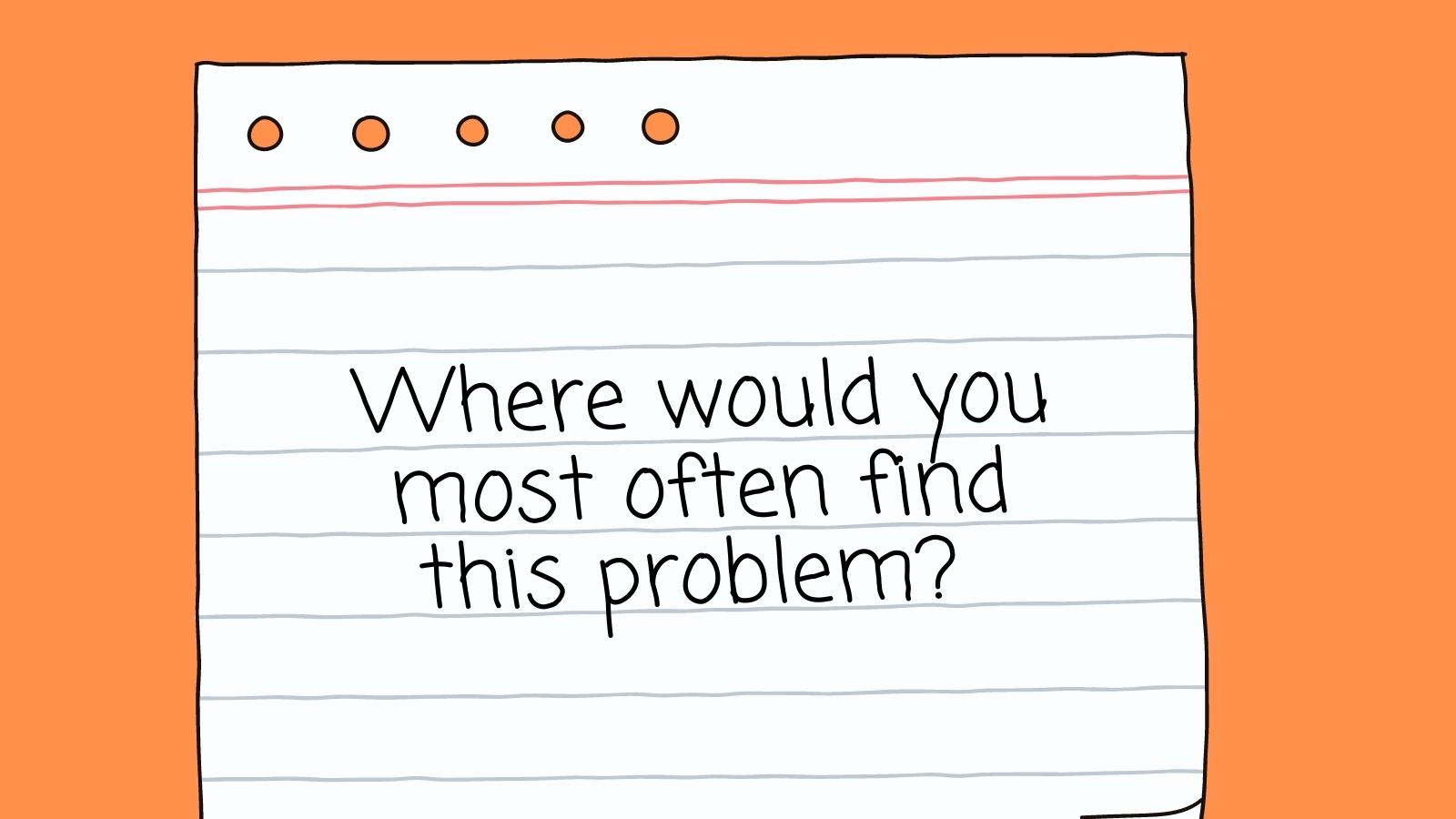
In an age of “fake news” claims and constant argument about pretty much any issue, critical thinking skills are key. Teach your students that it’s vital to ask questions about everything, but that it’s also important to ask the right sorts of questions. Students can use these critical thinking questions with fiction or nonfiction texts. They’re also useful when discussing important issues or trying to understand others’ motivations in general.
“Who” Critical Thinking Questions
Questions like these help students ponder who’s involved in a story and how the actions affect them. They’ll also consider who’s telling the tale and how reliable that narrator might be.
- Is the protagonist?
- Is the antagonist?
- Caused harm?
- Is harmed as a result?
- Was the most important character?
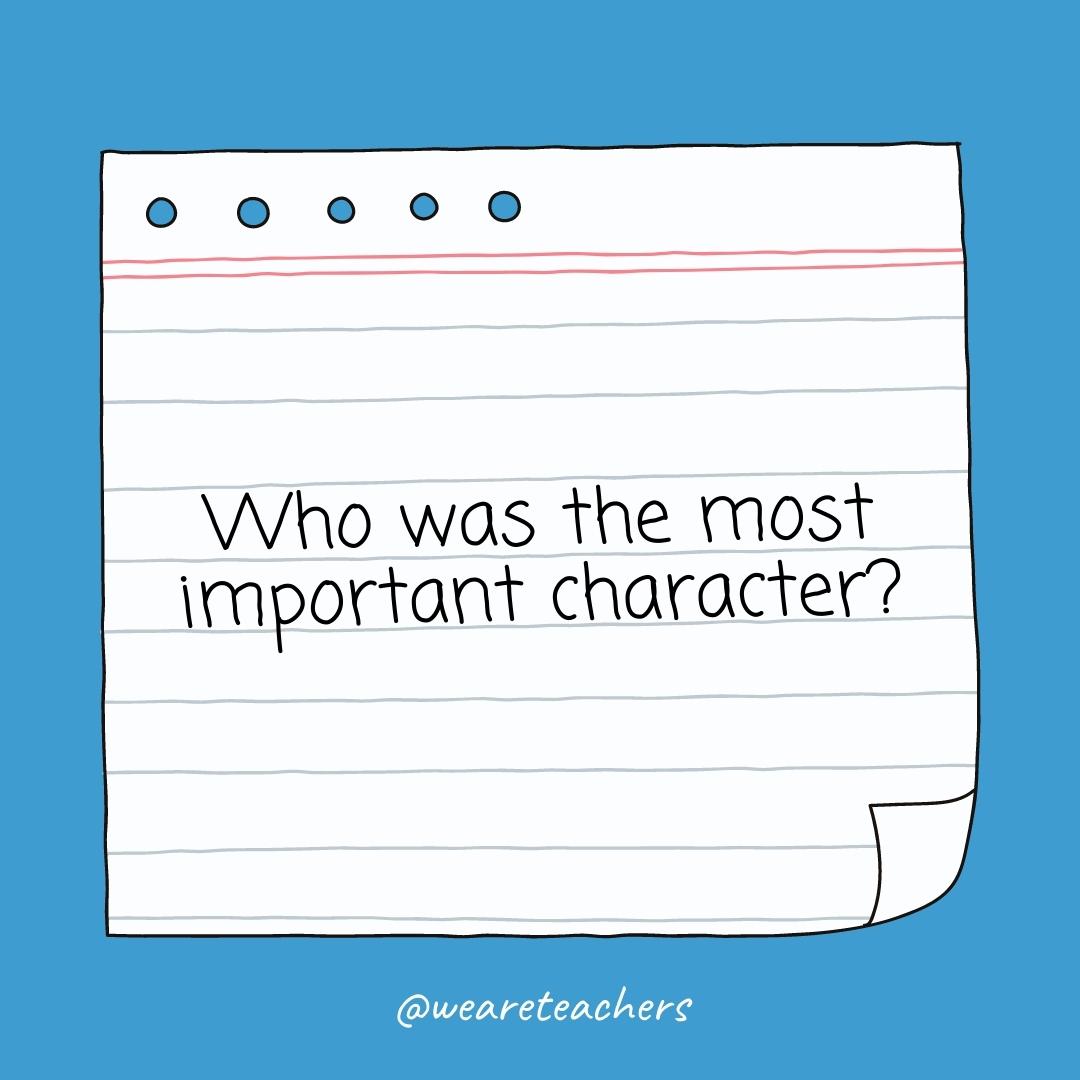
- Is responsible?
- Is most directly affected?
- Should have won?
- Will benefit?
- Would be affected by this?
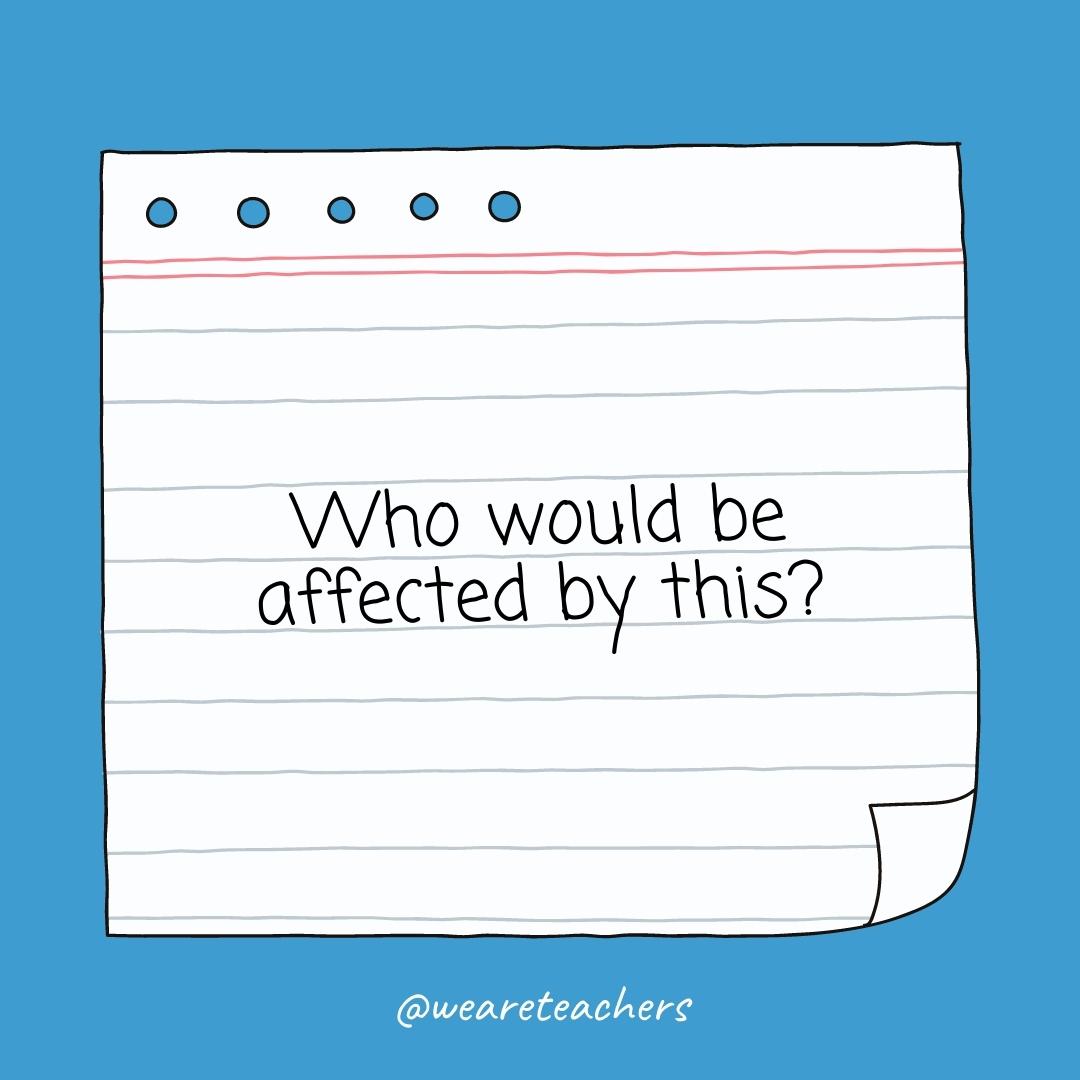
- Makes the decisions?
“What” Critical Thinking Questions
Ask questions that explore issues more deeply, including those that might not be directly answered in the text.
- Background information do I know or need to know?
- Is the main message?
- Are the defining characteristics?
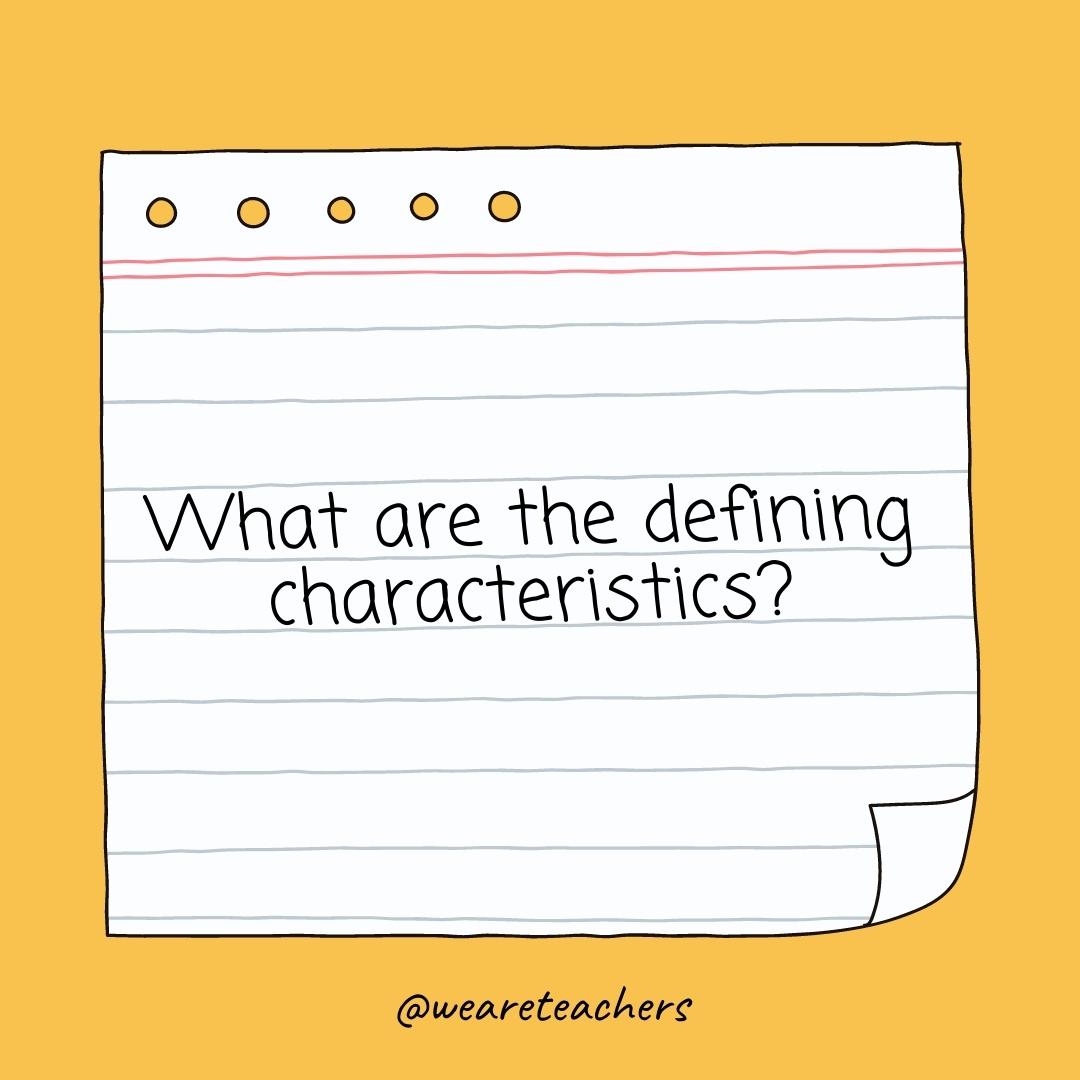
- Questions or concerns do I have?
- Don’t I understand?
- Evidence supports the author’s conclusion?
- Would it be like if … ?
- Could happen if … ?
- Other outcomes might have happened?
- Questions would you have asked?
- Would you ask the author about … ?
- Was the point of … ?
- Should have happened instead?
- Is that character’s motive?
- Else could have changed the whole story?
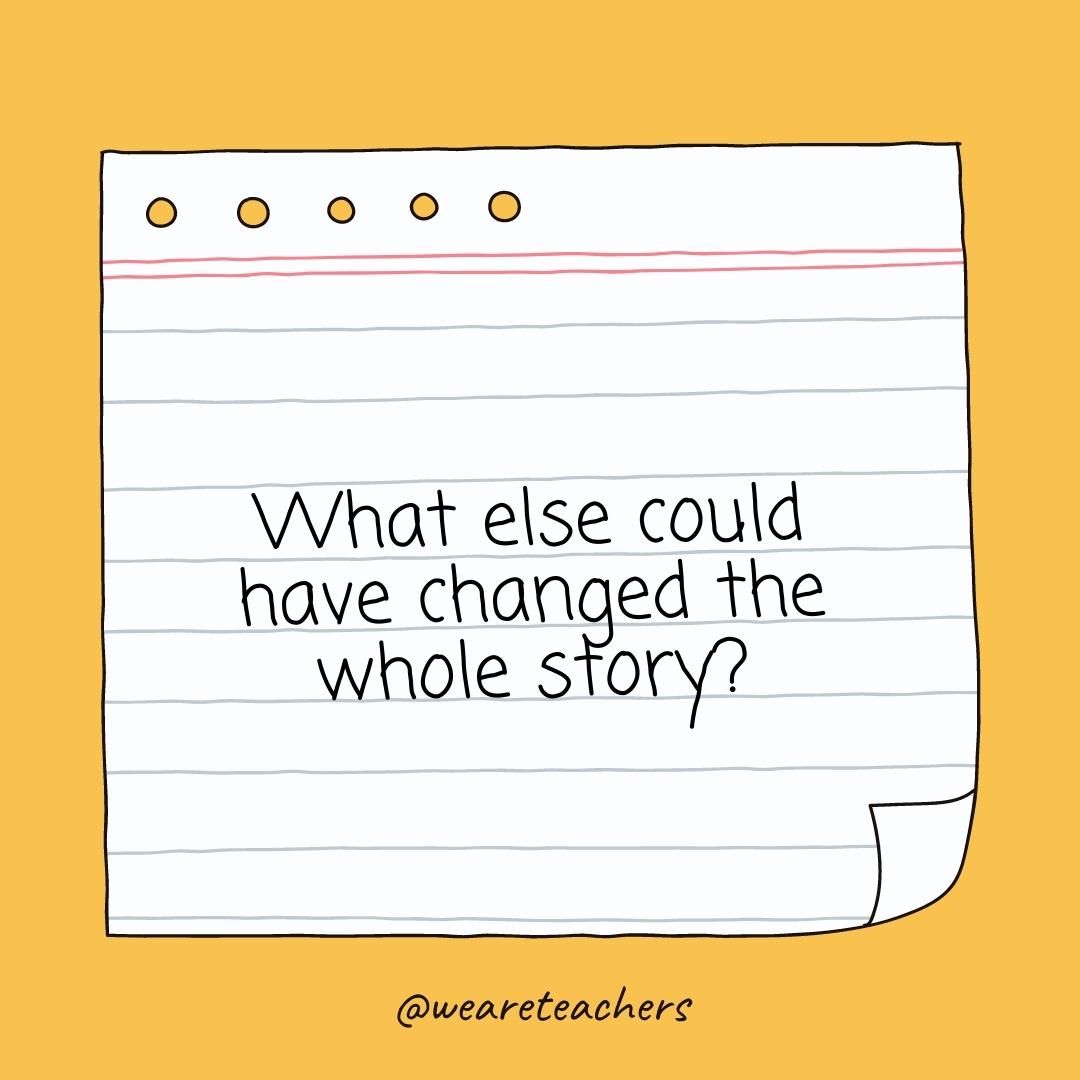
- Can you conclude?
- Would your position have been in that situation?
- Would happen if … ?
- Makes your position stronger?
- Was the turning point?
- Is the point of the question?
- Did it mean when … ?
- Is the other side of this argument?
- Was the purpose of … ?
- Does ______ mean?
- Is the problem you are trying to solve?
- Does the evidence say?
- Assumptions are you making?
- Is a better alternative?
- Are the strengths of the argument?
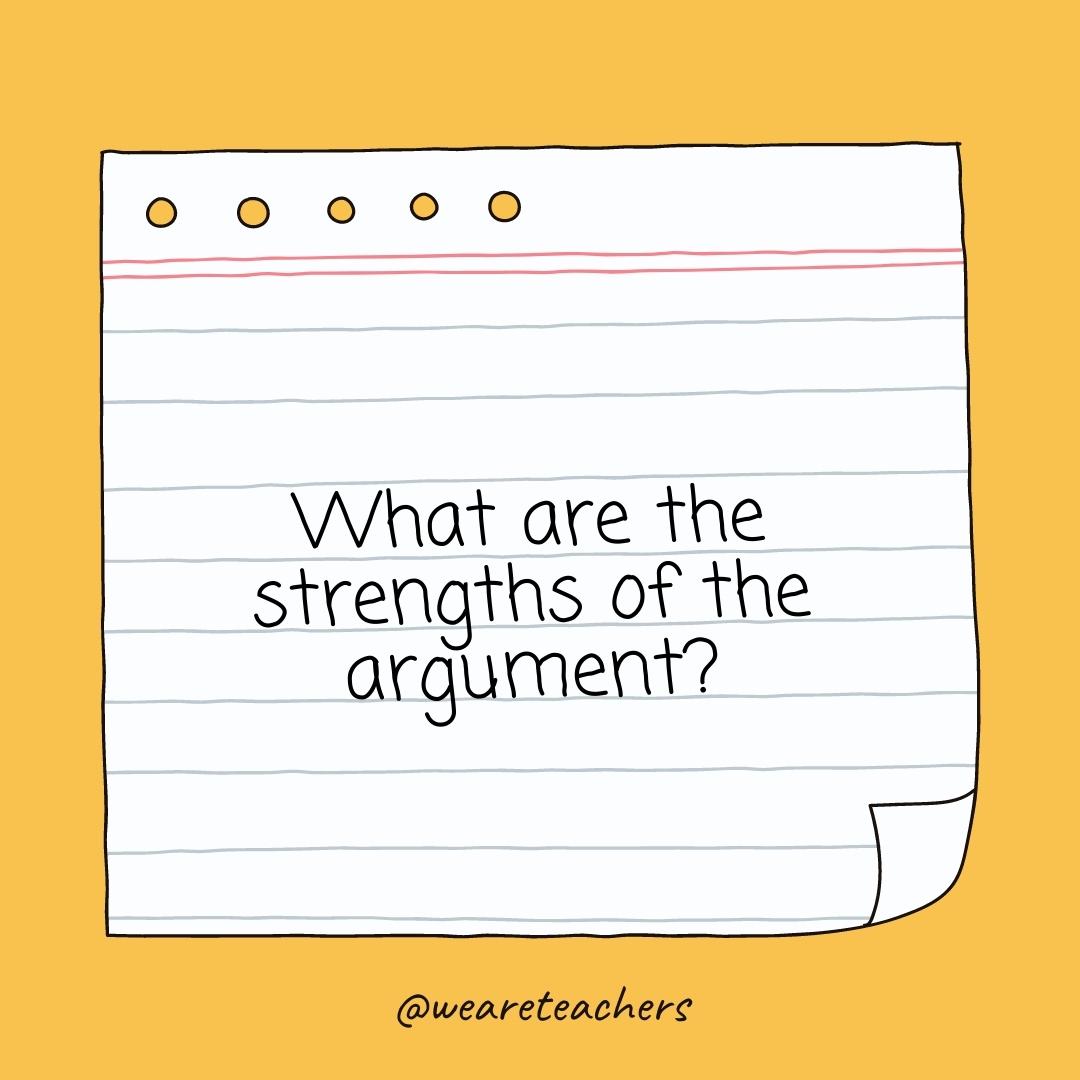
- Are the weaknesses of the argument?
- Is the difference between _______ and _______?
“Where” Critical Thinking Questions
Think about where the story is set and how it affects the actions. Plus, consider where and how you can learn more.
- Would this issue be a major problem?
- Are areas for improvement?
- Did the story change?
- Would you most often find this problem?

- Are there similar situations?
- Would you go to get answers to this problem?
- Can this be improved?
- Can you get more information?
- Will this idea take us?
“When” Critical Thinking Questions
Think about timing and the effect it has on the characters or people involved.
- Is this acceptable?
- Is this unacceptable?
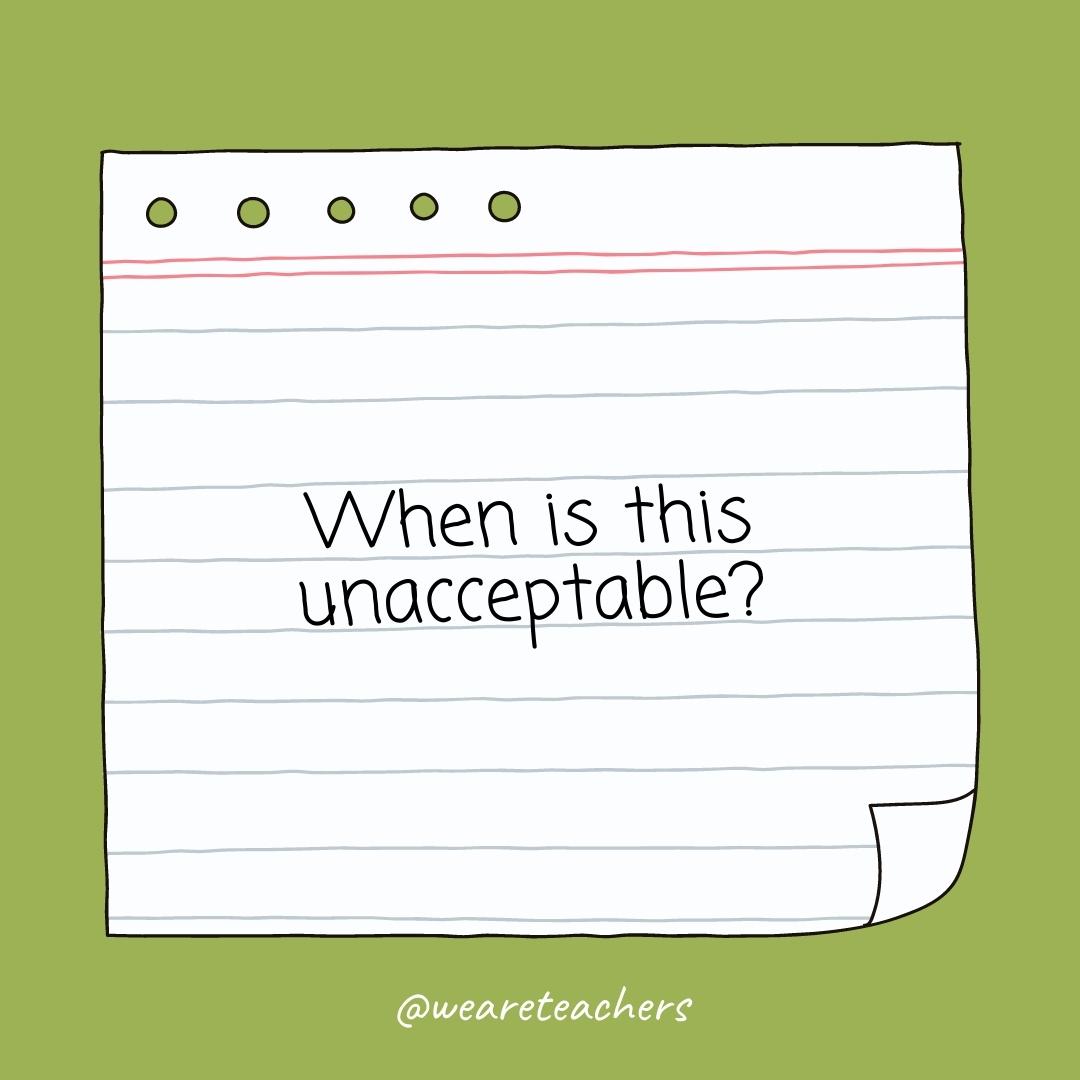
- Does this become a problem?
- Is the best time to take action?
- Will we be able to tell if it worked?
- Is it time to reassess?
- Should we ask for help?
- Is the best time to start?
- Is it time to stop?
- Would this benefit society?
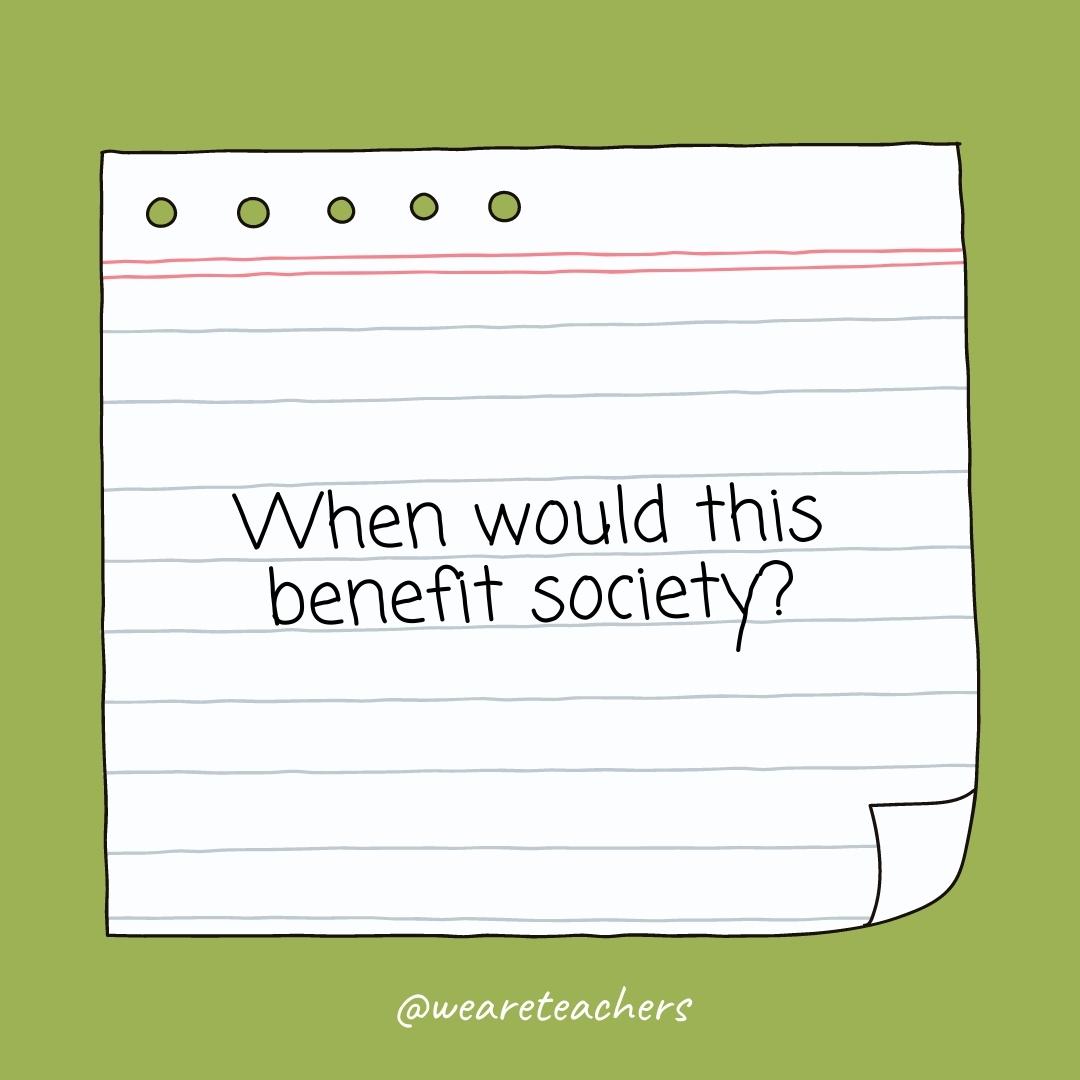
- Has this happened before?
“Why” Critical Thinking Questions
Asking “why” might be one of the most important parts of critical thinking. Exploring and understanding motivation helps develop empathy and make sense of difficult situations.
- Is _________ happening?
- Have we allowed this to happen?
- Should people care about this issue?
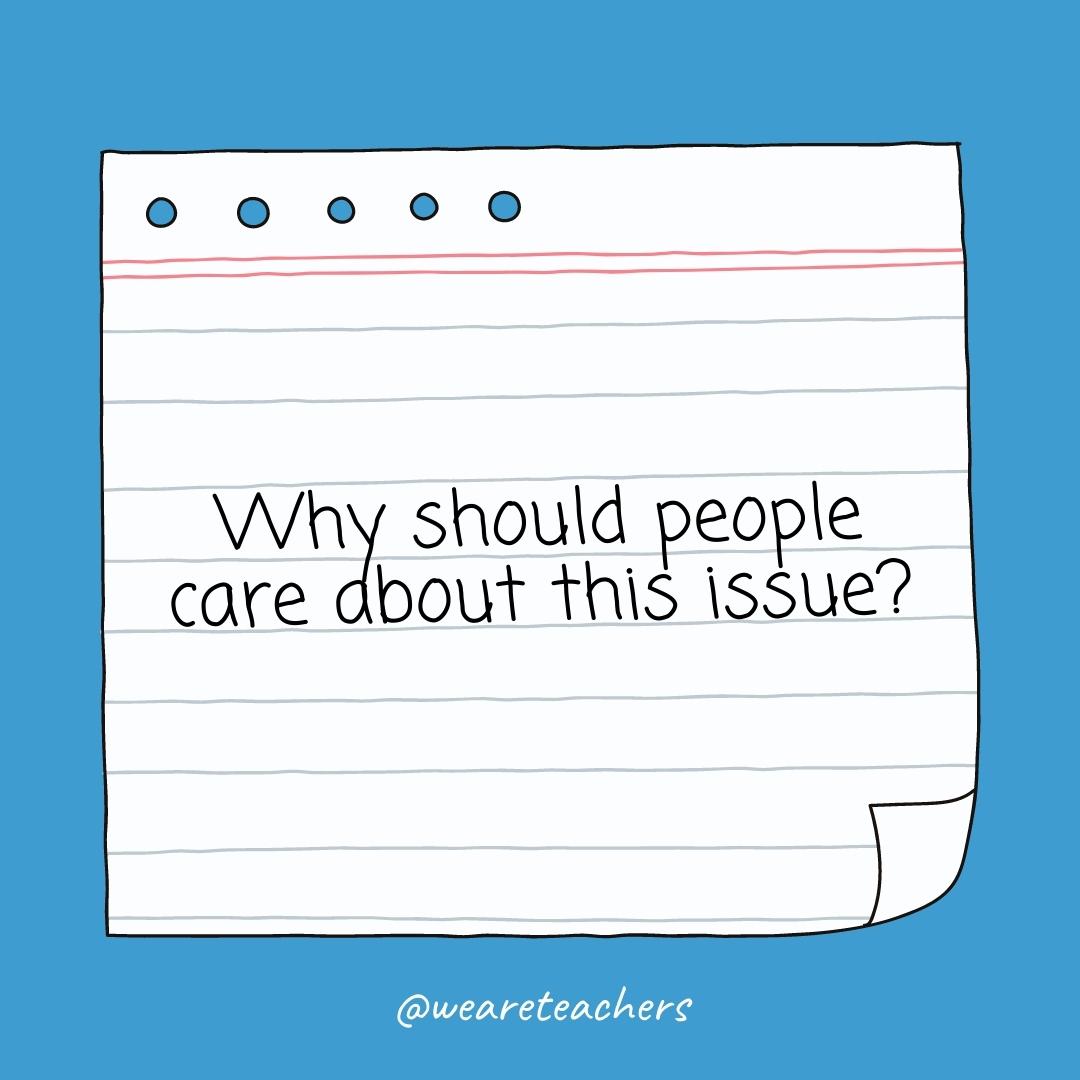
- Is this a problem?
- Did the character say … ?
- Did the character do … ?
- Is this relevant?
- Did the author write this?
- Did the author decide to … ?
- Is this important?
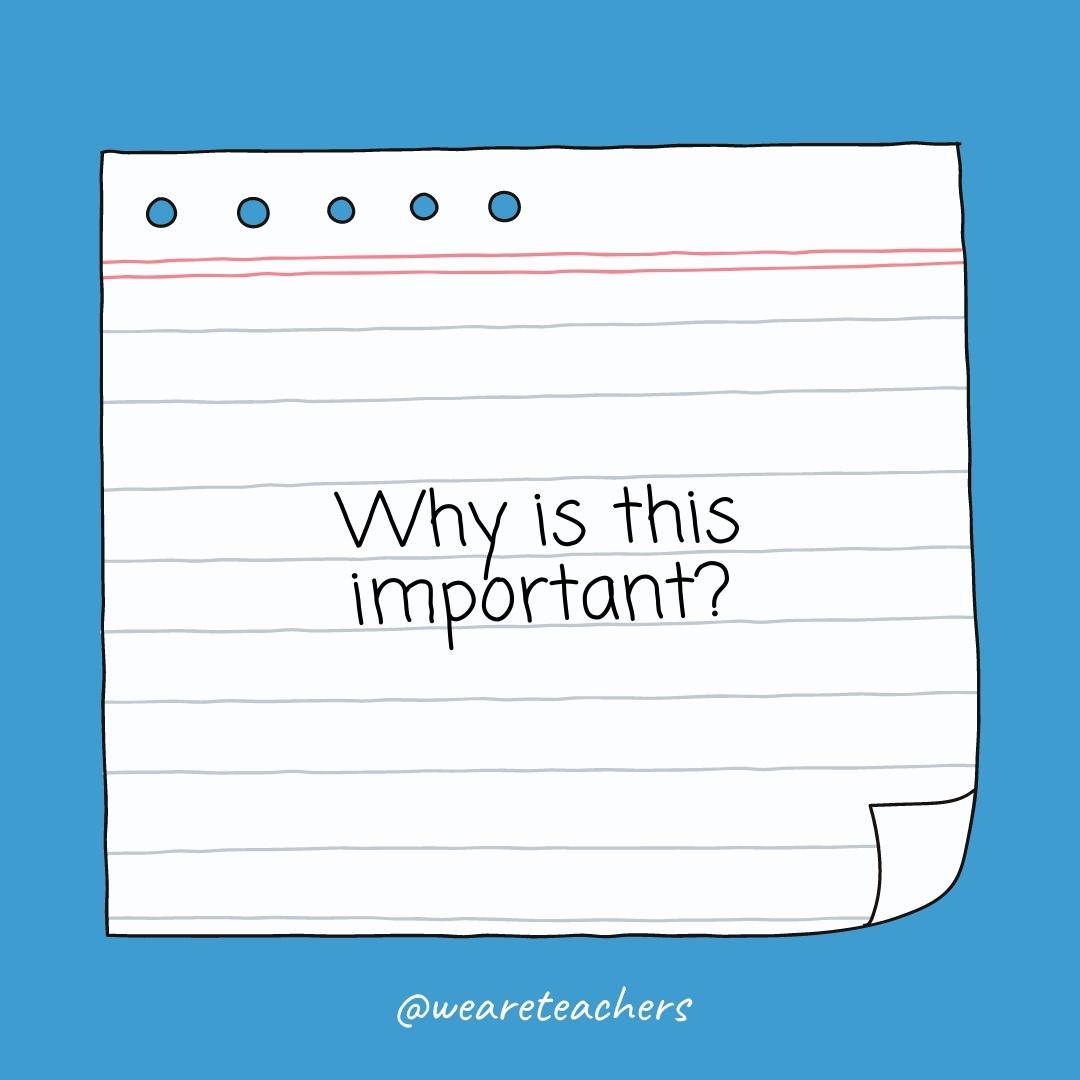
- Did that happen?
- Is it necessary?
- Do you think I (he, she, they) asked that question?
- Is that answer the best one?
- Do we need this today?
“How” Critical Thinking Questions
Use these questions to consider how things happen and whether change is possible.
- Do we know this is true?
- Does the language used affect the story?
- Would you solve … ?
- Is this different from other situations?
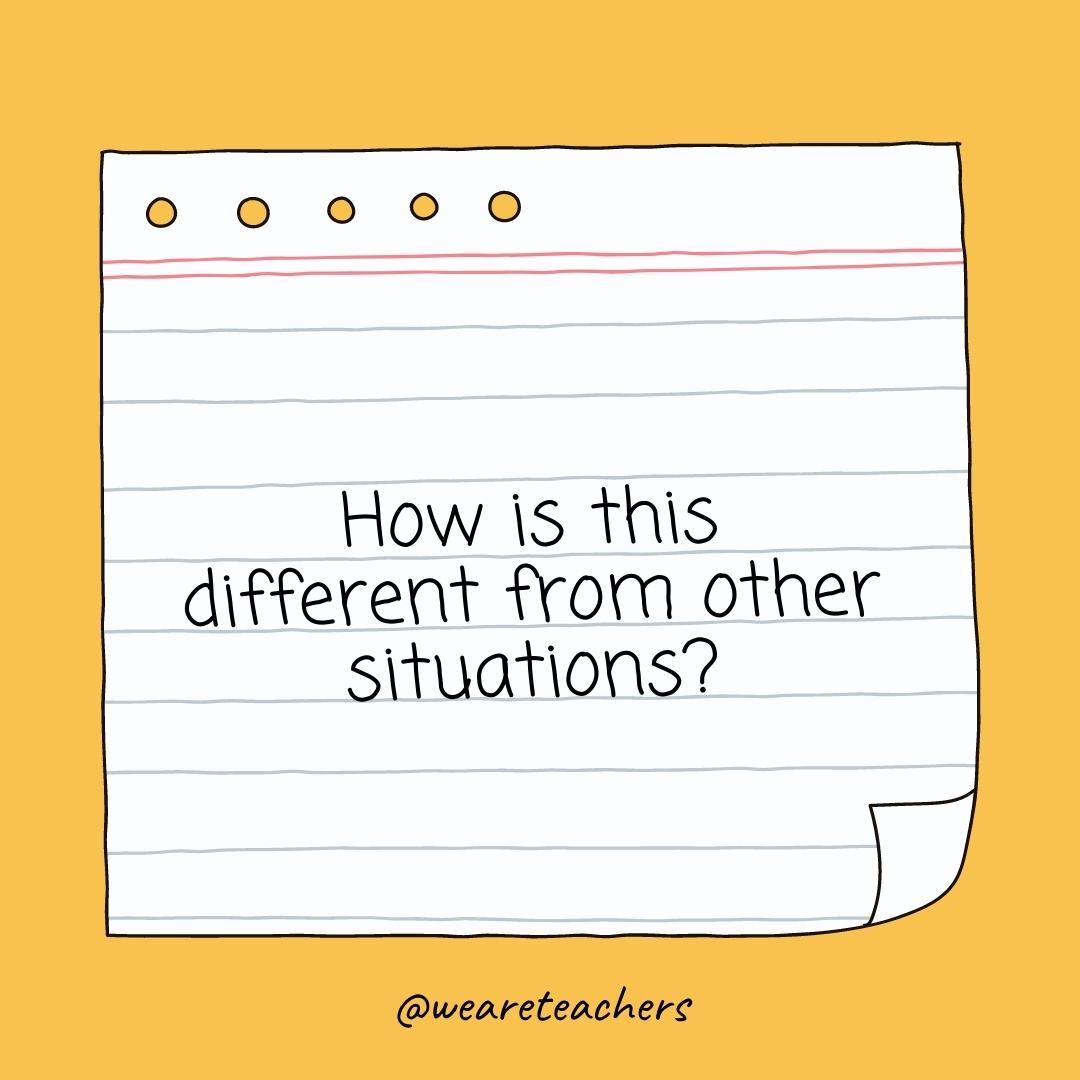
- Is this similar to … ?
- Would you use … ?
- Does the location affect the story?
- Could the story have ended differently?
- Does this work?
- Could this be harmful?
- Does this connect with what I already know?
- Else could this have been handled?
- Should they have responded?
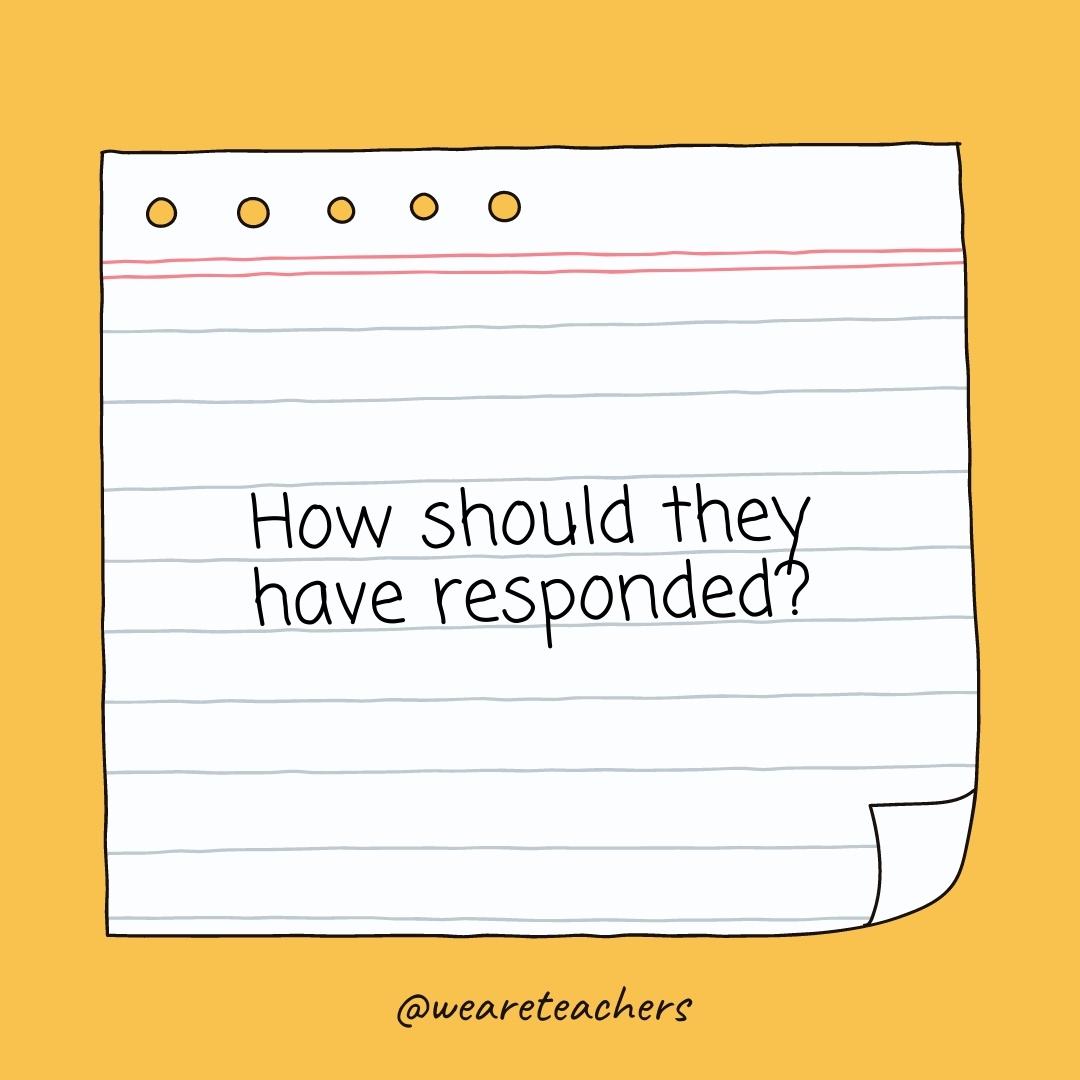
- Would you feel about … ?
- Does this change the outcome?
- Did you make that decision?
- Does this benefit you/others?
- Does this hurt you/others?
- Could this problem be avoided?
More Critical Thinking Questions
Here are more questions to help probe further and deepen understanding.
- Can you give me an example?
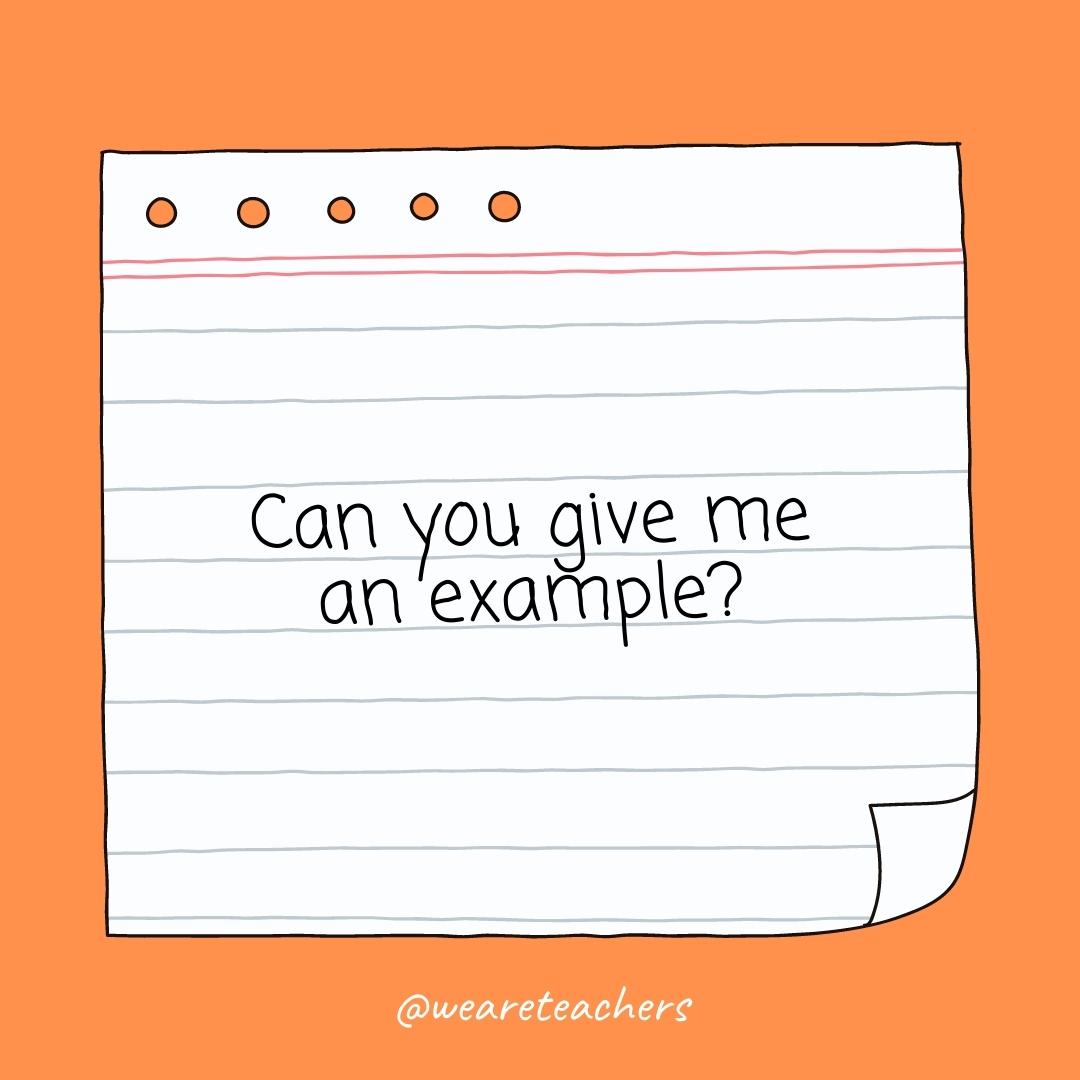
- Do you agree with … ?
- Can you compare this with … ?
- Can you defend the actions of … ?
- Could this be interpreted differently?
- Is the narrator reliable?
- Does it seem too good to be true?
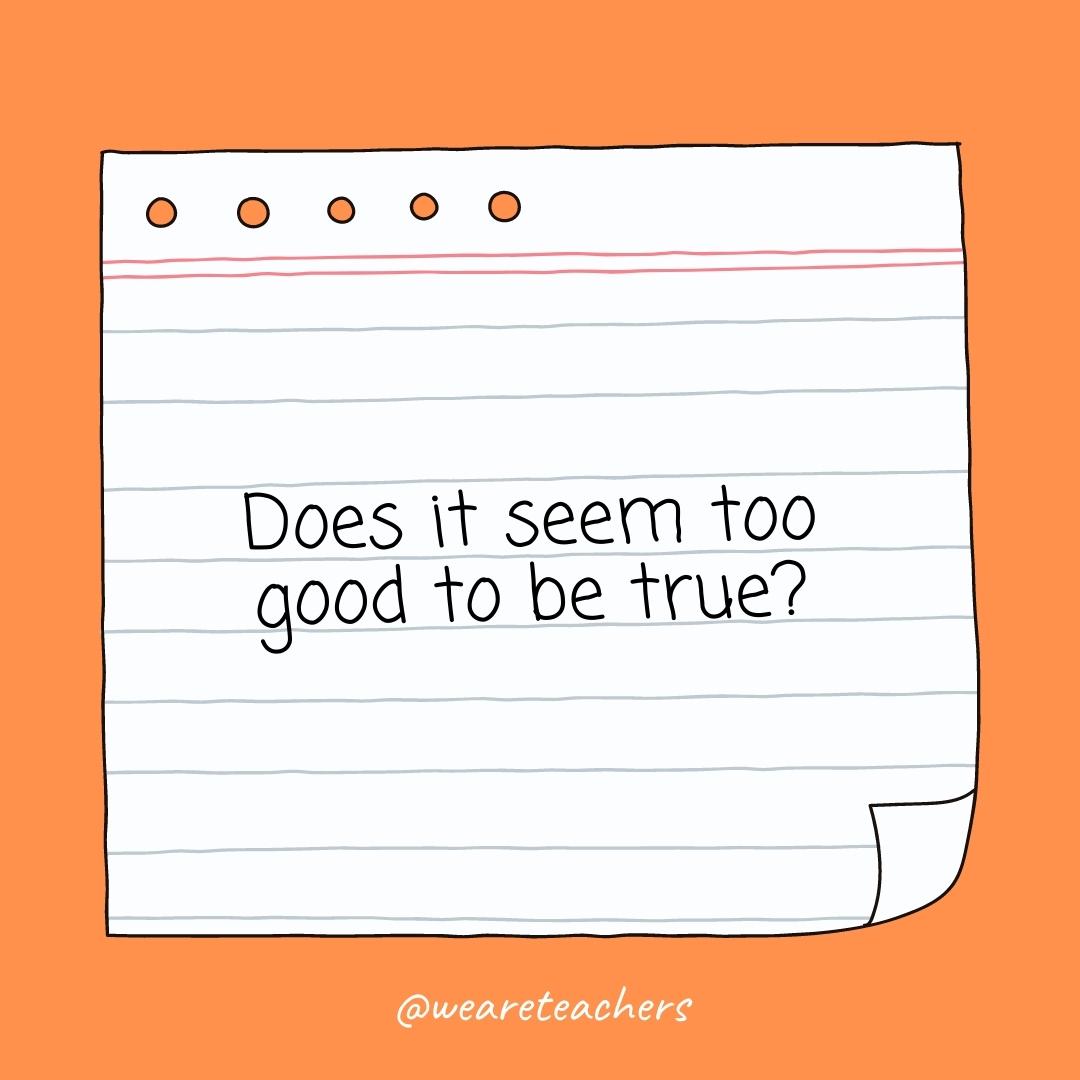
- Is ______ a fact or an opinion?
What are your favorite critical thinking questions? Come exchange ideas on the WeAreTeachers HELPLINE group on Facebook .
Plus, check out 10 tips for teaching kids to be awesome critical thinkers ., you might also like.
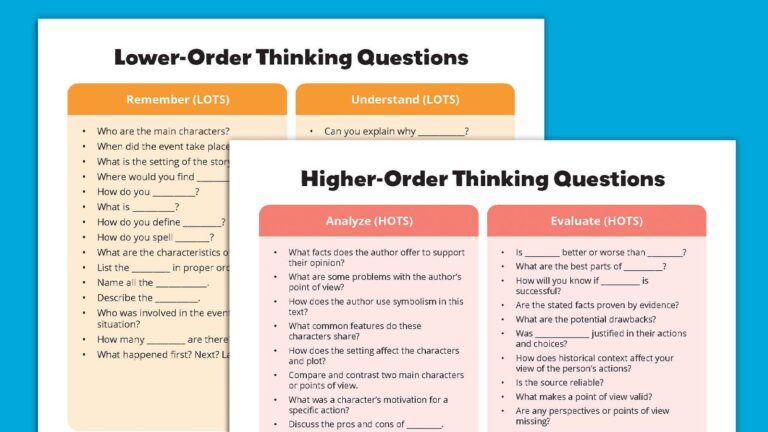
70 Higher-Order Thinking Questions To Challenge Your Students (Free Printable)
Plus 45 lower-order thinking questions too. Continue Reading
Copyright © 2024. All rights reserved. 5335 Gate Parkway, Jacksonville, FL 32256

Top 20 Critical Thinking Interview Questions & Answers
Master your responses to Critical Thinking related interview questions with our example questions and answers. Boost your chances of landing the job by learning how to effectively communicate your Critical Thinking capabilities.

Critical thinking is a skill highly sought after in today’s complex and fast-paced world. It’s not merely about thinking clearly or rationally; it’s about analyzing and evaluating information to guide action, making it pivotal across all professions and industries. Whether you are applying for a role that explicitly lists critical thinking as a job requirement or you’re looking to enhance your problem-solving prowess in your current position, demonstrating strong critical thinking skills can set you apart from the competition.
This article aims to illuminate the significance of critical thinking in the professional realm by delving into interview questions designed to test this indispensable skill. We’ll provide insights into what employers are looking for when they assess critical thinking abilities and offer strategies for crafting responses that showcase your analytical acumen.
Common Critical Thinking Interview Questions
1. how would you differentiate between a problem that requires critical thinking and one that does not.
Navigating ambiguous situations and analyzing information objectively are key components of effective critical thinking. This skill is crucial for solving complex problems where standard protocols may not apply, and outcomes are unpredictable. Conversely, routine problems often have established methods and clear-cut solutions that don’t demand extensive analysis or creative thought. The question aims to assess a candidate’s ability to recognize when a nuanced approach is necessary versus when efficiency can be prioritized by following standard procedures. It also evaluates a candidate’s judgment in identifying the scale and impact of a problem, which is crucial for resource management and prioritization within a role.
When responding, a candidate should outline their thought process for assessing problems, highlighting their ability to identify key factors such as the complexity of the issue, potential risks, and the level of uncertainty involved. An effective response would include examples demonstrating how they have distinguished between routine and complex problems in past experiences, along with the strategies they employed to address each effectively. This showcases their problem-solving abilities and their understanding of when to leverage critical thinking skills.
Example: “ Differentiating between a problem that requires critical thinking and one that does not hinges on the analysis of several dimensions of the problem at hand. For instance, a problem that is routine, well-defined, and has a clear set of procedures or historical precedents for its resolution typically may not necessitate critical thinking. In contrast, a problem that is complex, ambiguous, involves multiple stakeholders with conflicting interests, or has significant consequences depending on the outcome, demands a critical thinking approach.
In practice, I assess the need for critical thinking by evaluating the problem’s novelty, the scope of impact, the level of uncertainty, and the interdependencies among variables. For example, when faced with a new market trend that could potentially disrupt our business model, I recognized this as a critical thinking scenario due to its complexity and high stakes. I systematically gathered and analyzed data, questioned assumptions, and explored alternative solutions. This involved not just an analytical breakdown of the problem but also creative synthesis to develop innovative strategies, demonstrating the application of critical thinking to navigate through the intricacies of the issue effectively.”
2. Describe an instance when your initial hypothesis about a complex issue was incorrect.
When it comes to critical thinking, the ability to form hypotheses and adjust them when presented with new information or evidence is fundamental. This question delves into a candidate’s flexibility of thought, their willingness to admit and learn from mistakes, and their capacity to approach problems from multiple angles. A well-rounded candidate will not only recognize when they are wrong but will also see it as an opportunity for growth rather than a setback. It’s a test of humility and intellectual integrity, key traits for roles demanding analytical prowess and decision-making.
In your response, recount a specific situation where you had to pivot from your original assumption. Briefly outline the context and the stakes involved. Then, focus on the process you underwent to re-evaluate the situation: the additional information you considered, the way you integrated new data, and how you ultimately arrived at a different conclusion. Emphasize your thought process and the lessons learned, ensuring you highlight your adaptability and continuous improvement mindset.
Example: “ In analyzing a complex issue within a project, my initial hypothesis was that the bottleneck was caused by an inefficiency in the operational workflow. Upon deeper analysis, however, I discovered that the issue was not the workflow itself but rather a mismatch in team skill sets and resource allocation. By incorporating data analytics and soliciting cross-departmental feedback, I realized that the workflow was designed optimally but was being executed by team members who were not best suited for their roles.
To address this, I facilitated a realignment of tasks to match individual strengths and brought in additional training for areas where the team was lacking expertise. This pivot not only resolved the bottleneck but also improved overall team performance and morale. The experience underscored the importance of a data-driven approach and the value of looking beyond surface-level symptoms to underlying causes. It also reinforced the necessity of maintaining a flexible mindset and being willing to challenge my own assumptions in the face of new evidence.”
3. What strategies do you employ to identify biases in your decision-making process?
Awareness of personal biases is a critical component of effective critical thinking. Recognizing and mitigating these biases ensures that decisions are based on objective analysis rather than subjective preference. This question aims to assess whether a candidate is self-aware and actively engaged in personal development, as well as their ability to maintain objectivity in professional scenarios. It also speaks to a candidate’s commitment to fairness and their potential for leadership, where unbiased decision-making is essential for team cohesion and trust.
When responding, candidates should articulate the specific techniques they use to keep their biases in check. This might include seeking diverse perspectives, consulting with colleagues, relying on data and evidence, or engaging in reflective practices such as journaling or meditation. Candidates should provide concrete examples of when they’ve identified a bias in their thinking and how they adjusted their approach to ensure a more balanced outcome. Demonstrating a proactive approach to personal growth and a dedication to fair decision-making will signal to interviewers a candidate’s suitability for roles requiring sound judgment.
Example: “ To identify biases in my decision-making process, I employ a combination of reflective practices and evidence-based evaluation. I actively engage in self-reflection to question my initial assumptions and consider the origins of my perspectives. This often involves journaling, which helps to externalize and critically assess my thought patterns. Additionally, I prioritize the collection and analysis of data to inform my decisions, ensuring that they are rooted in objective evidence rather than subjective intuition.
When I detect a potential bias, I seek out diverse viewpoints to challenge my preconceptions. This involves consulting with colleagues who may have different experiences or expertise, which provides a broader perspective and mitigates the risk of echo chambers. In a recent project, I recognized a confirmation bias in my analysis, where I was favoring information that supported my initial hypothesis. By acknowledging this, I revisited the data and actively searched for disconfirming evidence, which led to a more nuanced understanding and ultimately a more robust decision-making process. This approach not only enhances the quality of my decisions but also fosters a culture of critical thinking and continuous improvement.”
4. In what ways have you used critical thinking to improve a process at your previous job?
Dissecting a process, analyzing its components with a sharp eye, and envisioning a more efficient or effective method are all aspects of critical thinking that drive process improvement and innovation. This ability to objectively evaluate and enhance systems is not just about fixing what’s broken, but also about preempting potential issues and maximizing productivity. By asking this question, interviewers are looking for evidence of a candidate’s analytical skills and their initiative to bring about positive change within an organization.
When responding to this question, provide a concrete example of a time you identified a problem or area for improvement. Break down the steps you took to analyze the situation, emphasizing how you gathered data, considered various solutions, and weighed the pros and cons. Then, explain the action you took, the implementation of the new process, and most importantly, the outcome. Illustrate how your critical thinking led to tangible benefits for the company, such as time savings, cost reductions, increased revenue, or improved employee satisfaction.
Example: “ In a previous role, I identified a bottleneck in our project reporting process, which was causing delays in decision-making. I initiated a thorough analysis of the existing workflow and discovered that the report consolidation was the primary issue, as it relied on manual data entry from multiple departments. To tackle this, I conducted a root cause analysis to understand the underlying issues and engaged with stakeholders to gather insights and validate findings.
Armed with this information, I proposed and implemented an automated data aggregation tool that interfaced with our existing systems. This solution not only streamlined the data collection process but also reduced the potential for human error. By critically evaluating the process and considering the technological resources available, I was able to re-engineer the workflow, resulting in a 30% reduction in the time taken to generate reports. This improvement led to faster strategic decisions and a significant increase in overall team productivity.”
5. Can you provide an example of how you’ve dissected a multifaceted argument to assess its validity?
Breaking down complex issues into their component parts to understand the underlying logic and reasoning is a hallmark of effective critical thinking. This skill is particularly valuable as it allows for a nuanced approach to problem-solving, where the thinker can identify biases, logical fallacies, and the strength of the evidence presented. Employers seek individuals who can navigate through layers of information, differentiate between correlation and causation, and make informed decisions based on a sound analysis of available data. This question aims to reveal whether the candidate has a systematic approach to addressing intricate arguments and can remain objective while evaluating differing viewpoints.
When responding to this question, begin by outlining a specific scenario where you were faced with a challenging argument or problem. Walk the interviewer through your process step-by-step, explaining how you identified key issues, researched relevant information, and applied logical reasoning to each part. Highlight how you remained impartial, even if the argument related to a topic you felt strongly about, and conclude by sharing the outcome of your analysis. This approach not only demonstrates your critical thinking abilities but also shows that you can communicate complex ideas clearly and effectively.
Example: “ In one instance, I was presented with an argument that a particular business strategy would significantly increase market share. The argument was supported by a variety of data points and expert opinions. To assess its validity, I first deconstructed the argument into its core components: the underlying assumptions, the evidence provided, and the logical connections between the two.
I then conducted an independent evaluation of the evidence, scrutinizing the methodology behind the data collection and the credibility of the sources. Simultaneously, I challenged the assumptions by considering alternative scenarios and seeking out information that could either confirm or refute them. Throughout this process, I maintained an objective stance, ensuring that my personal biases did not color the analysis.
The outcome of this rigorous examination was a nuanced understanding of the strategy’s potential. I concluded that while the strategy had merit, it also carried risks that were not initially apparent. This comprehensive analysis allowed for a more informed decision-making process that considered both the strengths and weaknesses of the proposed strategy.”
6. Outline the steps you take when confronted with conflicting data points.
When presented with conflicting data, the ability to discern, analyze, and integrate information is paramount. This question not only assesses a candidate’s analytical skills but also evaluates their approach to uncertainty and complexity. It inspects the candidate’s methodology for handling information that doesn’t readily align, testing their intellectual rigor and commitment to evidence-based decision-making.
To respond, outline a systematic approach: begin by verifying the sources of the data for credibility. Next, cross-examine the information for errors or biases. If the data remains conflicting, consider alternative perspectives or additional research to provide context. Explain how you would weigh the evidence, perhaps employing specific analytical tools or consulting with knowledgeable colleagues. Conclude by describing how you would form a reasoned conclusion or make a recommendation, emphasizing your flexibility and openness to changing your stance as new information arises.
Example: “ When confronted with conflicting data points, my initial step is to authenticate the sources, ensuring their reliability and validity. I scrutinize the methodologies used to gather the data, looking for potential errors or methodological inconsistencies that could explain the discrepancies. If the sources and methods are sound, I proceed to examine the data for any inherent biases or contextual factors that might influence the results.
Following this critical evaluation, I explore additional research or data that could provide further insight, often utilizing statistical analysis or predictive modeling to discern patterns or anomalies. This process may also involve seeking expertise from colleagues who can offer alternative perspectives or specialized knowledge. Throughout this investigative phase, I maintain a balanced approach, considering all evidence on its merit.
Ultimately, I synthesize the findings, weighing the evidence carefully. My recommendation or conclusion is based on the most comprehensive and robust understanding of the data, with an acknowledgment of any remaining uncertainties. I remain adaptable, ready to adjust my position in light of new evidence or insights that may emerge.”
7. When evaluating evidence, how do you determine its relevance and reliability?
Analyzing information and making informed decisions hinge on determining the relevance and reliability of evidence. The question delves into the candidate’s thought process and methodology for discerning the quality and applicability of information. It also reveals their capacity for skepticism and due diligence, as well as their understanding of the sources and contexts that may affect the integrity of evidence. Employers ask this to ensure the potential employee can effectively sift through data, recognize biases, and draw conclusions that are not only logical but also empirically sound.
When responding to this question, a candidate should outline a systematic approach, starting with the assessment of the source’s credibility, including its origin, authorship, and purpose. They should then discuss the process of cross-referencing the information with other reliable sources and the importance of considering the context in which the evidence was produced. Demonstrating an awareness of one’s own cognitive biases and the potential for these to influence decision-making is also valuable. Lastly, articulating a clear, practical example of how they have applied these principles in a previous situation can help to solidify their response.
Example: “ In evaluating evidence, the first step is to scrutinize the source’s credibility. This includes examining the author’s qualifications, the publication’s reputation, and the methodology used to gather the information. I then assess the purpose of the evidence, looking for any signs of bias or intent to persuade rather than inform. To establish reliability, I cross-reference the evidence with other sources, ensuring they are independent and authoritative. This triangulation helps to confirm the consistency and validity of the information.
Context is paramount; understanding the circumstances under which the evidence was produced allows for a more nuanced interpretation. For instance, in a previous situation where I had to evaluate data from a study, I considered the sample size, the controls in place, and the study’s funding sources. Moreover, I remain vigilant about my cognitive biases, actively seeking disconfirming evidence to challenge my initial conclusions. This disciplined approach ensures that my decisions are based on robust and objective assessments of the evidence at hand.”
8. Share an experience where you had to make a decision without all the desired information.
Acting with confidence even when not all the facts are present is a common requirement in fast-paced environments where waiting for perfect information could lead to missed opportunities or compounded issues. The question aims to assess a candidate’s risk assessment capabilities, their comfort with ambiguity, and their problem-solving skills. It evaluates whether the candidate can pull from their knowledge, past experiences, and available resources to make an informed decision that could potentially affect the outcome of a project or the direction of a company.
When responding to this question, candidates should focus on a specific example that showcases their thought process during an uncertain situation. They should detail the steps they took to gather as much information as possible, weigh the potential risks and benefits, consider the impact of their decision, and explain how they arrived at their conclusion. It’s also beneficial to reflect on the outcome of the decision and what they learned from the experience, demonstrating an ability to learn and adapt from less-than-ideal situations.
Example: “ In a project where time-sensitive decisions were crucial, I encountered a situation where critical data was incomplete due to unforeseen circumstances. Understanding the urgency, I initiated a rapid but thorough risk assessment to evaluate potential impacts of various decision scenarios. I leveraged historical data, parallel case studies, and consulted with subject matter experts to fill in informational gaps to the greatest extent possible.
After synthesizing this information, I employed a decision matrix to prioritize options based on the project’s strategic objectives and stakeholder interests. I chose a course of action that balanced risk with potential reward, ensuring that the most critical project deliverables remained on track. The decision was successful, resulting in minimal disruption to the project timeline and budget. This experience reinforced the importance of a structured approach to decision-making under uncertainty and the value of drawing on diverse information sources to inform such decisions.”
9. Detail a situation in which your critical analysis led to a significant change in strategy or direction.
Strategic planning and problem-solving are areas where critical thinking is indispensable. When interviewers pose this question, they’re looking for evidence of your ability to dissect complex issues, consider diverse perspectives, and foresee potential outcomes. The ability to pivot and adapt strategies based on new information reflects an agile mindset, which is highly valued in dynamic business environments. It reveals your capacity to influence meaningful change and demonstrates foresight, adaptability, and the courage to challenge the status quo when necessary.
When responding, outline a specific scenario succinctly, emphasizing the complexity of the situation and the critical thinking processes you employed. Discuss the rationale behind your analysis, the different options you considered, and why you advocated for a particular change in strategy or direction. Highlight the impact of your decision—how it benefited the organization, improved efficiency, increased revenue, or mitigated risks. Your response should convey confidence in your judgment, an analytical approach to problem-solving, and a proactive stance in driving innovation or improvement.
Example: “ In a project where the initial strategy was to expand market share through aggressive pricing, I conducted a critical analysis of market trends, consumer behavior, and competitive responses. My analysis revealed that such a pricing strategy would trigger a price war with competitors that our company was not financially positioned to sustain. Instead, I proposed a value-added approach, focusing on differentiating our products through enhanced features and customer service rather than competing solely on price.
I presented a comprehensive business case to the leadership team, outlining the potential long-term consequences of the original strategy, including market erosion and reduced profitability. I contrasted this with the projected outcomes of the value-added strategy, which included increased customer loyalty, brand strength, and sustainable profit margins. The leadership adopted my recommendation, leading to a 15% increase in customer retention and a 10% rise in profit margins within the following fiscal year, validating the shift in strategy and demonstrating the importance of thorough critical analysis in strategic decision-making.”
10. How do you handle situations where team members resist your critical evaluations?
Providing feedback that may not be readily accepted, especially when it challenges established ideas or practices within a team, involves effective critical thinking. The ability to navigate resistance is a testament to one’s diplomatic skills and emotional intelligence. It reflects an understanding that critique is not a personal attack but a necessary part of growth and innovation. Employers value candidates who can diplomatically deliver critical evaluations and facilitate a constructive dialogue that leads to improved performance and collaboration, rather than discord and division.
When responding to this question, it’s important to emphasize your approach to communication and conflict resolution. Detail specific strategies you employ to ensure that your evaluations are objective, evidence-based, and presented in a way that underscores their intention to improve the team’s output. Highlight your ability to listen to and address concerns, foster an open environment for discussion, and ultimately guide the team towards a consensus or compromise that upholds the project’s best interests.
Example: “ In situations where team members resist critical evaluations, my approach is to first ensure that the feedback is grounded in objective data and aligns with predefined goals or standards. I present my evaluations with clarity, focusing on the issue at hand rather than personal attributes, to minimize defensiveness. When resistance occurs, I actively listen to the team members’ perspectives, acknowledging their viewpoints and concerns. This demonstrates respect for their expertise and fosters an environment of mutual trust.
I then facilitate a constructive dialogue, guiding the team towards understanding the evaluation’s rationale and the potential benefits of addressing the identified issues. By encouraging an open exchange of ideas, I often find that resistance gives way to collaborative problem-solving. If a consensus is not immediately reached, I propose incremental steps to test the recommended changes, allowing the team to see empirical results. This method not only validates the evaluation’s findings but also empowers the team to be part of the solution, ensuring that the critical evaluation serves as a catalyst for positive change rather than a point of contention.”
11. What is your approach to prioritizing issues requiring immediate critical thought over routine tasks?
Distinguishing between tasks that need immediate attention and those that follow a routine is often a critical component of professional critical thinking. Employers are looking for candidates who can swiftly analyze situations, recognize the urgency and potential impact of each task, and act accordingly to ensure efficiency and effectiveness. The ability to prioritize reflects a person’s judgment, time management skills, and ultimately their capability to contribute to the organization’s success without becoming overwhelmed or sacrificing quality.
When responding to this question, you should demonstrate your decision-making process by providing a clear and structured approach. Outline how you assess the importance of tasks, perhaps by considering factors such as deadlines, potential outcomes, and resources required. You could also mention any tools or techniques you use to stay organized, such as to-do lists or project management software. Giving concrete examples from past experiences where you successfully prioritized critical issues will illustrate your methodology in action and reassure the interviewer of your proficiency in this area.
Example: “ When faced with multiple tasks, my approach to prioritization begins with a swift evaluation of each issue’s potential impact and urgency. I consider the consequences of delayed action, weighing the risks against the benefits of immediate attention. Critical issues that could escalate into larger problems or have a significant negative impact on the project or organization take precedence. For instance, if a critical issue has the potential to disrupt service delivery or cause financial loss, it becomes the top priority.
I utilize a combination of Eisenhower’s Matrix for categorizing tasks by urgency and importance, and project management tools for tracking progress and deadlines. This method allows me to maintain a clear overview of the landscape of responsibilities and make informed decisions quickly. In practice, this approach has enabled me to effectively intervene in situations that required immediate critical thought, such as resolving a bottleneck in a project that threatened to derail the timeline, while ensuring that routine tasks are rescheduled appropriately and do not fall by the wayside.”
12. Could you give an example of a time when you had to challenge conventional wisdom using critical thinking?
The ability to step outside the norm, question the status quo, and innovate is a key aspect of critical thinking. This question aims to unearth a candidate’s ability to recognize when a widely accepted approach is flawed or inadequate and their courage and skill in devising and implementing a more effective alternative. It reveals their capability to not only recognize when a widely accepted approach is flawed or inadequate but also their courage and skill in devising and implementing a more effective alternative.
To respond effectively, choose a specific instance where you identified a problem that others had accepted as unsolvable or ignored due to traditional thinking. Explain your thought process in evaluating the situation, how you identified a novel approach, and the steps you took to challenge the prevailing wisdom. Highlight the outcome, what you learned, and how it demonstrates your critical thinking prowess. Be sure to convey confidence in your decision-making process while also acknowledging the risk and resistance that often accompanies going against the grain.
Example: “ In a project where the prevailing approach was to incrementally improve an existing product, I noticed that our incremental changes were no longer yielding significant benefits to the customer. Conventional wisdom suggested we continue with minor improvements, but my analysis of customer feedback and market trends indicated a plateau in satisfaction and a shift in consumer needs.
Using critical thinking, I dissected the core functions of our product, reevaluated our assumptions, and proposed a radical redesign that aligned more closely with emerging user preferences. I presented a data-driven case to stakeholders, illustrating the long-term benefits and potential market capture that a bold move could offer. Despite initial resistance, the evidence was compelling, and we pivoted to the new strategy.
The redesigned product not only reinvigorated the brand but also captured a new customer segment, leading to a substantial increase in market share. This experience underscored the importance of questioning the status quo and reinforced my belief in the power of critical thinking to drive innovation and strategic redirection.”
13. How do you maintain objectivity when critically assessing emotionally charged issues?
Detaching oneself from personal biases and emotional influences to arrive at logical, fair conclusions is a demand of critical thinking, especially in emotionally charged situations. Employers ask this question to discern whether a candidate possesses the self-awareness and strategies necessary to navigate emotionally-laden terrain without compromising their decision-making process. It’s a subtle test of a candidate’s professionalism and their capacity to handle workplace conflicts or sensitive projects with a level head.
When responding, illustrate with examples where you’ve successfully maintained impartiality during heated discussions or decisions. Emphasize techniques you use, such as stepping back to analyze the facts, seeking diverse perspectives, or employing established frameworks to guide your thought process. Your answer should reassure the interviewer that you can uphold the integrity of your role, even when emotions run high.
Example: “ Maintaining objectivity in emotionally charged situations hinges on a disciplined adherence to evidence and a structured analytical framework. For instance, during a contentious project debate, I anchor my assessment in data-driven criteria, ensuring that decisions are rooted in quantifiable metrics rather than subjective sentiments. This approach not only clarifies the decision-making process but also provides a common language for all stakeholders, facilitating a more rational discourse.
Additionally, I actively seek out diverse perspectives to challenge my own biases and broaden my understanding of the issue at hand. By engaging with viewpoints that differ from my own, I can construct a more comprehensive analysis that transcends personal emotions. This method was particularly effective when navigating a high-stakes negotiation, where synthesizing the various interests led to a consensus that balanced emotional concerns with strategic objectives. Employing these techniques consistently has proven to be instrumental in upholding impartiality and ensuring that critical thinking prevails in emotionally intense scenarios.”
14. What techniques do you use to foster critical thinking skills within a team environment?
Cultivating an environment where team members are encouraged to think deeply and challenge assumptions is a reflection of critical thinking in a team setting. When interviewers pose this question, they are looking for insight into how you foster intellectual growth and collaborative problem-solving. It reveals your leadership style and your ability to facilitate intellectual growth and collaborative problem-solving. The question also serves to understand if you can balance the need for diverse perspectives while steering the team towards cohesive, well-reasoned outcomes.
When responding, you should outline specific strategies you’ve employed to encourage critical thinking. This could include fostering open discussions, posing challenging problems for the team to solve, encouraging team members to question the status quo, and facilitating debates. Highlight examples from your experience where these techniques have led to innovative solutions or improved decision-making. Mention how you ensure all voices are heard and how you guide discussions to remain constructive and focused on the end goal.
Example: “ To cultivate critical thinking within a team, I implement a structured approach to problem-solving that encourages divergent thinking followed by convergent analysis. Initially, I facilitate brainstorming sessions that promote the free flow of ideas without immediate judgment, allowing team members to explore various perspectives and challenge preconceived notions. This openness fosters an environment where creativity is valued, and unconventional ideas can surface.
Once a broad range of ideas is on the table, I guide the team through a critical evaluation process. This involves systematically assessing the feasibility, potential impact, and risks associated with each idea. I encourage team members to ask probing questions and consider the implications of each approach. By employing techniques such as the Six Thinking Hats or SWOT analysis, I ensure that the team examines issues from multiple angles, leading to more robust and well-rounded solutions. Moreover, I make a conscious effort to create an inclusive atmosphere where every member feels empowered to contribute, ensuring a diversity of thought and preventing groupthink. Through these methods, we’ve consistently achieved innovative outcomes and enhanced our collective decision-making capabilities.”
15. Illustrate how you balance quick decision-making with thorough critical analysis under pressure.
Thinking on one’s feet while ensuring that decisions are well-considered and not rash is a crucial aspect of critical thinking, especially in roles where the stakes are high and the cost of a mistake is significant. Employers ask this question to assess a candidate’s ability to think on their feet while also ensuring that their decisions are well-considered and not rash. It’s crucial in roles where the stakes are high and the cost of a mistake is significant. The interviewer is looking for a glimpse into your decision-making process, particularly how you weigh the urgency of a situation against the need for comprehensive analysis.
To respond, describe a scenario where you were faced with a time-sensitive decision. Walk through your thought process, highlighting how you identified the key issues, evaluated the information at hand, and prioritized actions while maintaining a commitment to making a sound, well-reasoned choice. Focus on demonstrating your ability to discern which decisions require immediate action and which can benefit from more extensive analysis. It’s important to convey that you can strike a balance between speed and precision, leveraging your critical thinking skills to deliver optimal outcomes efficiently.
Example: “ In a situation where rapid decision-making was crucial, I employed a tiered approach to critical analysis. Initially, I identified the core issue that demanded immediate attention, separating it from less urgent factors. I then quickly gathered the most relevant data, applying heuristic techniques to assess the situation’s urgency and potential impact. This allowed me to prioritize actions that would mitigate immediate risks or capitalize on fleeting opportunities.
Simultaneously, I maintained an awareness of the broader context, ensuring that my swift decisions aligned with long-term objectives and values. By leveraging a combination of deductive reasoning to address the immediate issue and inductive reasoning to consider the potential implications, I was able to make a well-reasoned decision that was both timely and thoughtful. This method has consistently proven effective in balancing the need for expediency with the commitment to thorough analysis, ensuring that the decisions I make under pressure are both strategic and sound.”
16. Have you ever encountered a groupthink scenario and how did you apply critical thinking to address it?
Recognizing the signs of groupthink—such as a homogenization of ideas, pressure to conform, and an illusion of unanimity—and challenging the status quo to ensure diverse perspectives are considered is important for preventing suboptimal outcomes. Employers value candidates who can maintain objectivity, apply analytical skills to evaluate different opinions, and foster a culture of open dialogue, even when it’s uncomfortable or goes against the grain. This question assesses a candidate’s ability to maintain objectivity, apply analytical skills to evaluate different opinions, and foster a culture of open dialogue, even when it’s uncomfortable or goes against the grain.
When responding, it’s important to provide a specific example that illustrates your awareness of a groupthink situation. Detail how you identified the issue, the steps you took to encourage alternative viewpoints, and the outcome of your intervention. Emphasize your communication skills, your respect for diverse opinions, and your commitment to making decisions based on evidence and sound reasoning. It’s also beneficial to reflect on what you learned from the experience and how it has influenced your approach to teamwork and problem-solving in subsequent situations.
Example: “ Yes, I encountered a groupthink scenario during a project where the team was prematurely converging on a solution without thoroughly vetting alternatives. Recognizing the signs of groupthink, such as the lack of debate and the quick dismissal of outside opinions, I intervened by orchestrating a structured brainstorming session. I introduced a “devil’s advocate” approach, assigning team members to purposely challenge the prevailing assumptions and propose contrarian viewpoints.
This strategy fostered a more open dialogue and encouraged critical evaluation of the proposed solution. By systematically dissecting each argument and examining the evidence, the team was able to identify potential flaws and biases in our initial approach. The outcome was a more robust and innovative solution that had the benefit of diverse perspectives. The experience reinforced the importance of vigilance against groupthink and has since shaped my commitment to fostering an environment where critical thinking and dissenting opinions are valued in the decision-making process.”
17. Describe a complex project where your critical thinking uncovered an overlooked solution.
Evaluating sources, such as data, facts, observable phenomena, and research findings, is part of the critical thinking process. In the context of a job interview, this question serves to evaluate not only a candidate’s problem-solving capabilities but also their initiative and innovation. It reveals how a candidate approaches a problem, breaks it down into components, and systematically tackles it. It’s about assessing the candidate’s ability to not just think, but to think outside the box and recognize patterns that are not immediately obvious, which can lead to innovative solutions that others might miss.
When responding to this question, you should outline the context of the project briefly, highlighting its complexity. Proceed to explain the thought process you employed, detailing how you identified the problem, the various solutions you considered, and why they were dismissed or pursued. Emphasize the critical thinking techniques you used, such as questioning assumptions, analyzing potential outcomes, and synthesizing information from various sources. Conclude with the impact of your solution, such as cost savings, time efficiency, or improved outcomes. Demonstrating a structured approach to problem-solving will show employers that you possess the analytical skills necessary to tackle complex projects effectively.
Example: “ In a recent complex project, the primary challenge was optimizing the resource allocation process to reduce waste and increase efficiency. The existing system was sophisticated but had a persistent issue with over-provisioning, leading to significant financial drain. Upon a deep dive into the data and processes, I employed root cause analysis and discovered that the algorithm driving the allocation was based on outdated assumptions about usage patterns.
By questioning these assumptions and conducting a series of predictive analyses, I proposed a dynamic allocation model that adjusted resources in real-time based on current demand rather than historical trends. I also integrated a feedback loop that allowed the system to learn and adapt over time. This solution required a nuanced understanding of both the technical aspects and the behavioral patterns of system users. The implementation of this model led to a 20% reduction in resource waste within the first quarter, validating the effectiveness of the critical thinking process in uncovering this overlooked solution.”
18. What methods do you utilize to ensure your conclusions are sound when dealing with abstract concepts?
Dissecting and navigating theoretical or complex ideas ensures that a candidate’s thought process is logical, thorough, and evidence-based. The question seeks to explore a candidate’s ability to handle abstract concepts that are not easily quantifiable or observable. It is a test of not just intelligence but of a systematic and disciplined approach to problem-solving that can greatly affect the outcomes of projects and tasks. The interviewer is looking for a glimpse into the candidate’s intellectual rigor and how they handle ambiguity and uncertainty.
When responding, it is vital to discuss a structured approach to critical thinking. One could highlight the importance of questioning assumptions, seeking out a variety of sources for information, and applying logical reasoning. Emphasize the use of specific strategies such as breaking down complex problems into smaller, more manageable parts, employing analogies to better understand unfamiliar concepts, or using decision-making frameworks like the Cynefin framework to categorize problems and respond appropriately. Sharing examples from past experiences where these methods were applied to reach a well-reasoned conclusion can illustrate your proficiency in critical thinking.
Example: “ To ensure my conclusions are sound when dealing with abstract concepts, I systematically employ a combination of deductive and inductive reasoning, while rigorously questioning underlying assumptions. I begin by dissecting the abstract concept into its fundamental elements, which allows me to analyze the problem more effectively. This process of decomposition helps to identify any logical inconsistencies and to understand the relationships between the various components of the concept.
I also draw upon diverse informational sources to inform my understanding, ensuring that my perspective is not limited by a single viewpoint. By integrating these perspectives, I can construct a more comprehensive understanding of the abstract concept. Additionally, I use analogies to create parallels with more familiar concepts, which aids in grasping the essence of the abstract idea and in communicating my reasoning to others. When synthesizing my conclusion, I apply decision-making frameworks like the Cynefin framework, which assists in categorizing the problem and determining the most suitable approach for resolution. This structured methodology ensures that my conclusions are not only logical but also pragmatic, taking into account the complexity and context of the situation at hand.”
19. How do you integrate critical thinking into your everyday work routines?
Anticipating challenges and mitigating them before they impact the workflow is a key aspect of critical thinking. Employers want to know that a candidate can not only solve problems when they arise but also anticipate challenges and mitigate them before they impact the workflow. They are looking for evidence of a proactive mindset that employs logic, creativity, and strategic planning as part of the daily work routine rather than reactive thinking that only addresses issues as they come up.
When responding, candidates should describe specific strategies they use to apply critical thinking in their work. This might involve breaking down complex projects into manageable parts, asking probing questions to fully understand a situation, employing data-driven decision-making, or conducting regular reviews of processes to identify potential improvements. Sharing concrete examples of past situations where critical thinking led to successful outcomes can also demonstrate the candidate’s ability to effectively integrate this skill into their work habits.
Example: “ In my daily work, I routinely employ a methodical approach to problem-solving that hinges on breaking down complex issues into their fundamental components. This dissection allows for a clearer understanding of the underlying factors and variables at play. By doing so, I can systematically evaluate each element, considering both short-term and long-term implications, which is critical for informed decision-making.
I also maintain a disciplined practice of asking probing questions, not only to clarify the specifics of a challenge but also to uncover any hidden assumptions or biases that might skew my analysis. This practice is complemented by a commitment to data-driven decisions, ensuring that my conclusions are grounded in empirical evidence rather than conjecture. To ensure continuous improvement, I conduct regular process reviews, identifying areas for refinement or innovation, thereby fostering a dynamic and responsive work environment that leverages critical thinking to overcome obstacles and enhance productivity.”
20. Reflect on a time when your critical thinking abilities significantly impacted the outcome of a project.
Determining if a candidate can discern complex situations and act in a manner that leads to effective and innovative solutions is a crucial part of the interview process. Employers ask this question to determine if a candidate can not only discern complex situations but also act in a manner that leads to effective and innovative solutions. They are looking for evidence of a methodical approach to tackling challenges and the ability to anticipate potential pitfalls. This question also serves to highlight the candidate’s capacity for reflection and learning from past experiences, which is essential for continuous improvement and adaptability in a dynamic work environment.
When responding to this question, it’s crucial to outline a specific situation that showcases your critical thinking process. Begin by setting the scene and describing the challenge or project at hand. Then, explain the steps you took to analyze the situation, including any data gathering, research, or consultation with experts. Highlight how you weighed different options, considered the consequences, and came to a reasoned decision. Conclude with the outcome, focusing on the positive impact of your critical thinking skills on the project’s success, and if applicable, what you learned from the experience that has influenced your approach to future challenges.
Example: “ In a recent project, we faced a critical decision point when unexpected data discrepancies threatened to derail our progress. The initial analysis suggested a significant flaw in our methodology, which could have led to a complete overhaul of the project. Instead of hastily jumping to conclusions, I initiated a systematic review of our data collection and analysis processes. By breaking down each step, I identified a subtle but consistent error in the way certain data points were being recorded, which skewed our results.
After pinpointing the issue, I proposed a recalibration of our data input protocols and a reanalysis of our dataset. This approach required additional time and resources, but it was a more measured response than starting from scratch. The recalibration not only corrected the discrepancies but also improved the overall robustness of our data. As a result, we not only met our project milestones but also enhanced the credibility of our findings. This experience reinforced the value of methodical problem-solving and has honed my ability to navigate complex challenges by focusing on evidence and systematic evaluation.”
Top 20 Restaurant Management Interview Questions & Answers
Top 20 typography interview questions & answers, you may also be interested in..., top 20 environment interview questions & answers, top 20 hedge fund accounting interview questions & answers, top 20 physiology interview questions & answers, top 20 cosmetology interview questions & answers.
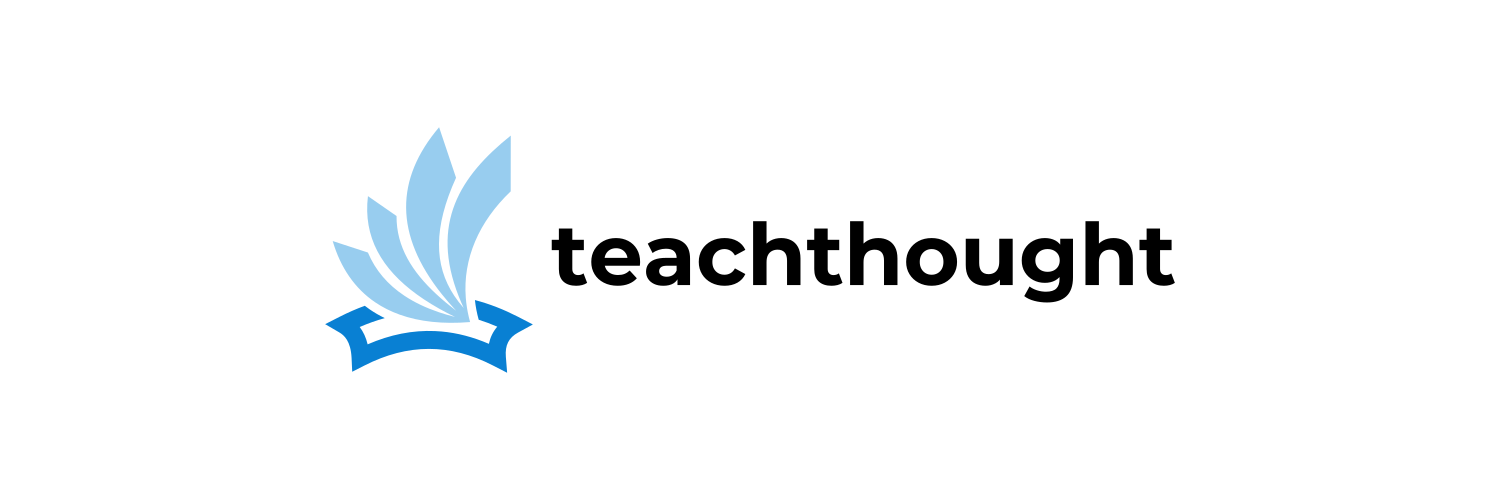
20 Types Of Questions For Teaching Critical Thinking
What are some of the most common types of questions for teaching critical thinking? This led to many dozens of answers.
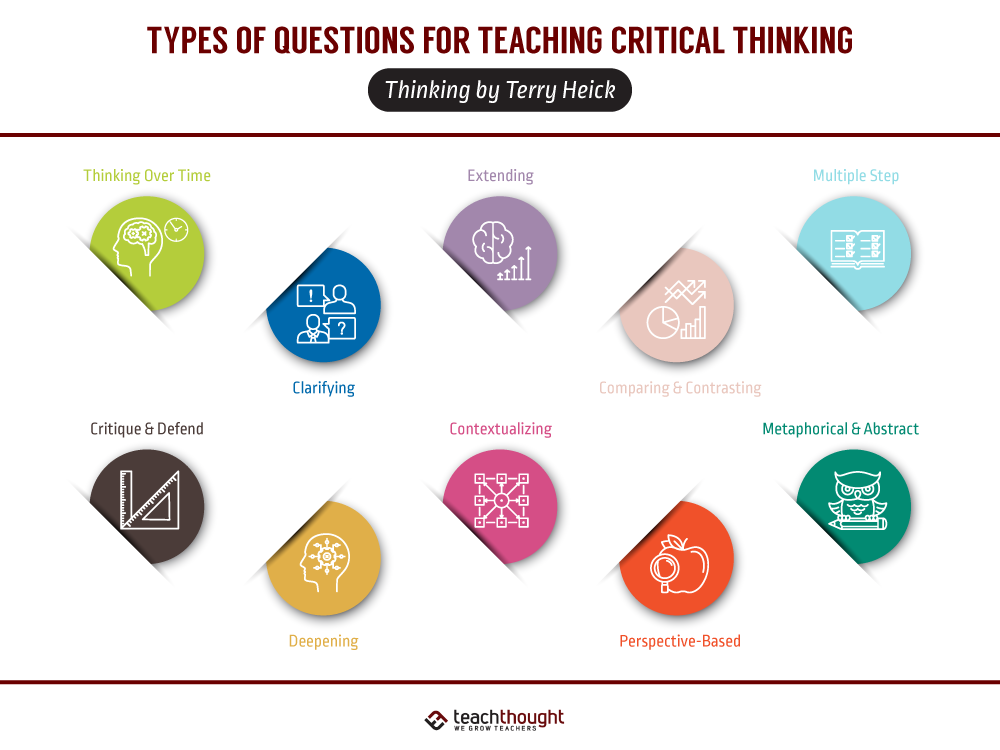
What Are The Best Questions For Teaching Critical Thinking?
by Terry Heick
What are the different types of questions? Turns out, it’s pretty limitless.
I’ve always been interested in them–the way they can cause (or stop) thinking; the nature of inquiry and reason; the way they can facilitate and deepen a conversation; the way they can reveal understanding (or lack thereof); the stunning power of the right question at the right time.
There’s a kind of humility to questions. Someone who doesn’t know asks someone who might. Or even someone who does know (rhetorically) asks someone who doesn’t to produce an effect (rhetorically). There’s a relative intimacy between someone asking and answering questions, one that says, ‘We need one another.’
It’s from that kind of perspective that TeachThought was founded, so it was surprising to me when I realized recently that, after years of writing about questions and questions stems and the power of questions and so on, I hadn’t ever written about the types of questions.
After doing some research, I realized that identifying clearly what the ‘types of questions’ are isn’t easy because there isn’t a set number. Much like when I wrote about types of transfer of learning or types of blended learning , it was clear that although I kept seeing the same categories and question types, there really wasn’t a limit. When I asked myself, ‘What are the different kinds of questions?’ I was asking the wrong question.
A slight adjustment: What are some of the most common types of questions? What are the categories of questions? What are the most common forms of questions? This led to many dozens of answers. There are dozens of types of questions and categories of questions and forms of questions and on and on and on. An entire book could be written about the topic (if not a series of books).
But we have to start somewhere, so below I’ve started that kind of process with a collection of types of questions for teaching critical thinking –a collection that really needs better organizing and clearer formatting. Hopefully I can get to that soon.
Let’s start out with some simple ones.
Common Types Of Assessment Questions
Multiple-choice/Single : A question with multiple available answers for the responder to choose from but only one correct solution
Multiple-Choice/Multiple : A question with multiple available answers for the responder to choose from and more than one correct solution
See The Problem With Multiple-Choice Questions
True-or-false : A statement that the responder must decide is ‘true’ or ‘false’
Fill in the blank : A statement with a key piece of information missing that the responder must add to make the statement complete and true
Matching : Most commonly, Matching Questions have two columns and each column has items categorized by a clear rule that must be matched to items on the opposing column. For example, the column on the left can have words and the column on the right can have definitions. Other possibilities:
Left Column/Right Column: Inventors/Inventions; Forms of Government/Strengths and Weaknesses, Geometric Shape/Formula to calculate area; etc.
A variation of the Matching Question has one column holding more items than the other. This generally makes the question more complex–or at least more difficult–as the responder can’t be sure all items are used and must be more selective. Deductive reasoning (process of elimination, for example) is less accessible to the responder.
Short-Answer : This is less close-ended than the above common assessment questions types. In a short answer, the responder must answer the prompt without the benefit of any additional information or possible answers.
Analogies : These aren’t exactly a type of ‘question’ but analogies excellent assessment tools and can be used in many of the other forms of questions–multiple-choice for example.
Pig : Mud :: Bird: _____ (simple)
Pig: Mud :: Mitochondria: ___ (less simple)
What Are The Different Categories Of Questions?
This one isn’t simple or standardized either. There are simply too many different ways to think about inquiry.
You could, for example, use every level of Bloom’s Taxonomy and say that there are ‘Evaluation-level questions’ and ‘Analyze-level’ questions and ‘Remember’ and so on. A lot of this comes down to function: as a teacher, what are you wanting the question to ‘do’? With that in mind, let’s look at just a few examples (this is by no means an exhaustive list).
The Definition of Factual Questions: Questions with unambiguous, more or less universally accepted objective answers based on knowledge.
The Definition of Interpretive Questions : Questions meant to interpret something else –a comment, work of art, speech, poem, etc. The emphasis here is on the thinking process and will often result in an improved understanding of that ‘other’ (rather than demonstrating knowledge as is the case in a Factual Question. Responses to Interpretive Questions should be evidence-based but are inherently subjective, open-ended, and ongoing.
The Definition of Evaluative Questions : Questions that emphasize one’s personal opinion–of the value of a law or the strength of an author’s thematic development, for example.
Analytical Questioning and Didactic Questioning are common forms of questioning and inquiry whose role is simple and whose patterns are clear and plain enough to see and follow.
The Definition Of Analytical Questions: Questions meant to understand–to identify the ‘parts’ and understand how those parts work together and depend on and affect one another. Analytical Questions depend on other higher-level thinking skills like classifying, attributing, and organizing by rules or other phenomena.
An example of an Analytical Question might be to ask a student about character motivation in a novel or how science drives technology–“What is the protagonist’s motivation in the story and how do we know?” or ‘Why was this event important?’.
The Definition Of Didactic Questions: Structured, formal questions commonly about facts and knowledge at the recall and comprehension level, including remembering, describing, explaining, naming, identifying, etc.
Examples Of Didactic Questions: ‘Who, what, where and when’ can be examples of Didactic Questions while ‘Why’ tends more toward an Analytic Questions (see below).
Sidenote: Questioning And The Socrative Method
The Socrative Method is among the most well-known version of the Didactic approach, where students are (or can be, depending on how the seminar is structured) guided by ‘more knowledge others’ (MKO) personalized and extended reflection through inquiry. This, of course, can result in the thinker shedding their own dogma and reaching enlightenment.
It’s not very scalable in a classroom with one teacher and 34 students, which is where the Socrative Seminar comes in–a ‘built-for-the-classroom structure to bring learning-through-questioning’ into traditional educational spaces. This Socrative Seminar (or ‘Method’) is a formal approach to inquiry-based conversation where open-ended questions are used to facilitate discussion by students who respond to prompting from the teacher or comments and questions from other students. It’s not exactly a ‘type of question’ but is a format to use questions to promote understanding in a classroom.
This method is dialectical and dialogic, depending on the ability of students and teachers to be able to verbalize often complex and abstract thinking. A ‘good’ question in a Socrative Seminar would be much different than a ‘good’ question on a criterion-referenced assessment. What is a ‘good question’?
The quality of a question, then, is highly contextual–and to answer it with any clarity, you have to be able to answer: For that student in that situation at that time, what did that question do ? What was the effect of that question?
See also ‘ The Relationship Between Quality And Effect .’
Types Of Questions For Teaching
Clarifying Question : A question meant to clarify something–either a question asked by the teacher to clarify the answer a student gives or what the student thinks or a question asked by the student to the teacher to clarify something (a statement, a task, a question, etc.)
Probing Questions : A probing question does what it sounds like it might: Serves as an inquiry tool to explore a topic or a student’s thinking and existing understanding of a topic. Probing questions also have different forms, including Emphasizing, Clarifying, Redirecting, Evaluative, Prompting, and Critical Analysis.
Thinking Over Time Questions : Questions that reflect on an idea, topic, or even question over time. This can emphasize change over time and lead to cause/effect discussions about the changes. This can also focus on metacognition–one’s thinking over time and how it has changed, etc.
Extending Questions : Questions meant to continue to lead a discussion, assessment, or ‘learning event,’ often after a ‘successful’ event immediately prior. For example, if a student is asked a question about adding fractions and they answer successfully, the teacher can ask an ‘Extending Question’ about adding mixed numbers or decimals.
Deepening Questions : Similar to Extending Questions, a Deepening Question increases in complexity rather simply extending what’s been learned. In the scenario above, after answering the question about adding fractions, a teacher could ask how exponents or the order of operations might affect adding fractions.
Transfer Questions : Questions meant to ‘laterally’ extend an idea without necessarily becoming more complex. If discussing the orbit of Saturn, you could ask an ‘Extending Question’ meant to take knowledge gleaned from that discussion and apply it
Contextualizing Questions : Questions meant to clarify the context of a topic/question/answer rather than to elicit an ‘answer.’
Perspective-Based Questions : Questions focused on the effect perspectives have on answers and/or ‘truth.’ Perspective Questions can also be asked from specific points-of-view–a student could answer a question about government from the perspective of a modern citizen, citizen of an ancient culture, famous historical figure, specific political party, etc.
Concrete Questions : Usually a ‘close-ended’ question, Concrete Questions ask students to provide ‘concrete’ answers–names, quantities, formulas, facts, characteristics, etc. See the following item for an example.
Metaphorical & Abstract Questions : The opposite of Concrete Questions, Abstract Questions intended to draw attention to or more closely understand abstract ideas or the abstraction in non-abstract ideas.
These can also be thought of as Thematic or Conceptual Questions. For example, asking a student to identify the three branches of the US government would be a ‘Concrete Question’ while asking them to describe, from their perspective, the virtues of democracy or how ‘freedom’ affects citizenship are examples of Perspective-Based Abstract Questions.
Compare & Contrast Questions : Questions that–you guessed it–ask students to identify the way two or more ‘things’ (concrete or abstract, for example) are the same and different.
Claim/Critique & Defend Questions : Questions (or prompts) that ask students to make a claim or issue a ‘criticism’ (e.g., of an argument), then defend that claim or criticism with concrete evidence.
Cause & Effect Questions : Another more or less self-explanatory category, Cause & Effect Questions require students to separate cause from effect or focus on mostly causes or mostly effects. These can be Concrete or Abstract, or Perspective-Based as well.
Open-Ended Questions : Often subjective questions meant to promote conversation, inquiry, etc. Open/Open-ended questions are central to Socrative Dialogue (though closed/yes or no questions can be just as effective at times because questioning is an art).
Closed Questions : Questions with yes or no answers generally used to check for understanding, emphasize an idea, or uncover information
Leading Questions : Questions meant to ‘lead’ the thinking of the responder in a specific direction for an intellectual or psychological effect
Loaded Questions : Questions embedded with an underlying assumption–one that might contain faulty reasoning, bias, etc. This question is characterized by those faulty or otherwise distracting assumptions rather than the assessment or answer.
Dichotomous Question : A type of Closed Question with only two answers (generally Yes/No)
Display Questions (Known Information Question): A way to check for understanding; a type of question that requires the answerer to ‘perform’ or demonstrate their understanding by answering a question the questioner already knows the answer to.
Then there are Referential Questions : An inherently subjective question, Referential Questions produce new information and can be either open or closed-ended questions.
An Example of a Referential Question: Which character in Macbeth would be most likely to be a successful YouTuber (or ‘streamer’) today?
Rhetorical Questions : A question asked to create some form of effect rather than produce an answer. These are useful in discussions but can also be used in writing as well. After all, who is going to answer a question posed by an author in an essay?
Epistemic Questions : Questions about the nature of knowledge and understanding. This is more of a content-based category rather than a universal ‘type of question,’ though asking students about the nature of knowledge in math or science–how we form it, how we know if it’s accurate, the value of that knowledge, etc.–can be used in most content areas.
Divergent Questions : According to Wikipedia , a divergent question is a “question with no specific answer, but rather exercises one’s ability to think broadly about a certain topic.”
Inductive Questions : Questions meant to cause or induce the responder to form general principles theories based on observation, evidence, or data. In inductive reasoning, the conclusion or argument becomes more general than the premises that prompted it.
Deductive Questions : Questions meant to support the responder in forming a the given theory based on continued testing. In deductive reasoning, the conclusions drawn are less general (i.e., more specific) than the premises given and in a valid deductive line of reasoning, the conclusion must be true if the premises are true.
5 Ws Questions : Wonderfully simple and devastatingly effective questions: Who, What, Where, Why, and When? And you can add ‘How’ to the list, too. These include Who, What, and Where questions? These can be useful in guided discussion, reflection prompts, the formation of essential questions , and more.
Examples Of Using ‘5 Ws Questions’ For Critical Thinking
What’s the point?
What’s the big idea?
What’s the purpose?
What is the process?
What’s more important here? Less important?
What crucial information are we missing?
What did they think or believe and how did that belief change over time? What contributed to that change?
Why should I learn this?
What should I do with what I’ve learned?
What is the author, speaker, write, or artist ‘saying’ here? What are they underlying assumptions of that message?
What is the author’s point of view? What do I believe and how does that affect what I think others believe–or how does it affect what I think about what they do believe?
What should I ask about this?
How can I improve the questions I or others have already asked?
Is the answer wrong or is the question ‘wrong’?
Education Expert
Founder & Director of TeachThought
- Published on February 10, 2018
- February 10, 2018
Critical Thinking Questions That Will Blow Your Mind

Jump to section

What would it be like if every decision you made didn’t involve your personal feelings or over-emotional reactions? What if your perspective was always balanced and decisions completely informed? Is it not time that you used critical thinking questions to become the more levelheaded, cool, and calm person you want to be?
Being a critical thinker enables you to take a neutral perspective on an idea or scenario and gives you the power of true choice. Being free from manipulation or emotional ties to your decision will allow you to make the most beneficial choice in any circumstance.
In critical thinking, we are taught to question everything. However, the question behind the question is; what questions should you be asking? Before we go into the critical matter of the exact questions, we should first look at the manner in which these critical thinking questions should be asked. After this article, you will be a wizard at asking critical thinking questions.

The Standard of Questions You Should Ask
Although the actual questions will be very important to critical thinking, the emphasis and purpose of these questions will determine how effective the questions will be. You must first know how to question before you know what and which critical thinking questions to ask.
1. Open-ended questioning
As a critical thinker, you cannot allow whomever or whatever you are questioning to give you the smallest amount of information for your questions. Yes or No answers can really drag out the process of getting the answers and information that you want.
Asking questions that will not only give you the answers you are looking for but also open up a heap more information than you were searching for. Ask open-ended questions such as the following:
- “What is the purpose of this scenario?” Instead of: “Is this the purpose of this scenario?”
- “What is your favorite thing about this scenario?” Instead of: “Is this your favorite thing about this scenario?”
2. Avoid leading questions
Being a critical thinker is about escaping your bias and seeing things outside of your personal perspective . It is thus very important to avoid leading the question, in an area you want it to go.
Keep your questions as neutral as possible and don’t allow any definitive language to creep into the question. Such as using the following:
- “What is your take on the healthiest diet there is?” Instead of: “Don’t you think the vegan diet is the healthiest diet?”
- “What is the condition of the country at the moment?” Instead of: “How bad is the condition of the country at the moment?”
3. Specify the boundaries of your questions
As much as leading a question can be a hindrance to what you want, so can leaving the question too open, and invite unnecessary information to be given. Critical thinking is about being objective, but it still needs a direction and focus in which you apply your critical thinking.
Make sure that you set up an accurate framework in which your questions can be answered. Being too broad makes the process of getting answers inefficient and drawn out. Try asking questions like:
- “Who is your favorite male tennis player in the United States?” Instead of: “Who is your favorite tennis player?”
- “If you could live anywhere in South East Asia, where would that be?” Instead of: “If you could live anywhere, where would that be?”
4. Funnel the questions until you get the answer you were looking for
When questions remain shallow, it is easy for the sources of information you are questioning to mislead and avoid giving you the information that you want.
Do not set up the path of questions beforehand, but rather make sure that you dig deeper after each question in the direction of information that you really want. Once you have your answer, then move back to broader questioning in order to get a better picture of the whole once again.
5. All the answers to your question must be based on facts and well supported from many different sources
Make sure that you don’t give into hearsay. Find the studies, the science, and ample testimonials before you accept the information that you have been given.
Look into many different and unrelated sources to see if the information matches up. Look at the other side of the argument and validate their claims.

Methods of Critical Thinking Questions
1. the 5 w’s and the h.
These are the absolute basics of critical thinking. The Who, What, Where, When, Why, and How are foundational questions that are taught over and over in journalism, investigation, and research.
They are the base from which every critical analysis should be created. You would apply these questions as follows:
- …would benefit?
- …would this harm?
- …is responsible?
- …has researched this before?
- …is the other perspective?
- …would be the challenges?
- …are the strengths?
- …is the key subject?
- …would this problem reside?
- …are there similar situations?
- …can more information be found?
- …can this be improved on?
- …is this acceptable and unacceptable?
- …could this be implemented?
- …would we be able to measure the results?
- …is it time to stop this action?
- …is this a problem?
- …is this relevant?
- …should this be known about?
- …is there a need for this?
- …is this different from anything else similar to it?
- …it functions?
- … is this the truth about it?
- …could it harm anyone?
2. Agenda and method questioning
These two areas of questioning may have already been covered through the 5 W’s and the H. However, it is beneficial to emphasize the angle from which this questioning comes.
The first one is questioning the agenda. This is aimed at figuring out how people could benefit from a situation or idea. This agenda can place all the information received in context.
For instance, if a company was contributing to a charity and their agenda was to improve their image against the damage done by that company, then the contributions would be much less charitable and much more about publicity.
Questions that would help clarify the agenda would be:
- What is the person or organization involved trying to accomplish?
- What issues or problems are raised by the person or organization involved?
- What data, what experiences, what evidence is given?
- Is the person or organization involved thinking about the environment?
- Is the person’s or organization’s thinking justified as far as we can see from our perspective?
- And how do they justify it from their perspective?
- How can we enter their perspective to appreciate what they have to say?
The second aspect of this is questioning the method. As a critical thinker, this makes the outcomes of every situation and idea questionable, which is exactly the point of critical thinking.
Too many times the outcome of a specific method is the focus of debate, without clarifying if that outcome has validity.
Questions that would help clarify the Method would be:
- I s the person or organization involved willing to fundamentally rethink their methods of creating a certain outcome?
- Has the person or organization involved thought about how the method will work going into the future?
- To what extent has the method been tested?
- Is there any other method that could be used to produce this outcome and what would be the implications of this method?
- Is the person or organization involved willing to allow this method to be tested?
- In what other situation has this method been used and how effective was it?
3. Inquiry process
The inquiry process is exactly that; a process. It does entail certain questions but the power of this process resides in the way the process is conducted.
This process is the standard of research and creates an order in which you can follow, uncovering the information that you seek. Although the terminology may change for each step of the process, the essence of what needs to be done remains the same.
The process is divided as follows:
- Ask (Pose Question)
- Investigate (Find Resources)
- Create (interpret/ Synthesise)
- Discuss (Report findings)
- Reflect (follow the process backward)
4. Bloom’s taxonomy
Bloom’s taxonomy was created by Dr. Benjamin Bloom , a psychologist in the 1950’s. Bloom’s work was to create a better form of learning through more focus on analysis and evaluation.
Bloom’s taxonomy is very much Maslow’s hierarchy of needs to critical thinking. The original Bloom’s taxonomy encompasses:
- What is the subject?
- When did it happen?
Comprehension:
- How would you compare the subject?
- Explain the subject in your own words?
Application
- What examples can you find of the subject?
- What approach would you use to solve the problem?
- What inference can you make from the information?
- How would you classify or categorize the subject?
- How would you compare the information?
- What was the value or importance of the information?
Creation or Synthesis
- Can you propose an alternative interpretation of the information?
- What might happen if you…?

Bloom’s Taxonomy has since been revised. In 2001 a group of cognitive psychologists, curriculum theorists and instructional researchers, and testing and assessment specialists change the titles of each level to make a more dynamic approach to the system.
The titles were revised to:
- Recognizing
- Recalling
- Interpreting
- Exemplifying
- Classifying
- Summarizing
- Inferring
- Comparing
- Explaining
- Executing
- Implementing
- Differentiating
- Organizing
- Attributing
- Checking
- Critiquing
- Generating
- Planning
- Producing
In the process of the revision, the authors broke the knowledge area into its own taxonomy:
Factual Knowledge
- Knowledge of terminology
- Knowledge of specific details and elements
Conceptual Knowledge
- Knowledge of classifications and categories
- Knowledge of principles and generalizations
- Knowledge of theories, models, and structures
Procedural Knowledge
- Knowledge of subject-specific skills and algorithms
- Knowledge of subject-specific techniques and methods
- Knowledge of criteria for determining when to use appropriate procedures
Metacognitive Knowledge
- Strategic Knowledge
- Knowledge about cognitive tasks, including appropriate contextual and conditional knowledge
- Self-knowledge
If you want to know more about the reasoning behind the revision click here .
5. Integral questioning
Integral theory was created by Ken Wilber (author of A Brief History of Everything ) and has become one of the most useful structures of evaluation in this era. The integral model is a reference structure in which you can objectively see all areas of a specific subject.
This method goes hand in glove with the practice of critical thinking. Applying the method into question form will bring out the following analysis:
Quadrants: this is the evaluation of each viewpoint of a certain subject.
- What does a specific person involved think or feel about the subject?
- What studies and tests have been done on the subject?
- What do the people as a whole feel or think about the subject?
- What does the industry of the subject say on the subject?
Lines: These are the areas of understanding of factors involved in the matter.
- What are the different areas of life expressed in this subject?
- What factors are involved in the situation or subject?
- To what area of understanding does is the subject appeal to?
Levels: This deals with a hierarchical standard of a certain area of the subject.
- To what level of understanding does is a subject appeal?
- How complex or advanced is this subject?
- What standard of knowledge needs to be obtained to understand this subject?
State: This refers to a fleeting state of being in which the subject can be seen in.
- In what state of mind was the person involved in when reviewing the subject?
- In what state of mind was the person involved in when the situation occurred?
- Is the information given contextual to a certain situation?
Types: This is a division of experiences based on traits that could affect perspective.
- How would someone who is completely different from the person involved perceive the situation?
- What different types of people were involved in the situation?
- How could this subject be received differently by a different cultural reference?
Question Everything
You now possess all that you need to start becoming a critical thinker and asking critical thinking questions. The only way to engrain the above processes and questions to become a critical thinker is to practice. You might need to refer to this article consistently at first, but after time you will become a natural and healthy critical thinker.
This video may help to ignite your passion for questioning everything:
Read more on critical thinking by checking out these related articles and resources:
- How to Solve the Biggest Problems With Critical Thinking
- Critical Thinking Examples That Wil Influence the World Around You
Take the next step: enroll for free

Discover Powerful Hacks to Unlock Your Superbrain to Learn Faster, Comprehend More and Forget Less
Join the foremost expert in memory improvement and brain performance, Jim Kwik, in a free masterclass that will dive into the one skill you will ever need — learning how to learn Enroll for free
Irina Yugay
You might also like

Get Started
- Try Mindvalley for Free
- Free Masterclasses
- Coaching Certifications
- Vishen Lakhiani
- The Mindvalley Show
- Partnerships
- In English 🇺🇸
- En Español 🇪🇸
- Editorial Standards
- © 2024 Mindvalley, Inc.
- English (EN)

Fact-Checking: Our Process
Mindvalley is committed to providing reliable and trustworthy content.
We rely heavily on evidence-based sources, including peer-reviewed studies and insights from recognized experts in various personal growth fields. Our goal is to keep the information we share both current and factual.
The Mindvalley fact-checking guidelines are based on:
- Content Foundation: Our articles build upon Mindvalley’s quest content, which are meticulously crafted and vetted by industry experts to ensure foundational credibility and reliability.
- Research and Sources: Our team delves into credible research, ensuring every piece is grounded in facts and evidence, offering a holistic view on personal growth topics.
- Continuous Updates: In the dynamic landscape of personal development, we are committed to keeping our content fresh. We often revisit and update our resources to stay abreast of the latest developments.
- External Contributions: We welcome insights from external contributors who share our passion for personal transformation and consciousness elevation.
- Product Recommendations and Affiliations: Recommendations come after thoughtful consideration and alignment with Mindvalley’s ethos, grounded in ethical choices.
To learn more about our dedication to reliable reporting, you can read our detailed editorial standards .

115 Critical Thinking Questions For Adults and Students
By: Author Tom Stevenson
Posted on Published: November 9, 2021 - Last updated: August 19, 2023
To learn how this content was created please read our Editorial Guidelines .
Critical thinking questions are a great way to help you learn and get to the heart of many matters.
These fun critical thinking questions are what you should be asking if you want to learn more and challenge your own beliefs.
Questioning what you’ve read, what you’ve learnt and your own preconceptions is a useful way to remove your own ignorance on many topics.
As a child, we asked questions about critical thinking all the time. It’s how we learn right and wrong and a variety of other things. Curiosity and questioning what we know are some of the best ways to improve your knowledge.
Whether you want to use these questions with your students or to learn more yourself, they’ll help you develop a framework to learn more about almost anything.
Table of Contents
Critical thinking questions examples.
Critical thinking questions are easy to spot. They’re questions that are worded so you can take a more in-depth look at things.
They’re similar in nature to open-ended questions , in that it’s expected the person who’s being questioned will provide a substantive answer rather than a short one.
Here are a few examples so you get the idea:
- How do you know this?
- Why does it matter?
- What are the reasons for _____?
Critical Thinking Questions Starting With ‘What’
1. What do you think you would have done if you were the person in that position?
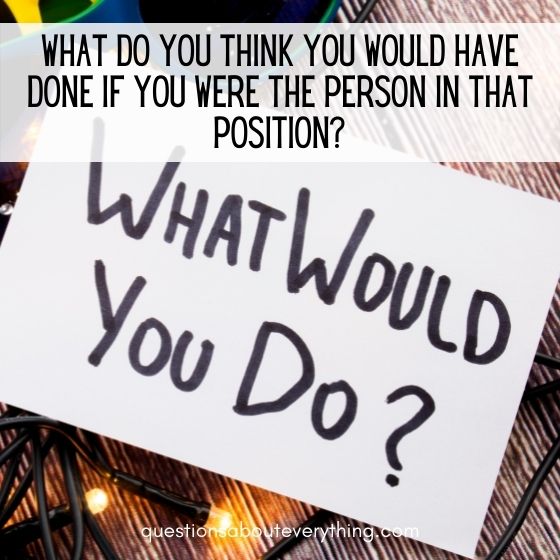
2. What did you think they meant when they said…?
3. What did you assume about them in the beginning that you were wrong about?
4. What do you think it meant when this happened…?
5. What did the evidence say about…?
6. What do you think would have happened if…?
7. What are your conclusions about…?
8. What do you think would have been a better ending to…?
9. What could have been a big twist in the story?
10. What do you think would have happened if…?
You might also like:
- Hardest questions to answer
- Ethical questions
- Philosophical questions
- Probing questions
- Questions that make you think
11. What were the strengths of this argument?
12. What do you think were the weaknesses about…?
13. What do you think that ___ meant?
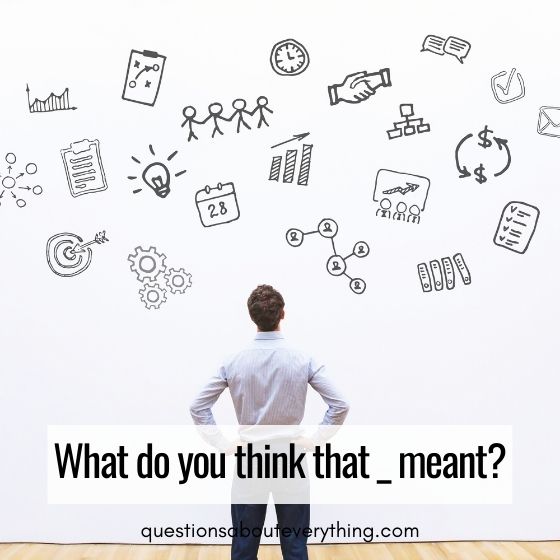
You might also like: What if questions
14. What do you think made ___ do that?
15. What do you think the reasons are for it happening in that way?
16. What do you think would have changed if ___ did _?
17. What would have been a better option for…?
18. What do you think the problem was about…?
19. What do you think you could do to solve this problem?
20. What should have happened instead of…?
21. What do you think the biggest win about ___ is?
22. What do you think will happen when…?
23. What do you think that character’s motive was in the movie?
24. What makes you come to that idea?
25. What is the point of…?
26. What do you think you would say to ___ if you had the chance?
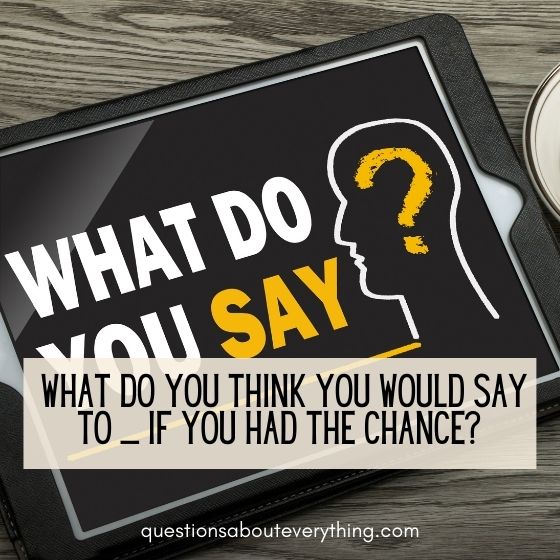
You might also like: Self-reflection questions
Questions For Critical Thinking Starting With ‘When’
27. When do you think that this became a problem?
28. When will you change your mind about…?
29. When do you think you will be ready to…?
30. When will you be able to tell if _ worked?
31. When is ___ ever acceptable?
32. When will be the right time to stop…?
33. When is the best time to start…?
34. When do you think the situation changed with…?
35. When will ___ ever happen?
36. When do you think you knew in the movie what the ending was going to be?
37. When will be the best time to have another think about…?
38. When shall we revisit…?
39. When did you realise that ___ hadn’t worked?
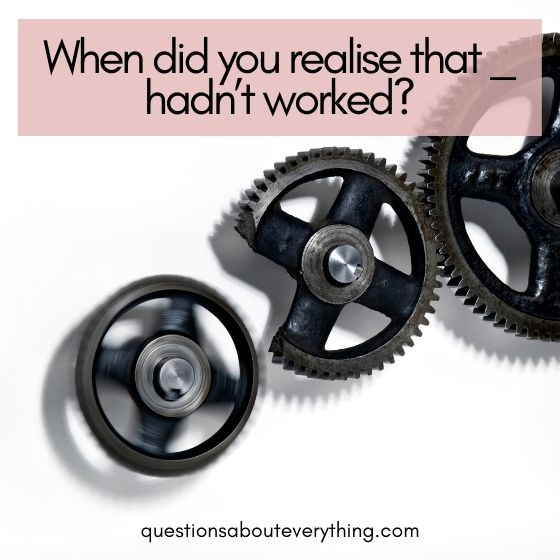
You might also like: Thought provoking questions
Critical Thinking Questions Starting With ‘How’
40. How do you feel about…?
41. How do you think _ could have been handled better?
42. How would you have responded to…?
43. How did you come to that conclusion about…?
44. How does doing ___ change…?
45. How would you feel if…?
46. How did you come to deciding…?
47. How do you think ___ might hurt..?
48. How else would you handle this in the future?
49. How do you think they ought to have responded to…?
50. How do you think you will feel when…?
51. How did this benefit you?
52. How would ___ benefit others?
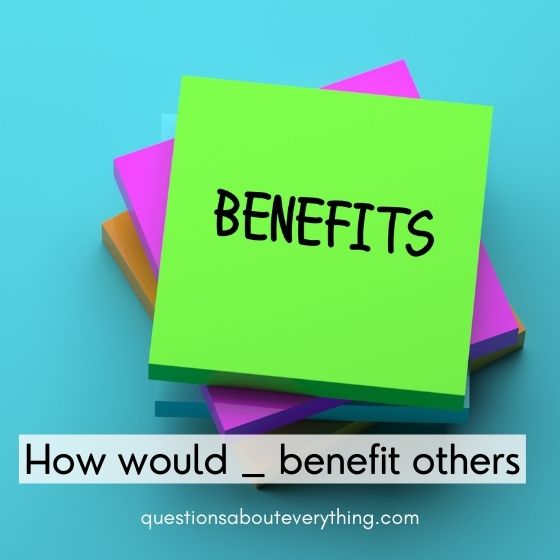
Next: Mind blowing questions
53. How is this different from other situations?
54. How would you advise them to handle it in the future?
55. How do you think they will react when they find out…?
Critical Thinking Questions Starting With ‘Who’
56. Who will be affected when this happens?
57. Who is the person that you would call on for…?
58. Who do you think will be most impacted by…?
59. Who caused the problem in ___ this situation?
60. Who wrote…?
61. Who do you think is most likely to…?
62. Who do you think will most benefit from…?
63. Who do you think was the problem in ___ situation?
64. Who caused the most harm in…?
65. Who is responsible for…?
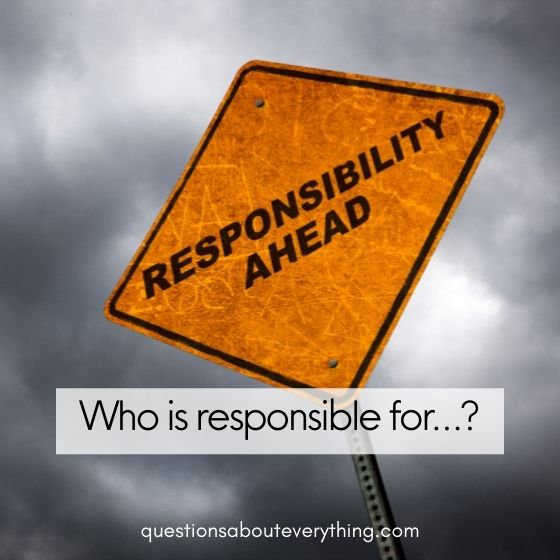
You might also like: Yes or no questions
66. Who do you think is the most crucial person for…?
67. Who would be the best person to call on for this problem?
68. Who can you count on …?
69. Who do you think would be best off staying out of…?
70. Who is the person you are most nervous about telling…?
71. Who was the happiest when they found out that…?
72. Who was the most important character in this story?
73. Who had the strongest argument for…?
74. Who do you feel was wrong in that situation?
75. Who would be the first person that you would tell about…?
Critical Thinking Questions Starting With ‘Why’
76. Why do you need to…?
77. Why do you think they chose to…?
78. Why do you think that ___ happened?
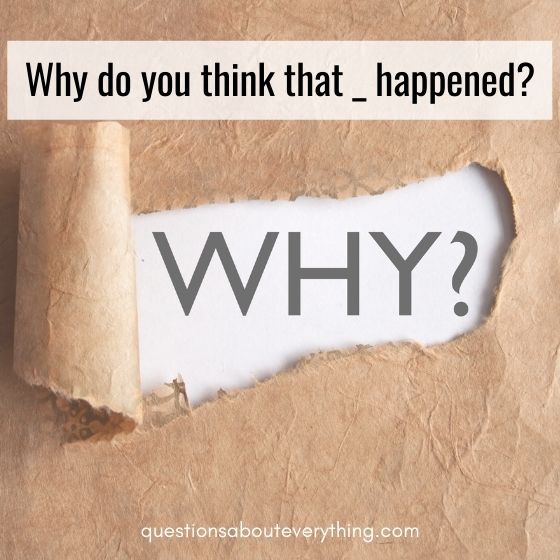
Next: Hypothetical questions
79. Why is it important to…?
80. Why do you think ___ is necessary?
81. Why do you think that they said?
82. Why do you think the author decided to add…?
83. Why is it a problem when…?
84. Why do we need to do…?
85. Why are you so…?
86. Why does this need to stop?
87. Why do you need to improve…?
88. Why do you think I am bringing this up…
89. Why do you think that ___ became a problem?
90. Why do you think it wasn’t rectified?
Critical Thinking Questions Starting With ‘Where’
91. Where has this happened before?
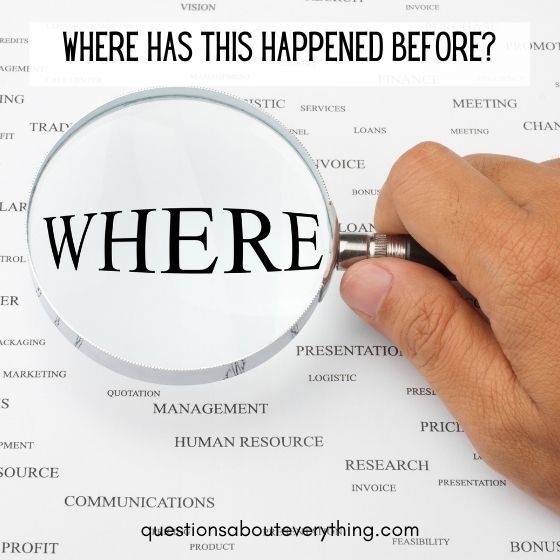
You might also like: Unanswerable questions
92. Where do you think we would be if…?
93. Where did the story begin to alter?
94. Where can we give our attention to…?
95. Where can you get more information about…?
96. Where do we need to improve?
97. Where would we find the solution for….?
98. Where did they find the solution?
99. Where do you think that ___ got complicated?
100. Where could we ask for help with…?
101. Where would you have done things differently?
102. Where would you seek answers to these problems?
103. Where do you think would have been the best place to stop?
104. Where would you advise we focus next time we…?
105. Where do you think it went wrong?
Critical Thinking Questions For Interviews
106. Tell me about a time you had to use your initiative to solve a problem
107. How would you handle a situation when you’ve noticed a superior makes an error?
108. What would you do if a colleague came to you with an unusual suggestion to improve the business?
109. Have you ever anticipated potential problems and stopped them before they became an issue?
110. How quickly do you make decisions?
111. How do you handle disagreements between colleagues?
112. Have you ever convinced managers or your superiors to take your approach on solving a problem?
113. How would you solve a disagreement between a customer and a colleague?
114. What would you do if a customer came to with an issue while you were talking to a colleague/superior?
115. What would you do if you had a deadline approaching you knew you wouldn’t be able to meet?
Looking For More Questions?
Existential Questions – Questions that will make you think about life, the universe and many other deep topics.
Trick Questions – If you want people to start thinking but in a fun way, these questions are perfect!
10 Critical Thinking Questions You Can Use to Solve Everyday Problems
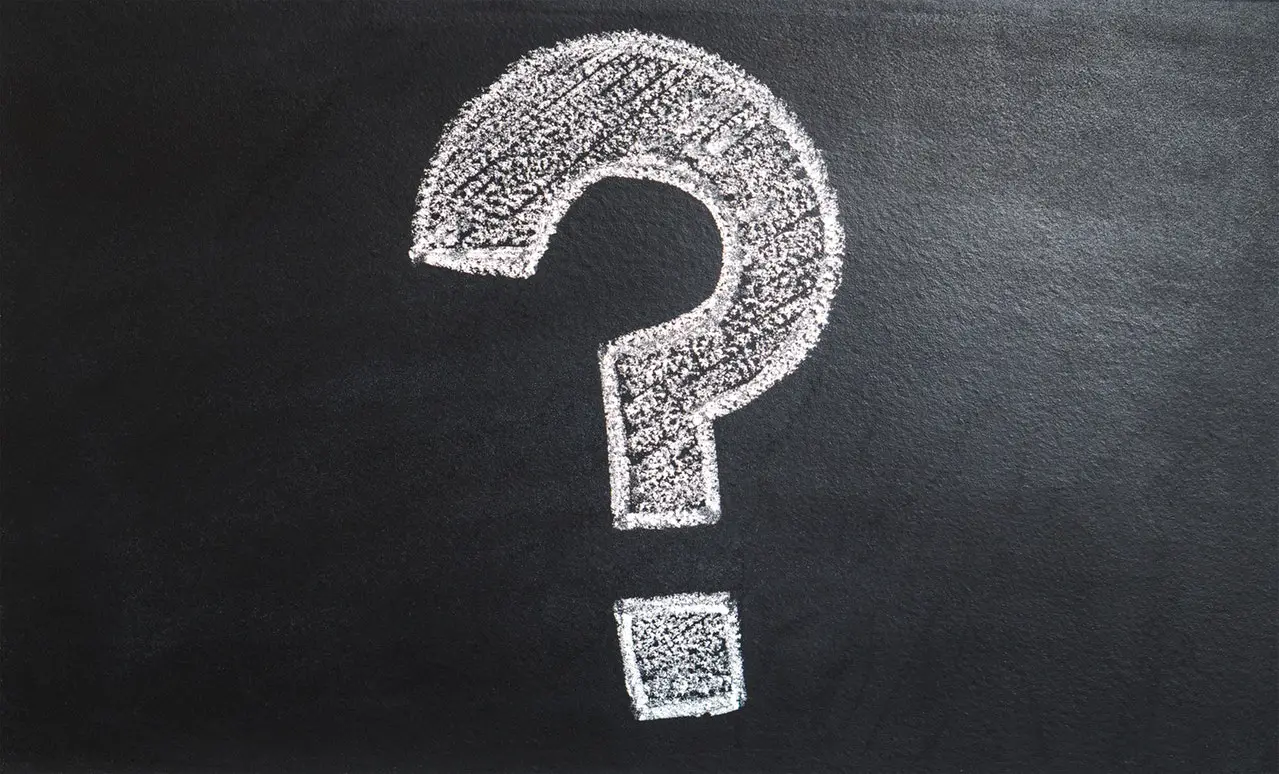
Critical thinking implies a systematic evaluation of a situation that needs reacting. It can help you arrive at the best possible solution. In essence, it’s about asking the right questions to avoid taking on problems with a devil-may-care attitude.
Critical thinking takes persistence and practice. So don’t worry if you didn’t nail it the first time. The search for better opinions, decisions, or judgments is not an easy task.
What is the problem?
It might sound obvious, but many people find it hard to pinpoint exactly what they are dealing with. Basically, the premise of this question is that you can’t find a sound solution if you aren’t clear about what is causing your stress and anxiety. So, how can you determine exactly the challenge you’re facing?
Be specific and concrete. Write every detail possible in order for you to be more insightful about your problem. It is also important to stick with facts. Avoid writing opinions otherwise, it makes the problem harder to solve.
What do I want to achieve for this problem?
Of course, this doesn’t mean that you should abandon the idea of achieving happiness. What you want to do is to explicitly determine what constitutes as “happy”. List the things that you associate with happiness and figure out which are achievable.
When do I want to solve my problem?
Relating to question two, realistic goal is something you can achieve within a specific time frame. Know exactly when you want to achieve it. Is it this week? Next month? Write it down to its specifics.
Can I achieve this in my given environment?
Going back to achieving happiness, you might want to consider the conditions of your life. Can a change of scenery help you achieve your goal? Is your environment making your problem worse? Notice that your answers are critical in finding the right solution to your problem.
What are my weaknesses and strengths?
What are the possible solutions.
Now that you know your problem, goal, and assets you can now move on to finding the best solution. At this point, you shouldn’t shy away from creating multiple solutions. In fact, it is best if you have a variety to choose from.
What is the best course of action?
It is important to remember that there isn’t a perfect solution. If you find yourself stuck, learn to reflect or choose another way to solve your problem.
Why is it not working?
Did i solve my problem.
At this point, you should feel less anxious. Your problem should be gone. But before you celebrate, take a moment to reflect.
Have I learned something from myself?
Learning from your experience can help you gain new insights about yourself. Answering this question can make you aware of the changes your in behavior in approaching problems. It can help you improve as a critical thinker.
The Importance of Practice
You may also like, thinking vs. critical thinking: what’s the difference, 7 critical thinking strategies for analyzing news and media: enhancing your media literacy, what does critical mean in critical thinking, what is the watson glaser critical thinking test an overview, download this free ebook.
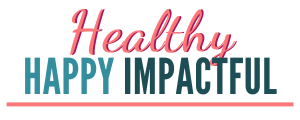
150 Fun Critical Thinking Questions For Kids, Teens, & Adults
Critical thinking questions for kids get them thinking and questioning. To go beyond rote learning.
The reason they excel later in life will not be based on the information they memorized. But instead on how well they think, make decisions, communicate, and use their creativity.
These questions are designed to help them build these essential skills.

What makes a good critical thinking question?
Open ended questions are perfect for encouraging critical thinking and problem-solving. Kids (and grown-ups) have to think about their answers. Below you will find the best age-appropriate examples to use in the classroom, at home, or during your everyday routine .
In fact, there’s no question about it. Critical thinking is important for kids. And adults too!
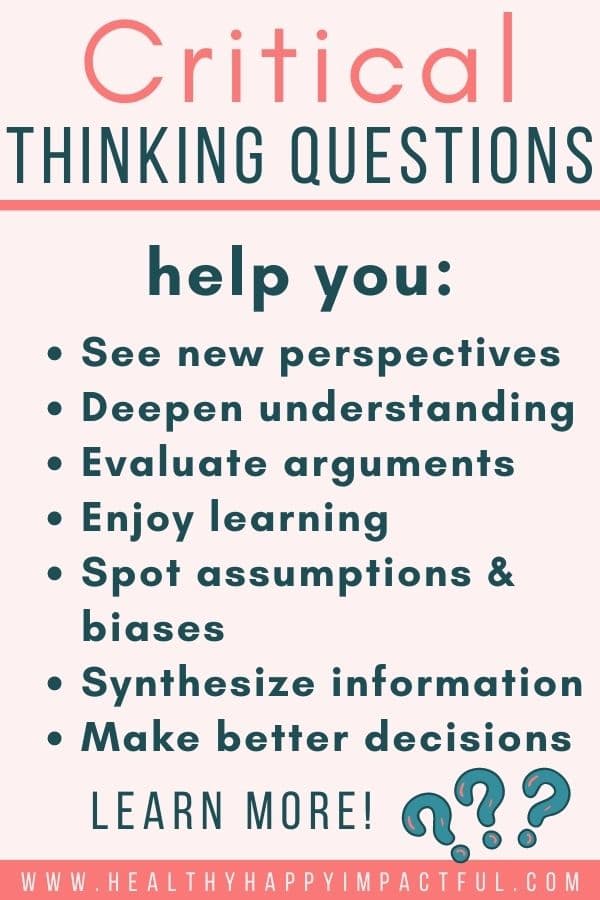
Good Questions For Kindergarten To Think Critically
Younger kids need more concrete questions. These critical thinking questions will help them use reasoning and think deeply, even when they are small.
1. How do you know if something was a good decision?
2. How are these two things similar?
3. What are the differences between _______ and _________?
4. How would you feel if __________?
This question is great for building empathy .
5. Who was the main character? Why do you say that?
6. When is ___________ a problem?

7. What is the problem?
8. Why is this a problem?
9. What did you notice about _________?
10. Do you think he/she sees this the same way you do? Why or why not?
11. Has this happened before?
12. Do you think it will happen again? Why do you think this?
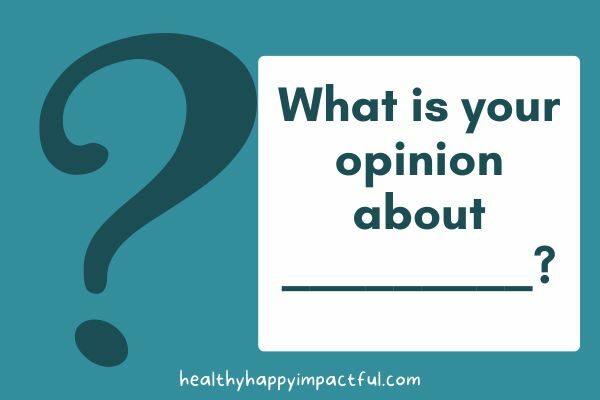
13. What is your opinion about _________? Why?
14. Is this appropriate? Why or why not?
15. What do you think would happen if __________?
16. What caused this to happen?
17. Do you think the world would be better if __________?
18. If you were in charge, what would you do differently?
19. Where can you find out more about this?
20. What does ______ mean?
21. Do you agree?
22. Can you give me an example of ________?
23. How do you know?
24. How would you solve this problem?
25. What makes something weird? What makes something normal?
Questions For Students: Elementary Through Middle School
For this age of kids, use any of the examples above and try these more abstract critical thinking questions too.

26. What do you think was the turning point?
27. Is there evidence to support your opinion (or decision)?
28. What does the evidence tell you?
29. What do you think would have been a better ending to… (book, movie, story)
30. When is the best time to start this?
31. When you think about solving a problem, where do you like to start?
32. What character/person changed the most? Why do you think this?
33. How could the author have created a thrilling twist in this story?
34. Who could help you with this? Why would they be a good fit to help?
35. Why is this important?
36. Why do you think ________ said that?
37. Why did the __________ (author, speaker) write/say this?
38. How does an idea grow? Or how does someone get from being a beginner to being an expert?
39. Do you think that what happened is what they meant to happen?
(Often, results are different than what people first think they will be.)
40. What can you use to help you decide?
41. What are the pros and cons of this?
42. Why is this happening?
43. What is the main message from this? (Or the lesson learned?)
44. What would you ask the author (speaker, etc.) if you could?
45. Do you have any questions about this?
46. Do you think it is too good to be true?
47. Can you defend these actions?
48. Compare this with this.
49. What would the world be like if ________? (kids were in charge, the sun was farther away, etc.)
50. Do you think there is a better alternative?
51. Is this person trustworthy? Why or why not?
52. At what age does someone stop being a kid? Why?
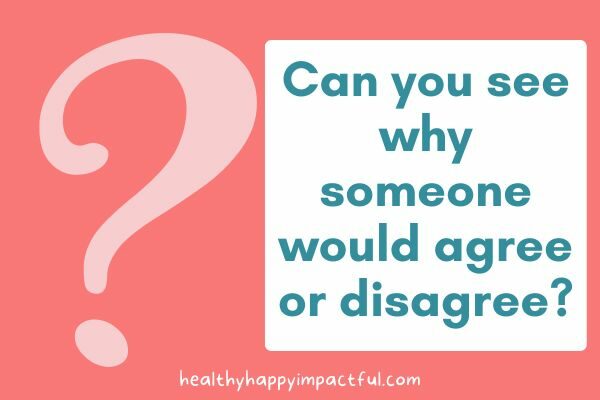
53. Can you see why someone would agree or disagree?
54. How would this ________ benefit or help others?
55. How will you know if your idea worked?
56. What is wrong with this situation?
57. What is good in this situation?
58. If someone were to argue your point, what do you think they would say?
59. Why do you think the character/person did that?
60. Is this fact or opinion? How do you know?
61. Was this change for the better? Or did it make things worse?
62. Who is most likely to _________? Why?
63. What do you think are the consequences of this decision?
64. Do you think we are asking the right question(s)? What is a different question instead?
Related Posts:
- Best Thought-Provoking Questions
- Deep Questions For Kids & Adults
- Philosophical Questions To Ponder With Kids
Critical Thinking Questions For High School & College Students
These critical thinking questions are more complex. They encourage abstract thinking, plus explore logic, ethics, and reasoning.

65. Why did you make that decision?
66. How did you get to that decision? What was your thought process?
67. What are the advantages of this?
68. What are the disadvantages of this?
69. How could we make this (project, paper, etc.) better?
70. What do you think the problem is….?
71. What do you think the best solution for this is? Why?
72. Could someone interpret this differently? How so?
73. How would you explain this to someone who doesn’t know anything about it?
74. What are a few alternative possibilities? Are any better than the others?
75. What are the short-term implications of this decision?
76. What are the long-term implications of this decision?
77. How would you achieve a big goal ?
78. (After they come up with a solution to something) Are there other possible ways to solve this problem?
79. How can you use the pros and cons to make a good decision?
80. Do you think when many people do something, it seems more “right,” even when it isn’t?
81. What are the potential risks to this decision?
82. What are the strengths of this argument?
83. What are the weaknesses of this argument?
84. Where is this lacking in evidence?
85. What can this story teach us about life?
86. Where would this solution work? Where would it not work?
87. Why do you think it is important to ask this question?
88. Why are new ideas important in our society?
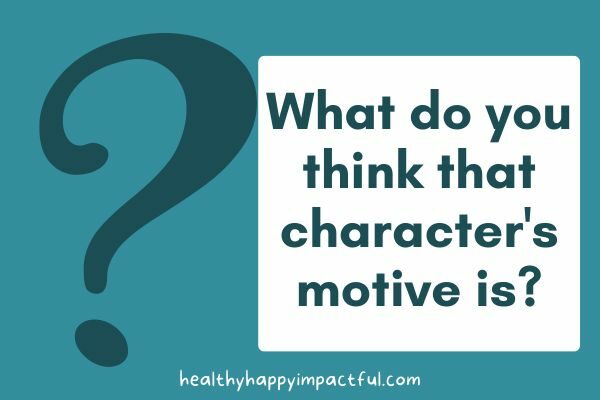
89. What do you think that character’s motive is?
90. When should you reevaluate your initial thoughts/decision?
91. Do you think this is an important issue?
92. What do you think should have happened instead?
93. What is the counterargument?
94. Why is this relevant?
95. Do you think ________ will ever happen?
96. If it does, who would it affect most? Why?
97. What assumptions are being made in this situation?
98. Is it ever ok to lie?
99. Why do you think this feels like __________?
100. How is this related to your values and beliefs?
- Best Topics To Discuss With Others
- Ice Breaker Questions To Get to Know Someone
- Best Questions To Ask Teens
Critical Thinking Questions For Adults
These are great for a conversation at home or at work interviews to see how well potential candidates think on their feet.
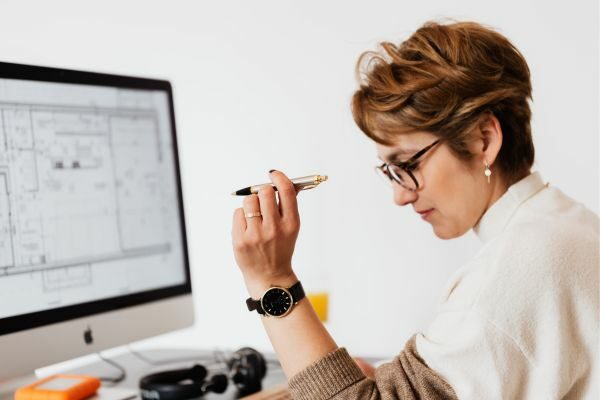
101. Where do you see strengths?
102. Where do you think there are areas for improvement?
103. Why did these things help you in the long run?
104. What information do you need to find out before making a good decision?
105. If you could sit down and have dinner with anyone in the world, who would it be? Why?
106. What would you say to this person?
107. Should others care about this? Why?
108. When should you ask for help?
109. Who will benefit most from this decision?
110. Who will benefit least from this decision?
111. Have we considered all the options?
112. What questions do you have?
113. Are there any biases that you think are playing out here?
114. Are you making an assumption about __________?
115. When will you see your results?
116. Where do you often find this type of problem? Why?
117. In your opinion, what caused ____________ to happen?
118. Was it avoidable?
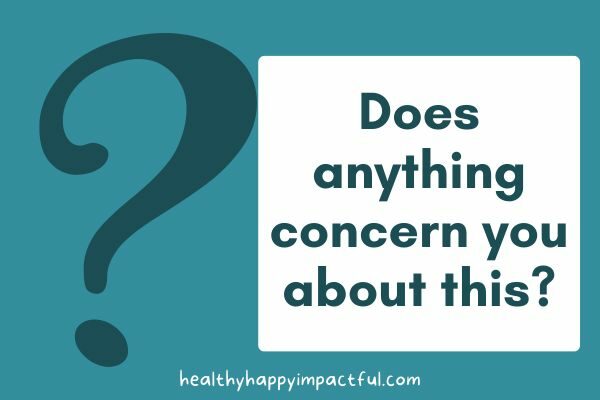
119. Does anything concern you about this?
120. When is this acceptable?
121. When is this not acceptable (or appropriate)?
122. What is one thing that would have changed everything?
123. When do you think this will benefit _________ (the company, society, etc.)?
124. When a disagreement happens at work, what do you do?
125. Is this goal achievable ?
126. How does your work experience help you fill this role?
127. Has this ever been done before? When?
128. What would need to happen for you to reconsider?
129. When will we need this?
130. What skills fit well with this position?
Related: Fun Rapid Fire Questions To Ask
Examples of Kids Critical Thinking Questions: By Word
Another way to split up your critical thinking questions is by word.
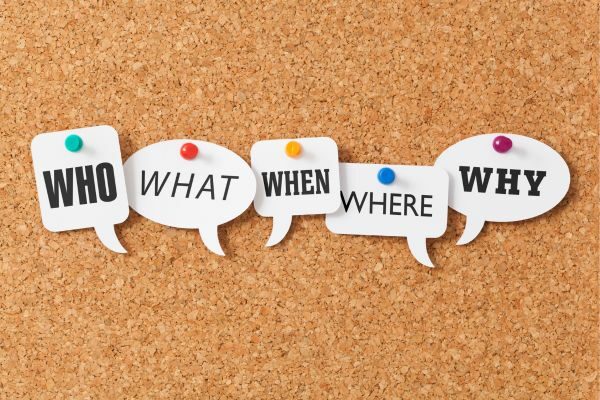
- Who is most directly affected by this decision?
- Who is the protagonist? Who is the antagonist?
- Who was the most important character?
- Who was a supporting character that was essential to the storyline?
- What is the problem you are trying to solve?
- What information is important to know about this before forming an opinion?
- What was the point of _________?
- When is it a good time to stop (or take a breather)?
- When should you know the answer?
- When will it be time for this? How do you know?
- When will this be critical?
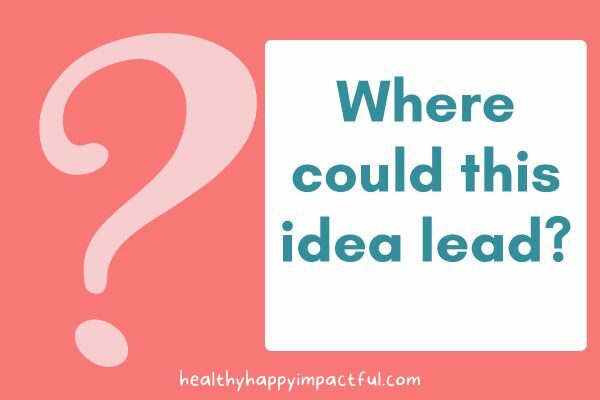
- Where can you go to ask for help?
- Where can you find a good solution? Or information that helps you solve this problem?
- Where could this idea lead?
- Why has this issue come out into the spotlight?
- Why do you think ______ acts that way?
- Why is _______ happening, but ________ is not?
- How else could we have done that?
- How else could this be handled?
- How would you have responded in this situation?
- Fun Hobbies For Families To Do
- Best Family Challenge Ideas
More Ways To Encourage Critical Thinking In Kids
Want to go beyond questions? No problem! Here are other practical ways to build this crucial skill:

Change your questions to them.
Turn your normal yes or no questions to more open ended questions.
Example: Instead of “How was your day?” go with “What was the most interesting part of your school day today?”
Refrain from stepping in.
These days parents feel like they should be fixing their kids’ problems constantly.
Instead, hold back and force your child to problem-solve on their own. Ask questions and guide them through the problem, but let them know that they are in charge of finding their own solutions.
Play Games And Do Activities That Promote Critical Thinking
Here are a few great ones!
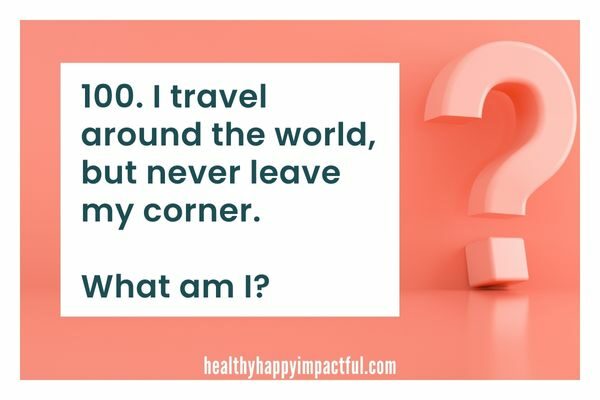
Two Truths & A Lie Game – The players have to decide which statements are true and which one is not. This game is great for learning to read body language too!
Good Debate Topics For Kids – Nothing builds quick critical thinking like a lively debate.
Riddles: What Am I? – These word riddles help kids think through different possibilities.
Guess The Animal Riddles for Kids – More riddles all about animals to get kids thinking.
Encourage creativity.
Provide your child with opportunities to use their imagination.
Sometimes, all this takes is getting your child off screens and outside playing with sticks!
Encourage them to build something , make up a new game, and think outside the box whenever possible.
Let them fiddle with things.
My son has a very “why” brain and loves to mess with stuff. It used to embarrass me when we were around others.
But, one day, my husband and I realized that his “working things out” isn’t bad. We just needed to teach him in what context it is appropriate. Now he fiddles with everything, and it is amazing to watch his mind work.
Let them question.
The same goes for questions. They should be challenging assumptions and questioning the world around them. Too many people take for granted the things that they hear and read. Teach your child to be different.
Promote Active Listening.
Encourage your child to ask questions to clarify understanding and develop communication skills.
Examples: “What I hear is _________.” Or, “How do you know _________?”
Try New Things.
Travel. And regularly expose your kids to new ideas and experiences. This helps them see their regular world in a new light.
Think Critically Yourself.
Finally, your child will be much more likely to think critically if they see a parent who does it. So, apply all of these strategies to yourself as well.
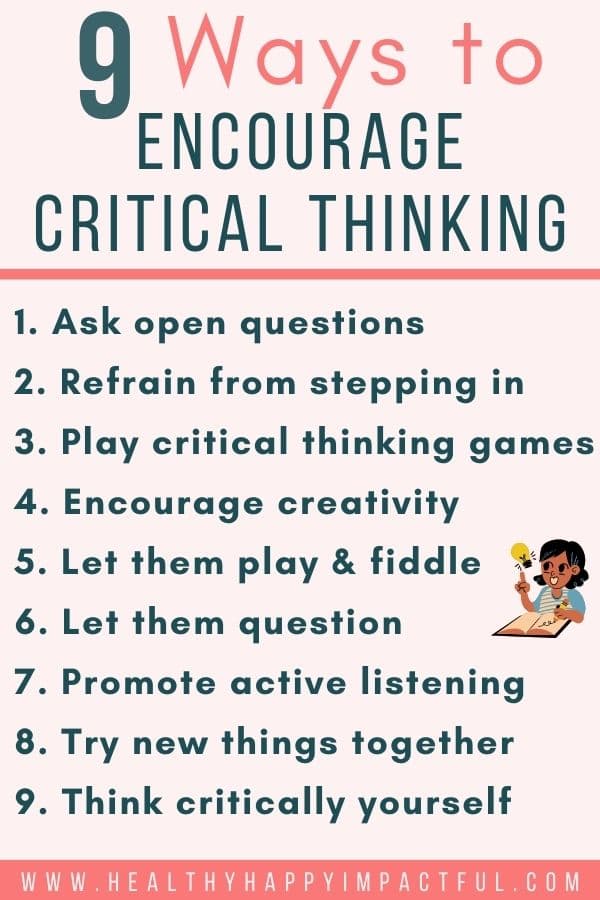
To Consider With Critical Thinking Questions For Kids
Teaching children to form their own opinions is how we build a generation of people that will analyze, evaluate, and make decisions for the betterment of the world.
It’s not just important. It’s critical to our future as a society.
More family-friendly posts you’ll love…
- Telephone Game Phrases & Statement Ideas
- Ice Breaker Kids & Teen Games
- Best Books List For 4 Year Olds
Creative Kids Critical Thinking Questions For Students
Jennifer is the founder and chief editor of Healthy Happy Impactful®. She believes that living, loving, and connecting deeply are the foundation for a good life. She holds a degree in education and is a mom to 3 kids.
- Skip to primary navigation
- Skip to main content
- Skip to primary sidebar
- Skip to footer
Don't Miss a Post! Subscribe
- Guest Posts

- Educational AI
- Edtech Tools
- Edtech Apps
- Teacher Resources
- Special Education
- Edtech for Kids
- Buying Guides for Teachers

Educators Technology
Innovative EdTech for teachers, educators, parents, and students
Examples of Critical Thinking Questions for Students
By Med Kharbach, PhD | Last Update: May 22, 2024

Critical thinking is an essential cognitive skill that entails the ability to reason, analyze, synthesize, and evaluate information. It goes beyond mere acquisition of knowledge. Instead, it involves deep, reflective thought, demanding us to question our assumptions, weigh evidence, and consider consequences. It’s about making clear, reasoned judgments. In essence, critical thinking is thinking about thinking, in a manner that allows us to improve the quality of our thinking.
In our daily lives, critical thinking helps us better understand ourselves, other people, and the world around us. It aids in problem solving, aids in the formation of beliefs and opinions, and encourages curiosity and creativity.
For example, when you’re faced with a major decision like purchasing a house, critical thinking enables you to weigh the pros and cons, assess the credibility of your sources of information, consider alternative options, and make a well-informed decision.
In professional situations, critical thinking is equally important. It helps us navigate complex work situations, make informed decisions, solve problems efficiently, and think creatively. For instance, if a company faces a decline in sales, critical thinking would help diagnose the root cause of the issue, evaluate different strategies to address the problem, and make effective decisions to rectify the situation.
The importance of critical thinking is particularly crucial for students. It provides them with the necessary skills to understand complex concepts, evaluate the credibility of sources, engage in thoughtful discussions, and develop reasoned arguments. It lays the foundation for lifelong learning and the ability to adapt to an ever-changing world.
This brings us to the concept of critical thinking questions . These are questions that are specifically designed to promote critical thinking. They go beyond factual inquiries, prompting individuals to analyze, synthesize, apply, and evaluate information. Critical thinking questions challenge the conventional wisdom and encourage individuals to think deeper, questioning the why’s and how’s.
They serve as a tool to spark intellectual engagement and stimulate thoughtful and reflective responses. As we delve further into this blog post, we will explore different types of critical thinking questions and how they can be applied in various contexts.
Related: Best TED Ed Lessons on Critical Thinking

Tips on Formulating Critical Thinking Questions
Creating good critical thinking questions involves understanding the basics of inquiry and knowing how to stimulate higher order thinking. Here are some tips and steps on formulating effective critical thinking questions:
Characteristics of Good Critical Thinking Questions:
- Open-Ended: Good critical thinking questions are typically open-ended, meaning they don’t have a single, simple answer. They invite students to think deeply and come up with their unique insights.
- Thought-Provoking: Effective questions challenge assumptions and encourage students to think creatively and critically. They provoke curiosity and exploration.
- Promote Discussion: The questions should stimulate meaningful discussions. The responses to these questions should not end the conversation, but rather, foster a deeper exploration of the topic.
- Clear and Understandable: The question should be framed in such a way that it is clear and easy to understand. Confusing questions can deter students from critical thinking.
Steps to Create Effective Critical Thinking Questions:
- Identify Your Learning Goals: Start by figuring out what you want your students to learn or achieve. Your question should align with these learning goals.
- Consider the Cognitive Level: Depending on the depth of thinking you want to stimulate, frame your questions accordingly. For instance, for higher order thinking, you might want to ask analysis, evaluation, or creation questions.
- Draft Your Question: Begin drafting your question. Remember, the best questions are open-ended and require more than a yes or no answer.
- Refine Your Question: Review your question. Is it clear? Does it promote discussion? Does it align with your learning goals? Refine as necessary.
- Test Your Question: Try out your question with a few students or colleagues to see if it stimulates the kind of discussion you’re hoping for. Be open to further refining your question based on the results.
Keep in mind that the goal of asking questions is not to ‘stump’ the students, but to promote intellectual engagement and thought. The best questions often lead to more questions, igniting a passion for learning and exploration.
Types of critical thinking questions
Critical thinking questions can be divided into the following categories:
1. Analysis Questions
Analysis questions ask the respondent to break a concept or idea into its component parts for examination. These questions can help uncover underlying structures, patterns, or meanings. They often involve words like “compare”, “contrast”, “classify”, “divide”, etc.
Example: “Compare the political ideologies of democratic socialism and laissez-faire capitalism. What are the similarities and differences between them?”
2. Evaluation Questions
Evaluation questions call for the respondent to make a judgment about the value of something, based on defined criteria. They often use terms like “critique”, “justify”, “validate”, “defend”, etc.
Example: “Evaluate the effectiveness of the government’s pandemic response measures. What were the successes and shortcomings?”
3. Inference Questions
Inference questions require the respondent to go beyond what is explicitly stated and make logical conclusions or predictions based on the information provided. Key words often include “infer”, “deduce”, “predict”, “conclude”, etc.
Example: “Given the recent surge in online shopping trends, what can you infer about the future of brick-and-mortar retail stores?”
4. Application Questions
Application questions involve applying knowledge or concepts to new situations or contexts. These questions often involve “applying”, “utilizing”, “implementing”, or “executing” learned knowledge.
Example: “How would you apply the principles of conflict resolution that we studied to resolve a disagreement in your workplace?”
5. Synthesis Questions
Synthesis questions invite the respondent to combine different pieces of information, ideas, or concepts to form a new whole or propose a solution. Words often associated with these questions are “design”, “formulate”, “propose”, “create”, etc.
Example: “Based on your understanding of climate change and renewable technologies, propose a comprehensive strategy for a city to reduce its carbon footprint.”
These types of questions, when used in the appropriate contexts, can help foster a deep level of understanding and stimulate higher-level thinking.
Examples of Critical thinking Questions
Here are some examples of critical questions that you can use to stimulate students’ critical thinking skills, encouraging them to analyze, evaluate, and create new ideas based on what they’ve learned.
- What do you think would happen if…?
- Can you explain why…?
- How would you solve this problem using different strategies?
- Can you compare and contrast these two concepts?
- How can you demonstrate your understanding of this concept in a different way?
- How would you categorize these items, and why did you choose to do it that way?
- What patterns or connections do you see in the information provided?
- How might you interpret these findings from another perspective?
- Can you design a…to…?
- How would you prove or disprove this statement?
- How can we improve…?
- What would be the consequences if…?
- Can you predict the outcome if…?
- What is the relationship between…?
- How can this be applied to other situations?
- What are the possible solutions for…?
- Why do you think that… happened?
- How can we test the validity of…?
- What alternative would you suggest for…?
- How can you illustrate this concept in a diagram?
- What would you recommend, and why?
- How is this similar to…?
- Can you make a general rule about…?
- How would you evaluate…?
- What evidence do you have for your claim?
- What are the implications of…?
- How does this contradict or confirm your understanding of…?
- Can you think of an example where…?
- How would you justify…?
- What do you think is the significance of…?
In conclusion, critical thinking questions are an indispensable tool for stimulating and nurturing the intellectual capabilities of students. They’re not just questions, but sparks that ignite the curiosity, analytical ability, and problem-solving skills in a learner. They invite students to dig deeper, challenge their preconceptions, and engage with material on a more profound level.
These questions play a pivotal role in taking learning beyond the simple absorption of facts into the realm of true understanding and application. They prepare students for the complexities of the real world, honing their ability to analyze situations, make decisions, and innovate solutions.
As educators and teachers, fostering this skill in students through the strategic use of critical thinking questions should be a top priority. So, let’s continue to question, to probe, and to encourage our students to do the same, for it’s in the exploration of these questions that true learning lies.

Join our mailing list
Never miss an EdTech beat! Subscribe now for exclusive insights and resources .

Meet Med Kharbach, PhD
Dr. Med Kharbach is an influential voice in the global educational technology landscape, with an extensive background in educational studies and a decade-long experience as a K-12 teacher. Holding a Ph.D. from Mount Saint Vincent University in Halifax, Canada, he brings a unique perspective to the educational world by integrating his profound academic knowledge with his hands-on teaching experience. Dr. Kharbach's academic pursuits encompass curriculum studies, discourse analysis, language learning/teaching, language and identity, emerging literacies, educational technology, and research methodologies. His work has been presented at numerous national and international conferences and published in various esteemed academic journals.

Join our email list for exclusive EdTech content.
Critical Thinking Interview Questions: 15 Interview Questions to Identify Top Candidates
Critical thinking goes beyond technical expertise and is essential in a wide range of professions. It’s a skill that enables employees to analyze information, solve problems, and make informed decisions. You can gauge critical thinking using assessment tests, practical problem solving, or through crafting interview questions highlighting critical thinking abilities.
In this blog, we’ll be going through questions you can ask your candidates to figure out if they have the critical thinking skills you require for your open position. But first, let’s talk about why critical thinking skills are so important.
Why Are Critical Thinking Skills Necessary?
Critical thinkers are especially necessary positions that require problem solving skills, juggling various priorities, and analyzing data. Although many jobs and industries require a certain level of critical thinking ability, these skills are essential for some job roles and industries, including:
- K-12 : The best teachers are creative problem solvers. Between classroom management and learning fatigue, critical thinking skills help teachers find the best way to connect with their students.
- Leadership Positions : Effective leaders must make strategic decisions, often in ambiguous situations. Critical thinking is crucial in leadership roles.
- Creative Fields : In industries such as design, advertising, and content creation, the ability to think critically allows individuals to come up with innovative and unique solutions and ways to attract prospective customers.
- Healthcare : Medical professionals must critically assess patient conditions, interpret test results, and make decisions that can have a significant impact on a patient’s well-being.
- Technology : IT professionals, software developers, and data analysts rely on critical thinking to troubleshoot, create algorithms, and analyze data.
Now, let’s dive into a list of interview questions that can help you evaluate a candidate’s critical thinking abilities.
Interview Questions to Assess Critical Thinking:
Note: Feel free to mix and match these questions based on the specific role and the level of critical thinking required. Also–to expand on questions like these, you can use tools like AI Question Assist . interviewstream’s Ethical AI tool helps you come up with position and industry-based questions using community knowledge from a large language
- Tell me about a situation where you faced a complex problem at work? How did you approach it, and what was the outcome?
- How do you typically approach a new project or task? What steps do you take to understand the problem and develop a plan?
- Give an example of a situation where you had to think on your feet and adapt to unexpected challenges.
- Describe a project where you had to evaluate multiple options before making a decision. How did you assess the pros and cons?
- Provide an instance where you identified a problem in your current or previous role that others might have overlooked? What did you do about it?
- What methods do you use to gather and evaluate information when solving complex issues?
- Tell me about a situation where you had to analyze data to make a decision. What tools or methodologies did you use?
- Describe a project where you had to anticipate potential obstacles and develop contingency plans. How did your proactive thinking benefit the project?
- Provide an example of a time when you identified a solution that significantly improved a process or operation at your company?
- Describe a situation where you had to explain a complex concept or solution to someone who had little to no knowledge of the subject. How did you ensure effective communication?
- How do you prioritize tasks and allocate your time when dealing with multiple projects or assignments?
- Explain your process for identifying the root cause of a problem. Can you provide an example from your experience?
- Describe a project where you had to innovate and think outside the box to overcome a challenge or reach a goal?
- Tell me about a time when you had to analyze financial data or budgets to make recommendations or decisions for your department or company.
- How do you approach a project that requires you to think long-term and consider the potential future implications of your decisions?
How to Use Critical Thinking Interview Questions in your Interviewing Process
The ability to think critically and solve complex problems is relevant across a wide range of job roles and industries. You can use the questions above to assess the critical thinking abilities of your candidates. And you can assess those skills even better if you ask these questions in an in-person or video interview .
Especially if you are using these questions in screening interviews , video screening is an effective way to see the candidate process critical thinking questions in real time. For more information on interview questions, we wrote an article on the best interview questions to ask for team players , or you can fill out this form to chat with us today about how interviewstream can help you ask the right questions, every time.
About The Author
Caroline Chessia is the Marketing Operations Specialist at interviewstream. She loves color-coordinated graphs, hiking in the mountains, and every dog she meets—especially the Golden Retrievers.
interviewstream is dedicated to the success of more than 900 clients from K-12 school districts, emerging businesses, midsize companies, large enterprises, colleges, and universities.

- Building Interview Process
- On Demand Interviews
- Interview Scheduling
- Hiring Event Interview Scheduling
- Live Video Interviews
- Interview Insights
- Continuity Plan
- Terms of Service
- Privacy Policy
- Cookie Policy
- Single Sign-On
877-773-3164 (USA Only) [email protected] Support

Top 50 Critical Thinking Interview Questions and Answers

Streamline hiring with effortless screening tools
Optimise your hiring process with HiPeople's AI assessments and reference checks.
In this article
In today's competitive job market, employers are increasingly seeking candidates with strong critical thinking skills. Whether you're a recent graduate or a seasoned professional, mastering these skills can significantly enhance your chances of acing your next job interview.
In this guide, we'll walk you through everything you need to know about critical thinking interviews, from understanding their importance to providing sample answers and effective strategies. Let's dive in and equip you with the tools to succeed!
The Fundamentals of Critical Thinking
Before we delve into specific interview questions, it's essential to grasp the fundamental concepts of critical thinking. Critical thinking refers to the ability to analyze, evaluate, and synthesize information objectively, leading to well-informed decisions and problem-solving. It involves a combination of analytical, creative, and logical thinking skills, enabling individuals to navigate complex situations efficiently.
To develop your critical thinking abilities, you must understand the key components of this cognitive process. These components include:
- Analysis : Breaking down complex information into its constituent parts to comprehend the underlying structure and relationships.
- Evaluation : Assessing the strengths and weaknesses of different arguments, ideas, or solutions based on evidence and logic.
- Inference : Drawing logical conclusions and implications from available information and evidence.
- Explanation : Clearly communicating your thought processes, reasoning, and conclusions to others.
- Problem-Solving : Identifying and defining problems, exploring potential solutions, and choosing the most appropriate course of action.
- Creativity : Thinking outside the box to generate innovative ideas and approaches to challenges.
How to Prepare for Critical Thinking Interviews?
As with any interview, preparation is crucial for success. When it comes to critical thinking interviews, adequate preparation allows you to showcase your abilities confidently. Follow these steps to get ready for your interview:
- Research the Company and Industry : Understand the company's mission, values, and recent developments. Familiarize yourself with the industry's trends and challenges.
- Review the Job Description and Requirements : Analyze the job description to identify the critical thinking skills the employer seeks. Tailor your answers to align with these expectations.
- Understand the Common Critical Thinking Skills Employers Seek : Employers often look for skills such as analytical thinking, problem-solving, creativity, and decision-making. Be prepared to demonstrate these skills in your answers.
- Assess Your Own Critical Thinking Abilities and Weaknesses : Reflect on your past experiences and identify situations where you applied critical thinking effectively. Recognize areas for improvement and be ready to discuss your efforts to develop those skills.
Types of Critical Thinking Interview Questions
Critical thinking interview questions can be grouped into several categories. Each category assesses different aspects of your cognitive abilities . Let's explore each type:
Situational Questions
Situational questions present hypothetical scenarios to assess how you would handle specific situations in the workplace. The employer is interested in your problem-solving approach and decision-making process. Examples of situational questions include:
- Scenario 1: Dealing with a Team Member's Incompetence How would you handle a team member who consistently fails to meet deadlines or deliver satisfactory work?
- Scenario 2: Handling a Tight Project Deadline You're assigned a high-priority project with an extremely tight deadline. How do you prioritize tasks and ensure timely completion?
Behavioral Questions
Behavioral questions inquire about your past experiences and actions to predict your future behavior. The employer seeks examples of how you approached challenges in the past. Examples of behavioral questions include:
- Question 1: Describe a Time You Resolved a Complex Problem Share a specific example of a complex problem you faced at work. How did you approach the situation, and what was the outcome?
- Question 2: How Did You Handle a Conflict with a Coworker? Discuss a time when you had a disagreement with a coworker. How did you manage the situation to reach a resolution?
Hypothetical Questions
Hypothetical questions gauge your ability to think on your feet and assess how you approach novel situations. Employers are interested in your thought process and ability to generate solutions under pressure. Examples of hypothetical questions include:
- Question 1: What Would You Do If You Had to Meet a Challenging Sales Target? Imagine you're responsible for meeting a challenging sales target in a short period. How would you strategize and approach the task?
- Question 2: Imagine a New Product Idea for Our Company. If given the opportunity to propose a new product idea for the company, what would it be, and how would you present its potential value?
Puzzle and Brain Teaser Questions
Puzzle and brain teaser questions test your ability to think critically, logically, and creatively. They often involve solving mathematical or logic problems or answering riddles. Examples of puzzle and brain teaser questions include:
- Question 1: How Many Golf Balls Can You Fit in a School Bus? Estimate the number of golf balls that can fit in a standard school bus. Explain your reasoning.
- Question 2: How Do You Arrange Six Books on a Shelf with Limited Space? Arrange six books of different sizes on a narrow shelf with limited space. Describe your arrangement strategy.
Critical Thinking Skills and How to Develop Them
To excel in critical thinking interviews, you must cultivate specific skills that are highly valued by employers. Let's explore each critical thinking skill and strategies to develop them:
Analytical Thinking
Analytical thinking involves breaking complex problems into smaller components to understand their underlying structure and relationships. To enhance analytical thinking:
- Improve Data Interpretation and Evaluation: Practice analyzing data and information from different sources, such as reports, graphs, or case studies. Use this data to draw meaningful insights and conclusions.
- Develop Logical Reasoning: Engage in activities that require logical thinking, such as puzzles, Sudoku, or logic games. This helps sharpen your ability to reason deductively and spot patterns.
Creative Thinking
Creative thinking allows you to generate innovative ideas and solutions to challenges. To foster creativity:
- Cultivate Innovation and Idea Generation: Engage in brainstorming sessions with colleagues or friends. Encourage yourself to think beyond conventional solutions and explore new possibilities.
- Overcome Mental Blocks and Bias: Be aware of your cognitive biases and actively challenge them. Adopt a growth mindset that embraces new perspectives and encourages experimentation.
Problem-Solving
Problem-solving is the process of identifying issues and finding effective solutions to address them. To refine your problem-solving skills:
- Identify Root Causes: When facing a problem, dig deep to identify its underlying causes. Avoid addressing symptoms only.
- Apply Effective Solutions: Evaluate different potential solutions and their implications before implementing the most appropriate one.
Decision-Making
Decision-making involves making choices based on logical analysis and consideration of available information. To improve decision-making:
- Weigh Pros and Cons: Make a list of the advantages and disadvantages of each option before reaching a decision.
- Make Informed and Rational Choices: Base your decisions on evidence and facts rather than emotions or personal biases.
The STAR Method: Structured Approach to Responding
During critical thinking interviews, using the STAR method can help you deliver structured and impactful answers. The STAR method involves:
- Situation : Describe the context and situation you encountered.
- Task : Explain the task or problem you faced.
- Action : Outline the actions you took to address the situation.
- Result : Describe the outcome of your actions and any lessons learned.
Situational Interview Questions
Question 1: "imagine you are leading a project, and a team member consistently misses deadlines and fails to deliver satisfactory work. how would you address this situation".
How to Answer : When responding to this question, emphasize your problem-solving and leadership skills. Describe how you would approach the team member privately to understand any challenges they may be facing. Focus on finding solutions collaboratively, setting clear performance expectations, and offering support or training if needed. Highlight the importance of regular check-ins to monitor progress and provide constructive feedback.
Sample Answer : "If faced with a team member consistently missing deadlines, I would take a proactive approach. I would schedule a one-on-one meeting to understand the root cause of the issue and offer my support in finding solutions. By setting clear expectations and providing additional resources, I believe we can overcome this challenge together. Regular check-ins will help us track progress, and I am confident that with constructive feedback, the team member can improve their performance."
What to Look For : Hiring managers should focus on candidates who demonstrate strong communication skills, empathy, and a collaborative approach to problem-solving. Look for candidates who prioritize finding solutions and are willing to offer support to their team members.
Question 2: "You are responsible for managing a high-priority project with an extremely tight deadline. How would you prioritize tasks and ensure timely completion?"
How to Answer : Candidates should describe their process for breaking down the project into manageable tasks. Look for their ability to prioritize tasks based on urgency and dependencies. A strong response will demonstrate effective time management and the ability to communicate with stakeholders throughout the process.
Sample Answer : "To manage a high-priority project with a tight deadline, I would first break down the project into smaller tasks and identify critical milestones. By prioritizing tasks based on their dependencies and urgency, I can ensure that the most critical components are addressed first. Throughout the process, I would maintain open communication with the team and stakeholders, providing regular updates on progress and potential challenges."
What to Look For : Look for candidates who demonstrate excellent organizational and time management skills. Effective communication and the ability to handle pressure are also essential qualities to seek in their responses.
Behavioral Interview Questions
Question 3: "describe a time when you faced a complex problem at work. how did you approach the situation, and what was the outcome".
How to Answer : Candidates should provide a detailed account of the complex problem they encountered, the actions they took to resolve it, and the final outcome. Look for their ability to analyze the situation critically, make informed decisions, and adapt their approach as needed.
Sample Answer : "In my previous role, we faced a significant production delay that was affecting the project timeline. To address the issue, I gathered information from various stakeholders to understand the root cause. Working with a cross-functional team, we brainstormed potential solutions and implemented a process improvement strategy. As a result, we successfully reduced production time by 20% and completed the project ahead of schedule."
What to Look For : Seek candidates who demonstrate problem-solving skills, adaptability, and the ability to work collaboratively with others to reach a positive outcome.
Question 4: " Tell me about a time when you had a disagreement with a coworker. How did you manage the situation to reach a resolution?"
How to Answer : Look for candidates who handle conflicts constructively. They should describe their approach to resolving the disagreement, actively listening to their coworker's perspective, finding common ground, and working collaboratively to reach a resolution.
Sample Answer : "In one instance, I had a disagreement with a coworker over the approach to a marketing campaign. I approached the situation by initiating a private conversation to understand their perspective fully. By actively listening to their concerns and sharing my viewpoint without becoming defensive, we identified areas of agreement and crafted a comprehensive marketing strategy that incorporated elements from both approaches."
What to Look For : Observe candidates' communication and interpersonal skills, as well as their ability to work effectively with colleagues and find solutions in challenging situations.
Hypothetical Interview Questions
Question 5: "imagine you are responsible for meeting a challenging sales target in a short period. how would you strategize and approach the task".
How to Answer : Candidates should demonstrate their ability to strategize and set achievable goals. They should discuss how they would analyze the market, collaborate with the sales team, and monitor progress to adapt their approach as necessary.
Sample Answer : "If faced with a challenging sales target, I would conduct a thorough market analysis to identify opportunities and target segments. Collaborating with the sales team, we would set realistic goals aligned with the target. Regular performance evaluations and team meetings would allow us to track progress and adjust strategies based on real-time data."
What to Look For : Look for candidates who show a strategic mindset, data-driven decision-making, and the ability to work effectively with teams to achieve goals.
Question 6: "If given the opportunity to propose a new product idea for the company, what would it be, and how would you present its potential value?"
How to Answer : Look for candidates who demonstrate creativity and innovation in their response. They should articulate a well-thought-out product idea and explain its potential value to the company and its customers.
Sample Answer : "I believe a mobile app that complements our existing software could be a game-changer. This app would provide users with on-the-go access to essential features, enabling them to work seamlessly even outside the office. The app's integration with popular third-party tools would enhance its appeal, creating a new revenue stream while strengthening customer loyalty."
What to Look For : Seek candidates who display creative thinking, market awareness, and a customer-centric mindset in their proposed product idea.
Puzzle and Brain Teaser Interview Questions
Question 7: "estimate the number of golf balls that can fit in a standard school bus. explain your reasoning.".
How to Answer : Candidates should approach this question logically, breaking down the problem into manageable steps. Look for their ability to estimate the volume of the school bus and the volume of a golf ball, and then perform the necessary calculations to arrive at an approximate answer.
Sample Answer : "To estimate the number of golf balls that can fit in a school bus, I would first calculate the volume of the bus by multiplying its length, width, and height. Then, I would determine the volume of a golf ball using its diameter. By dividing the bus's volume by the golf ball's volume, I can arrive at an approximate number."
What to Look For : Look for candidates who demonstrate analytical thinking, mathematical reasoning, and the ability to approach complex problems systematically.
Question 8: "How do you arrange six books of different sizes on a narrow shelf with limited space?"
How to Answer : Candidates should describe their strategy for efficiently utilizing the limited space on the shelf. Look for their ability to think creatively and find practical solutions to organizing the books.
Sample Answer : "To make the best use of the limited space, I would arrange the three large books horizontally at the bottom of the shelf. This arrangement optimizes the available width. For the three smaller books, I would arrange them vertically, either next to one another or slightly overlapped. This approach maximizes the use of the available vertical space without wasting any surface area."
What to Look For : Observe candidates' creative thinking and practical problem-solving skills when arranging the books on the narrow shelf.
Analytical Thinking Interview Questions
Question 9: "you have access to a large dataset containing customer information. how would you analyze this data to identify trends and insights".
How to Answer : Candidates should outline their analytical approach to handling the dataset. Look for their ability to use data analysis tools, interpret trends, and draw meaningful insights from the information.
Sample Answer : "To analyze the customer dataset, I would start by cleaning and organizing the data to ensure its accuracy. Then, I would use data visualization tools to identify patterns and trends. By segmenting the data based on key variables, I can gain insights into customer behaviors and preferences. Finally, I would interpret the findings and present actionable recommendations to the team."
What to Look For : Observe candidates' proficiency in data analysis, data visualization, and their ability to derive actionable insights from complex datasets.
Question 10: "You need to make a critical business decision with limited information. How do you approach this situation?"
How to Answer : Candidates should describe their decision-making process when faced with limited information. Look for their ability to gather relevant data, weigh pros and cons, and make informed decisions based on available evidence.
Sample Answer : "When making a critical business decision with limited information, I would first identify the most important factors influencing the decision. Then, I would gather as much relevant data as possible and consult with subject matter experts to fill in the gaps. By analyzing the available information and potential outcomes, I can make the best decision possible given the circumstances."
What to Look For : Seek candidates who demonstrate sound judgment, analytical thinking, and the ability to make well-reasoned decisions in ambiguous situations.
Decision-Making Interview Questions
Question 11: "you are part of a team tasked with selecting a vendor for a significant project. how would you approach the vendor selection process".
How to Answer : Candidates should outline their approach to vendor selection, including criteria, evaluation methods, and stakeholder involvement. Look for their ability to consider various factors and make a well-informed choice.
Sample Answer : "To approach the vendor selection process, I would collaborate with the team to define our specific needs and requirements. We would establish evaluation criteria, including cost, quality, experience, and reputation. After researching potential vendors and obtaining proposals, we would conduct interviews and assess their fit with our project. Involving key stakeholders in the decision-making process would ensure buy-in and support for the selected vendor."
What to Look For : Look for candidates who demonstrate a systematic approach to decision-making, stakeholder engagement, and the ability to consider multiple perspectives.
Question 12: "Imagine you are presented with two potential business strategies. Both have their advantages and disadvantages. How do you determine which strategy is the most viable?"
How to Answer : Candidates should describe their approach to evaluating the two strategies objectively. Look for their ability to weigh the pros and cons, assess potential risks, and align the strategies with the organization's goals.
Sample Answer : "When faced with two potential business strategies, I would conduct a comprehensive analysis of each option. This would involve evaluating the short-term and long-term benefits, potential risks, resource requirements, and alignment with our company's mission and vision. By consulting with key stakeholders and considering market trends, I can determine which strategy is the most viable for our organization's success."
What to Look For : Seek candidates who demonstrate critical thinking, strategic reasoning, and the ability to align decisions with the overall organizational objectives.
Creative Thinking Interview Questions
Question 13: "how do you foster a culture of innovation within a team or organization".
How to Answer : Candidates should discuss strategies for encouraging creativity and innovation among team members. Look for their ability to promote an open and collaborative environment that values new ideas.
Sample Answer : "To foster a culture of innovation, I would encourage open communication and idea-sharing among team members. Providing dedicated time for brainstorming sessions and acknowledging and rewarding innovative contributions can motivate team members to think creatively. Additionally, creating cross-functional teams and encouraging experimentation can lead to breakthrough solutions and new opportunities for the organization."
What to Look For : Observe candidates' ability to inspire creativity, promote collaboration, and create an environment that supports and rewards innovative thinking.
Question 14: "Share an example of a time when you implemented a creative solution to a challenging problem. How did your innovation make a positive impact?"
How to Answer : Candidates should describe a specific situation where they applied creative thinking to solve a problem. Look for their ability to articulate the problem-solving process and the positive outcomes of their innovation.
Sample Answer : "In a previous role, we were facing declining customer engagement with our website. To address this, I proposed a gamification strategy, incorporating interactive elements and rewards. By integrating quizzes and challenges, we increased user engagement significantly. This creative solution not only enhanced the user experience but also contributed to a 30% increase in website traffic and a 20% rise in customer retention."
What to Look For : Seek candidates who demonstrate a track record of creative problem-solving and their ability to implement innovative solutions with tangible positive outcomes.
Communication and Collaboration Interview Questions
Question 15: "you are part of a cross-functional team working on a complex project. how do you ensure effective communication and collaboration among team members".
How to Answer : Candidates should describe their approach to fostering effective communication and collaboration within a cross-functional team. Look for their ability to facilitate open dialogue, establish clear channels of communication, and promote a culture of teamwork.
Sample Answer : "To ensure effective communication and collaboration in a cross-functional team, I would start by establishing regular team meetings to discuss progress, challenges, and goals. By encouraging open and respectful communication, team members can share their perspectives and expertise freely. Additionally, I would utilize collaboration tools and project management software to centralize information and keep everyone informed. Recognizing and celebrating team achievements would also foster a positive and collaborative atmosphere."
What to Look For : Observe candidates' communication skills, team-building abilities, and their commitment to creating a cohesive and collaborative team environment.
These communication and collaboration questions are vital in assessing candidates ' ability to work effectively with others and contribute to a positive team dynamic. By incorporating questions that touch on various critical thinking skills, you can identify well-rounded candidates who will excel in your organization.
Unlock the Full List of Top 50 Interview Questions!
Looking to ace your next job interview? We've got you covered! Download our free PDF with the top 50 interview questions to prepare comprehensively and confidently. These questions are curated by industry experts to give you the edge you need.
Don't miss out on this opportunity to boost your interview skills. Get your free copy now!
How to Answer Critical Thinking Questions?
While answering critical thinking questions, it's crucial to convey your thoughts clearly and demonstrate your problem-solving skills effectively. Here are some strategies to keep in mind:
- Demonstrate Clear and Logical Thought Processes : Clearly outline the steps you took to analyze the situation, make decisions, and arrive at your conclusions.
- Use Specific Examples and Relevant Experiences : Draw from past experiences to provide concrete evidence of your critical thinking abilities.
- Emphasize Collaborative and Innovative Approaches : Highlight instances where you collaborated with others and embraced innovative solutions to demonstrate versatility.
- Handling Stress and Pressure During Critical Thinking Interviews : When answering complex questions, stay composed and focused. Take a moment to gather your thoughts before responding.
Mistakes to Avoid During Critical Thinking Interviews
To make the best impression during your critical thinking interview, avoid the following common pitfalls:
- Relying Solely on Intuition : While intuition can be valuable, support your answers with logical reasoning and evidence.
- Making Assumptions Without Proper Evidence : Base your responses on relevant information rather than assumptions.
- Avoiding Ambiguity and Vagueness in Responses : Be precise and concise in your answers to showcase your clarity of thought.
- Overlooking the Importance of Active Listening : Fully understand the question before responding to ensure you address the interviewer's query accurately.
Final Preparation Tips
As your critical thinking interview approaches, consider these final tips to boost your confidence:
- Maintain a Positive and Confident Attitude : Display enthusiasm and confidence in your abilities throughout the interview.
- Review Key Concepts and Skills : Revisit the critical thinking skills and strategies discussed in this guide to reinforce your understanding.
- Get Adequate Rest Before the Interview Day : Ensure you are well-rested to be mentally sharp and focused during the interview.
By understanding the fundamentals of critical thinking, preparing thoroughly, and practicing your responses, you are well-equipped to tackle any critical thinking question that comes your way. Remember to embrace the STAR method, provide specific examples, and maintain a composed demeanor during the interview. With these valuable tips and strategies, you are ready to impress prospective employers and secure your dream job. Best of luck in your interviews, and may your critical thinking skills shine brightly!
Free resources

Top 15 Pre-Employment Testing Hacks For Recruiters
Unlock the secrets to streamlined hiring with expert strategies to ace pre-employment testing, identify top talent, and make informed recruiting decisions!

How to Find Candidates With Strong Attention to Detail?
Unlock the secrets to discovering top talent who excel in precision and thoroughness, ensuring you have a team of individuals dedicated to excellence!

How to Reduce Time to Hire: 15 Effective Ways
Unlock the secrets to streamlining your recruitment process. Discover proven strategies to slash your time to hire and secure top talent efficiently!

How to Create a Bias-Free Hiring Process?
Unlock the key to fostering an inclusive workplace. Discover expert insights & strategies to craft a hiring process that champions diversity and eliminates bias!

Hiring Compliance: A Step-by-Step Guide for HR Teams
Navigate the intricate landscape of hiring regulations effortlessly, ensuring your recruitment processes adhere to legal standards and streamline your hiring!

Data-Driven Recruiting: How to Predict Job Fit?
Unlock the secrets to data-driven recruiting success. Discover proven strategies for predicting job fit accurately and revolutionizing your hiring process!
You may also like

Top 50 Substitute Teacher Interview Questions and Answers

Top 50 TypeScript Interview Questions and Answers

Top 50 MongoDB Interview Questions and Answers
Unlock the next level of your recruiting workflows, download "top 50 critical thinking interview questions ".
17 critical thinking interview questions to find the perfect candidate
Find top critical thinkers for your open roles today.

Critical thinking is an important skill in any role, and its significance only increases the more complex responsibilities employees have.
The best way to ensure your candidates have the skills to tackle sophisticated problems is to screen applicants using a Critical Thinking skills test and create a shortlist of quantifiably competent interviewees.
The next step is to ask thought-provoking interview questions. This interview process is tricky, but to help you out, we’ve created a list of 17 critical thinking interview questions to ask candidates.
Table of contents
The importance of thought-provoking interview questions, 17 critical thinking interview questions and answers, summary of all 17 critical thinking interview questions, uncover critical thinking with talent assessments and in-depth interview questions, never miss great talent with our skills tests and critical thinking interview questions .
Research shows that the demand for critical thinking and analysis is growing at a faster rate than any other skill group, likely thanks to the increased need for critical analysis when navigating technological change.
To meet this demand, hiring managers need a robust system for assessing critical thinking skills for most positions. When we talk about critical thinking, we refer to a range of sub-skills, including:
Self-reflection
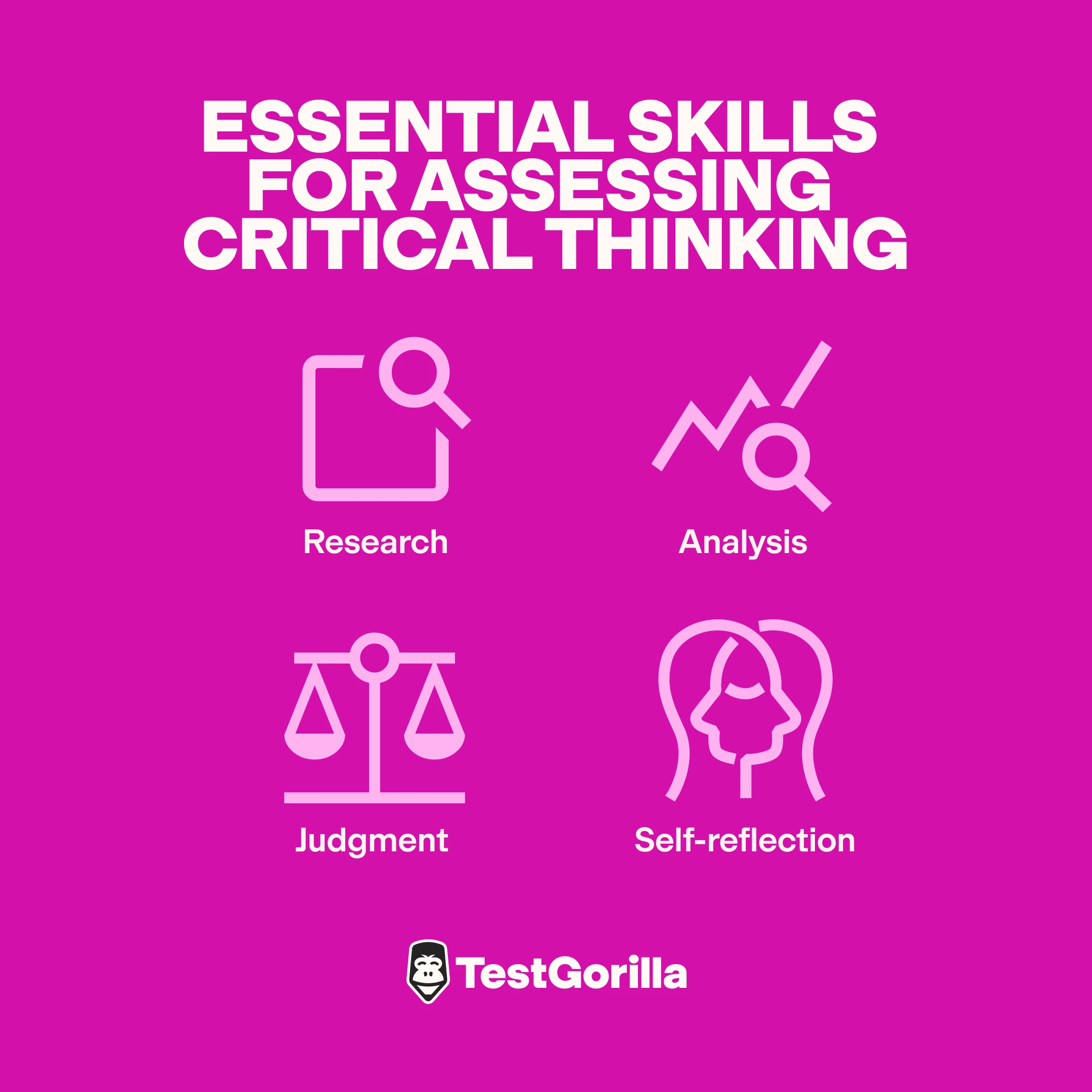
These skills are essential to many business processes , particularly for managers who must evaluate complex variables to make effective business decisions.
For example, critical thinking skills are necessary to effectively re-evaluate processes during agile project management, which drives innovation.
The problem with critical thinking skills is that it’s difficult to identify them relying solely on resume evaluation. Anyone can write “critical thinking skills” on a resume, but it doesn’t make them critical thinkers.
That’s where talent assessments come in. Skills testing measures candidates’ critical thinking skills, ensuring shortlisted candidates meet a certain benchmark. Then, asking interview questions for critical thinking gives you a well-rounded understanding of a candidate’s aptitude for objective analysis. The questions should be thorough enough to give you insight into a candidate’s motivations, problem-solving style, and decision-making skills.
Asking interview questions about critical thinking gives you insight into a candidate’s thinking style as well as relevant sub-skills, such as:
Decision-making
Problem-solving
Information processing
Deductive reasoning
Conflict resolution
In candidates’ answers to all these critical interview questions, look for their ability to:
Give a clear, concise, structured answer – for example, using the STAR method , outlining the situation, task, action, and result
Illustrate their points with specific examples
Reflect honestly on their strengths and weaknesses
Show self-awareness about areas for improvement
So, what are some critical thinking interview questions?
1. How do you go about completing a task without clear information?
Answers to this question should show how the candidate would perform in time-sensitive environments, where workers often make decisions with incomplete information.
Based on the answers, gauge how the candidate would handle the lack of information in complex situations, including:
How they review the information they have
How they use creative thinking to fill in the blanks
What experiences, resources, or training they draw on to make educated guesses about missing data
How they decide on a solution
Whether they continually use analytical skills to re-evaluate their chosen solution as they receive more information
What the outcomes have been in past instances of doing tasks while missing information
2. What is the most difficult work-related decision you’ve had to make?
This critical thinking interview question probes candidates’ ability to make sound decisions under pressure. A good answer shows a clear thought process and measured judgment to select a course of action.
Look out for candidates who can:
Lay out all the variables involved in the decision
Explain why these factors were at odds with each other and what the stakes were
Reflect on how they handled the stress of the decision
Show that they created a logical system for making the decision – and stuck to it
Display willingness to take ownership of their decisions even in difficult circumstances, such as layoffs
3. How do you process new ideas and approaches?
Open-mindedness is central to critical thinking. Candidates shouldn’t fear abandoning traditional methodologies if a superior alternative emerges. Equally, they should exercise their judgment to evaluate whether a new method meets the bar.
When a candidate answers this question, look out for:
Awareness of new ideas and approaches emerging in their field – this is a sign that a candidate is proactive and engaged in their work
An established process for fact-checking or testing new approaches
Ongoing reevaluation of new methods and ideas
Adaptability and willingness to consider ideas that contradict their way of doing things
4. How do you respond to opposing viewpoints?
Critical thinking depends on a person’s ability to weigh both sides of an argument. Even when one course of action is worse than another, candidates should be able to respond to opposing perspectives respectfully and constructively.
Candidates with strong critical thinking skills:
Show they understand opposing viewpoints
Practice active listening to ensure everyone feels heard
Identify the conflict between others’ ideas and their opinion
Address this conflict respectfully and back up their views with hard evidence
Where applicable, shift their viewpoint according to new information or reach a suitable compromise
5. How quickly do you make decisions?
In a fast-paced work environment, employees must act swiftly and decisively. This critical thinking interview question asks the candidate to expand on their decision-making process. Strong answers strike a balance between careful consideration and urgency, showing:
An understanding of decision-making timelines in their role or industry: quicker isn’t always better, and making snap decisions is often a sign of arrogance
An awareness of the time needed to make different types of decisions and which stakeholders are involved
Methods for assessing how much time they have to make a decision and how they manage their tasks to stay on track
Variables they prioritize in decisions they have limited time to make
6. Have you ever anticipated a complex problem before it arose? How did you deal with it?
This critical thinking interview question separates the proactive thinkers from the passive ones, helping you spot candidates who plan and anticipate risks – an invaluable skill in any organization.
Good answers to this question show:
A solid understanding of the key functions or outputs of their business and the resources these rely on
Proactive evaluation of changes to this environment
Risk assessment and risk management skills , and knowing when to take action and when to hold off
7. What work-related advice would you give to former employers?
This question gauges a candidate’s propensity to voice criticism and whether they express it constructively or negatively. There’s no right or wrong answer here. Candidates simply need to thoughtfully explain suggestions for managers in their previous roles.
“Green flags” when looking at candidates’ answers to this question include:
An awareness of the factors that went into their bosses’ decision-making
A clear explanation of their disagreements or amendments to these policies
Practical suggestions for improving the situation
A “red flag” would be making personal or non-constructive remarks or failing to show understanding and respect for former employers.
8. How often do you ask coworkers for help?
Workers should know when to seek help from others while working on a project. They shouldn’t burden co-workers with work they could do themselves, nor should they be too stubborn to proceed without some outside opinion or help.
Keep an eye out for candidates who:
Understand which tasks in their role are suitable for collaboration and which require independence
Show willingness to look for their own solution before asking others for help
Know their limitations, particularly within time constraints – for example, when to ask for help from a colleague who can complete a task faster
Awareness of and respect for their colleagues’ priorities
A willingness to learn so this situation is less likely to repeat itself
9. How should friction between team members be dealt with?
Conflict resolution is a skill that’s hard to come by for hiring managers. In work environments with people with different opinions and values, it’s important to have someone who can defuse conflict situations with a proactive, patient, and impartial approach.
Look for candidates who:
Know the difference between healthy and toxic conflict
Understand organizational or legal protocols for conflict resolution – for example, which situations should be dealt with formally
Resolve conflicts using non-violent communication
Are familiar with processes for restabilizing the team after conflict resolution
10. What is the most innovative work-related idea you have come up with? How did it benefit the organization?
This question asks candidates to describe past experiences of thinking outside the box to deliver a new solution. Having proactive problem-solvers in your organization helps it stay ahead of the curve.
A good answer to this critical thinking interview question shows that a candidate:
Is on the lookout for opportunities to innovate or optimize processes
Comes up with practical ways to implement their solutions
Stands up for their ideas if they’re not met with enthusiasm initially
11. Describe a situation when you received negative feedback you didn’t understand.
If applicants have received negative feedback they didn’t understand, getting defensive should not be their first instinct. An employee who analyzes situations critically should know that the feedback could enhance the quality of their work and strive to understand it better.
Look out for candidates who show:
A willingness to receive critical feedback
The ability to restate what they heard and ask for clarifications on aspects that elude them
A keenness to follow up with the supervisor and ask about their progress since the feedback was given
12. Describe a time you made a serious mistake at work.
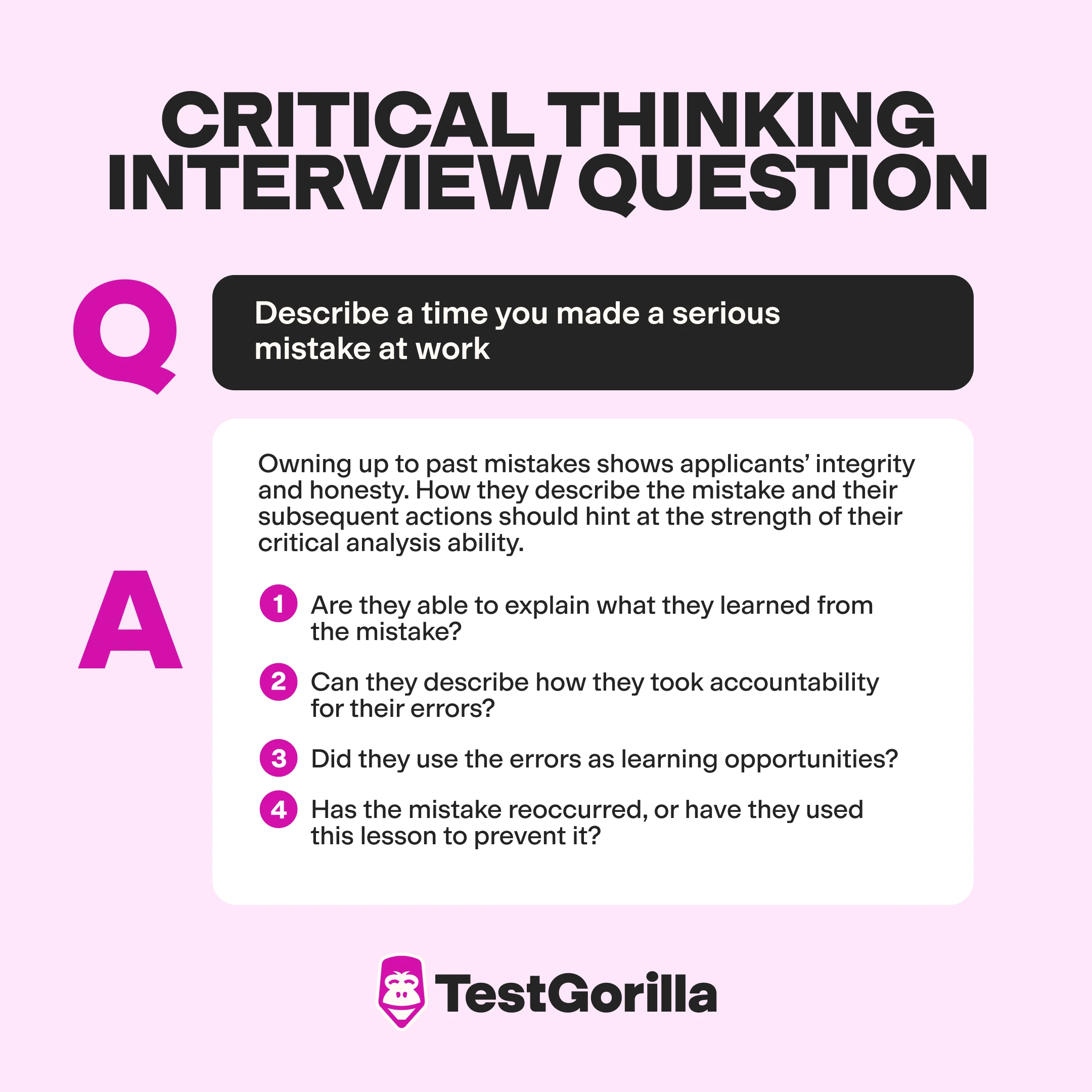
Owning up to past mistakes shows applicants’ integrity and honesty. How they describe the mistake and their subsequent actions should hint at the strength of their critical analysis ability. Ask yourself:
Are they able to explain what they learned from the mistake?
Can they describe how they took accountability for their errors?
Did they use the errors as learning opportunities?
Has the mistake reoccurred, or have they used this lesson to prevent it?
13. Describe a digital skill you need to improve.
Companies worldwide are experiencing massive shortages of digital skills, even among younger workers. One UK-based survey found that employers believed some of the top skills graduates lacked were:
Basic IT skills
Data ethics
Machine learning
Programming
Data communication skills
A good answer to this question should show that candidates understand the importance of mastering digital processes.
It also shows that the candidate has the critical thinking skills needed to recognize these weaknesses in their digital know-how, particularly where they impact their job.
Ask them if they are taking courses or reading books to improve.
14. Do you have any methods for improving your problem-solving skills?
Problem-solving skills are an adjunct of critical thinking that prepares candidates for handling challenging assignments by prioritizing tasks, planning and executing strategies, and anticipating additional problems.
To improve their problem-solving skills, candidates can:
Share ideas with coworkers to learn new problem-solving strategies
Improve analytical skills to assess the root causes of problems
Practice creative and critical thinking
Assessing your applicants’ problem-solving skills is quick and simple with our Problem Solving and Critical Thinking tests. Use these tests for a data-driven hiring process.
Spot top problem-solvers without bias
Find out how our skills tests can help you find the best hire for your open position.

15. Have you ever received negative feedback from senior management?
Negative feedback from senior managers may seem jarring, but employees should see it as a wake-up call and an opportunity to improve performance. Your applicants should show their critical thinking aptitude by explaining:
How they accept negative comments from senior leadership
What they do to implement the necessary changes to their work
How they use it as a learning opportunity
Ask your candidates to provide an example of a time they received negative feedback and ask extra questions to see how the criticism improved their work.
For instance, if a senior manager reproached an applicant for not motivating a team effectively, you may ask, “How did your motivational strategies change after that?”
16. How would you coach an employee who’s failing to meet targets?
Coaching enables underperforming team members to enhance their approach to the task and achieve their goals more efficiently. Successful coaching demands critical thinking skills on the mentor’s part to inform the best strategy.
Consider whether your applicants have coaching experience and can provide an example of a situation when their coaching strategies helped an employee who was failing to meet targets.
Strategies they could mention include:
Scheduling one-on-one meetings to discuss company targets
Using efficient communication to share their expectations with the employee
Evaluating the reasons why the team member is struggling
Looking for ways to help them address challenges with training or mentorship
17. How do you ensure your team trusts your choices?
Team management requires strong critical thinking skills because managers must understand what motivates each of their team members, communicate their decisions in a way that resonates with them, and project reliable authority.
Examples of how candidates could do this include:
Being transparent in their decision-making process
Admitting mistakes
Communicating effectively
Using team-building activities
Holding regular team meetings
Whichever method they use, applicants should describe the outcomes of their processes to help you appraise their managerial expertise.
What are examples of critical thinking questions? Here’s our full list of critical thinking questions and answers.
|
|
1. How do you go about completing a task without clear information? | The steps they take to fill in the blanks How they decide on a solution |
2. What is the most difficult work-related decision you’ve had to make? | Laying out the variables involved Using logical reasoning for making difficult decisions |
3. How do you process new ideas and approaches? | Awareness of new ideas in their field Ongoing re-evaluation of new methods |
4. How do you respond to opposing viewpoints? | The thinking process involved in identifying the conflict Addressing this conflict respectfully |
5. How quickly do you make decisions? | An understanding of decision-making timelines Awareness of the time needed for informed decisions |
6. Have you ever anticipated a problem before it arose? How did you deal with it? | An understanding of the key functions or outputs of their business An evaluation of changes to this environment |
7. What work-related advice would you give to former employers? | Awareness of the factors that went into their bosses’ decision-making Practical suggestions for how to improve |
8. How often do you ask coworkers for help? | Willingness to look for their own solution before asking for help Awareness of and respect for their colleagues’ priorities |
9. How should friction between team members be dealt with? | An understanding of healthy versus toxic conflict Non-violent communication skills |
10. What is the most innovative work-related idea you have come up with? How did it benefit the organization? | Practical ideas for how to implement solutions Willingness to stand up for their ideas |
11. Describe a situation when you received negative feedback you didn’t understand. | Restating what they heard Asking questions about the aspects they didn’t understand |
12. Describe a time you made a serious mistake at work. | An ability to explain what they learned from the feedback Accountability for their errors |
13. Describe a digital skill you need to improve. | An understanding of which digital skills are important to their job A plan for how they plan to improve this |
14. Do you have any methods for improving your problem-solving skills? | Sharing ideas with coworkers Improving analytical skills to assess the root causes of problems |
15. Have you ever received negative feedback from senior management? | How they accept negative comments from senior leadership What they do to implement the necessary changes |
16. How would you coach an employee who’s failing to meet targets? | Scheduling one-on-one meetings to discuss company targets Communicating expectations clearly |
17. How do you ensure your team trusts your choices? | Being transparent in their decision-making process Admitting mistakes |
In traditional hiring, the earliest you could assess critical thinking skills is during the interview. Hiring managers spend much time and effort inviting candidates to interviews and prepping the questions, only to find they aren’t suitable.
This situation doesn’t happen if you screen candidates using TestGorilla’s Critical Thinking test , which evaluates their basic critical thinking abilities with questions like this:
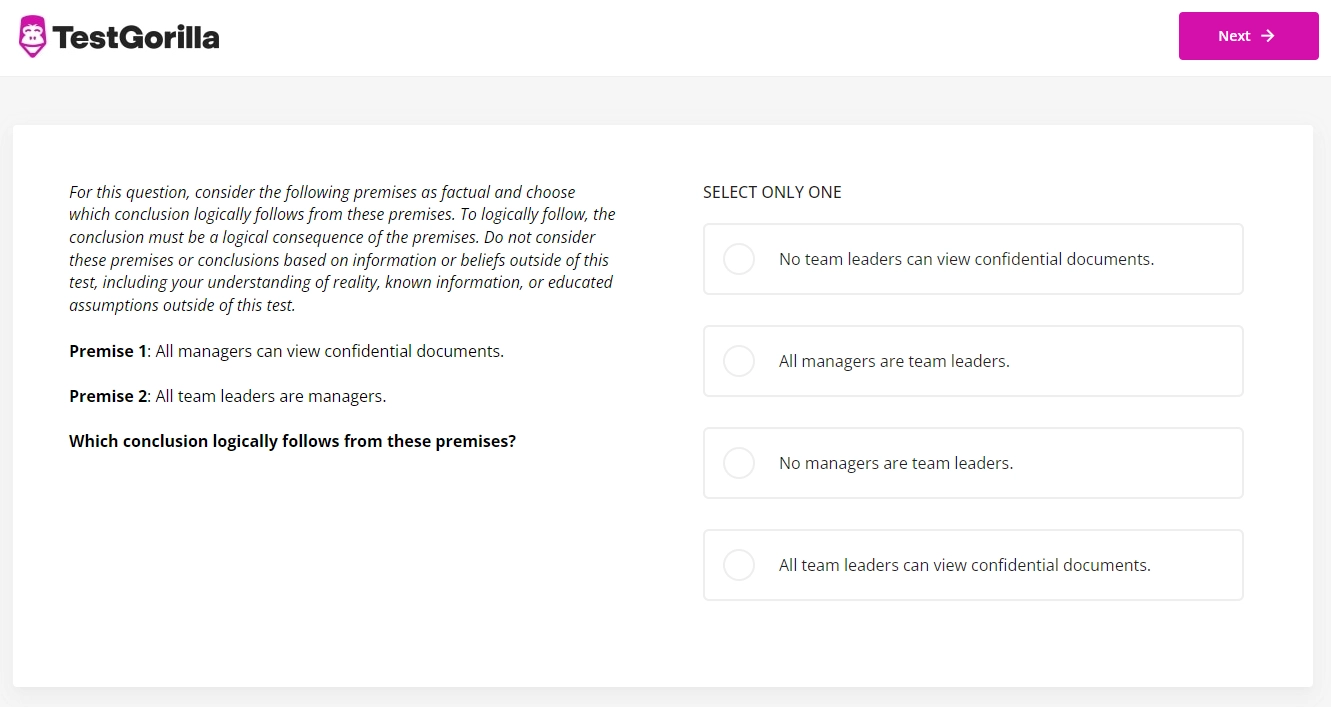
Using skills-based hiring during the shortlisting process lets you cut out the time you’d otherwise spend checking if candidates have critical thinking skills.
Instead, you can look more closely at how they approach problems with interview questions for strategic thinking. Then, you can evaluate whether their approach would work in your business environment.
This approach leads to better hires and a shorter time to hire. For example, the game development and publishing studio Visionaries FZ-LLC saves 15 hours per hire by only inviting candidates to interview if they score above 80% on TestGorilla’s assessment.
Don’t waste time finding skilled candidates.
Create your first multi-measure assessment for free with TestGorilla today.

Critical thinking is at the top of the list when deciding what to assess with your interview questions. In this article, we’ve broken down:
Why critical thinking skills are so important
A list of the best critical thinking questions for interview candidates
How skills testing can help you create even better thought-provoking questions for interviews
To learn how to get started with skills testing, sign up for a demo with one of our experts today.
You can also look around our platform yourself by taking a product tour .
Or, if you’re ready to get started straight away, sign up for our Free forever plan now.
Related posts
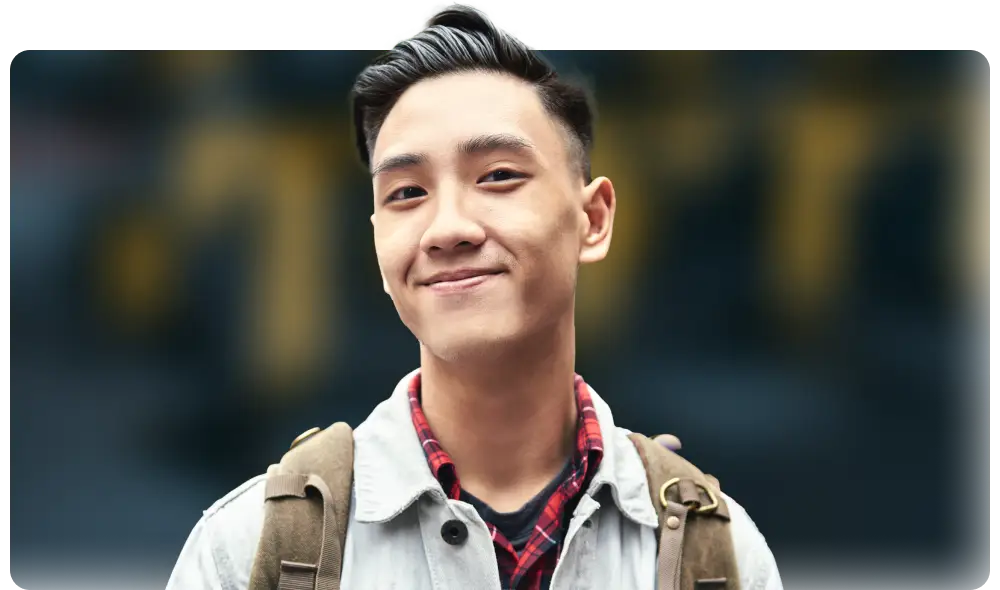
How to write a project manager job description

9 steps to effective competency mapping
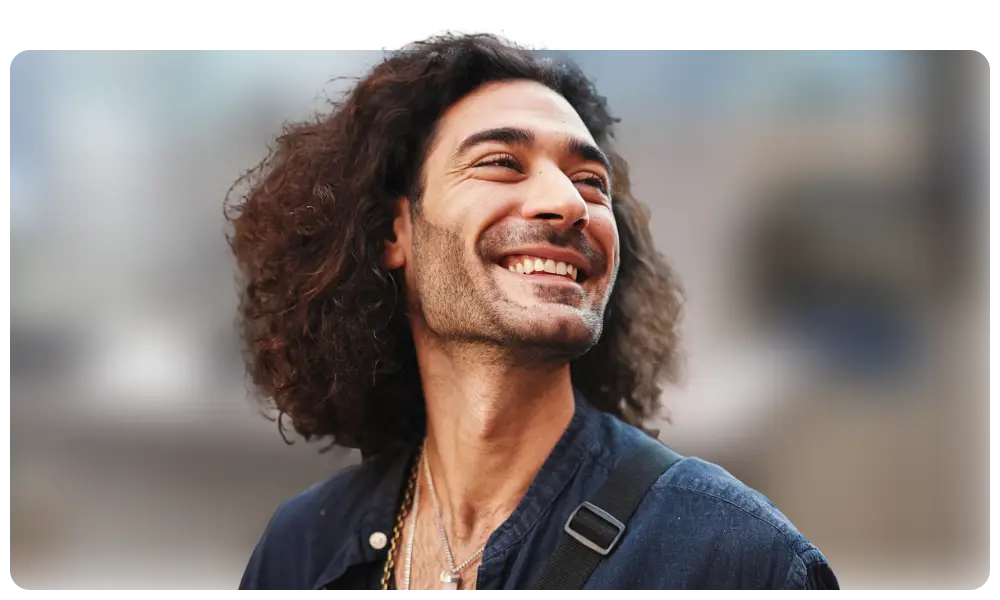
IQ tests for employment are obsolete – here’s what to do instead
You've scrolled this far
Why not try TestGorilla for free, and see what happens when you put skills first.

Latest posts

The best advice on pre-employment testing, in your inbox.
No spam. Unsubscribe at any time.
Hire the best. No bias. No stress.
Our screening tests identify the best candidates and make your hiring decisions faster, easier, and bias-free.
Free resources
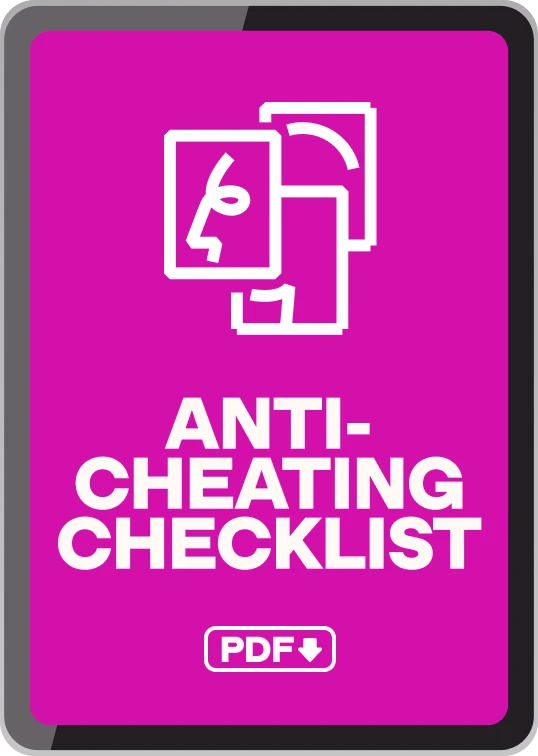
This checklist covers key features you should look for when choosing a skills testing platform
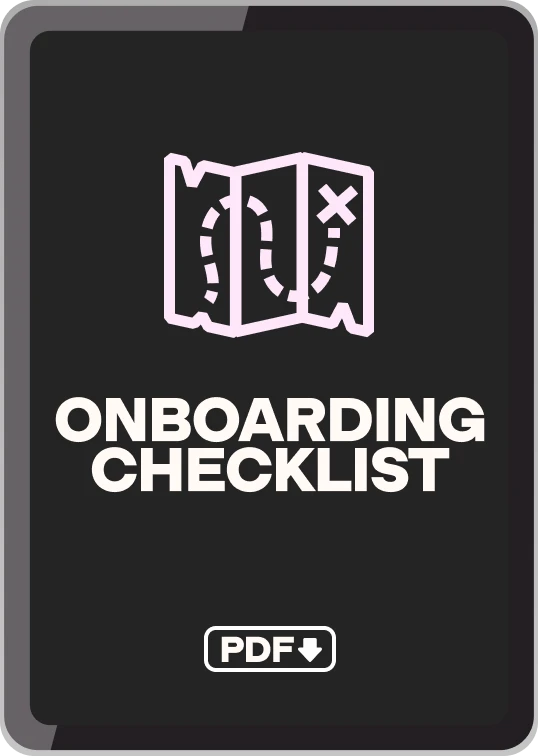
This resource will help you develop an onboarding checklist for new hires.
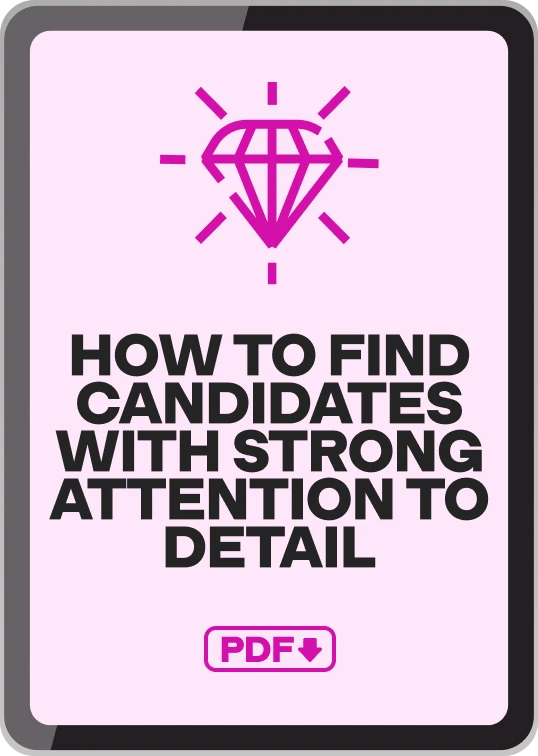
How to assess your candidates' attention to detail.
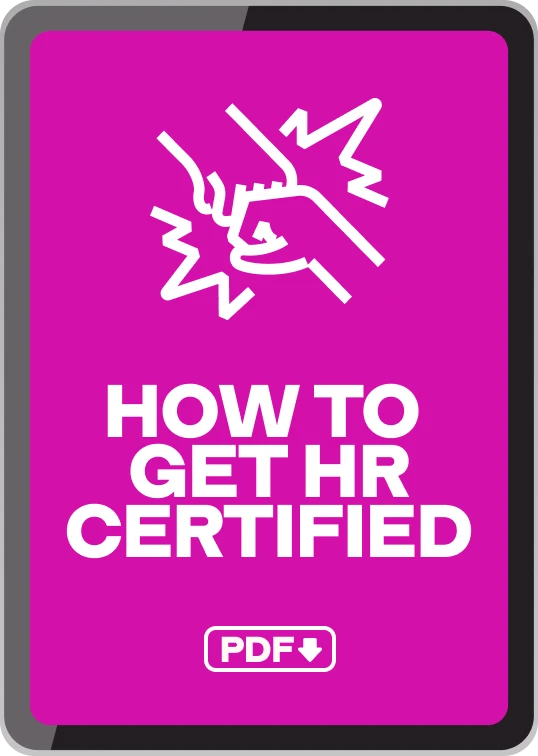
Learn how to get human resources certified through HRCI or SHRM.
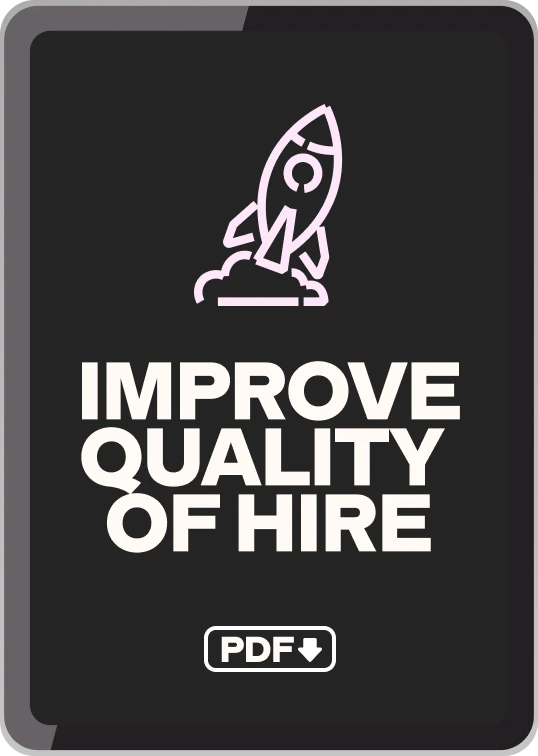
Learn how you can improve the level of talent at your company.
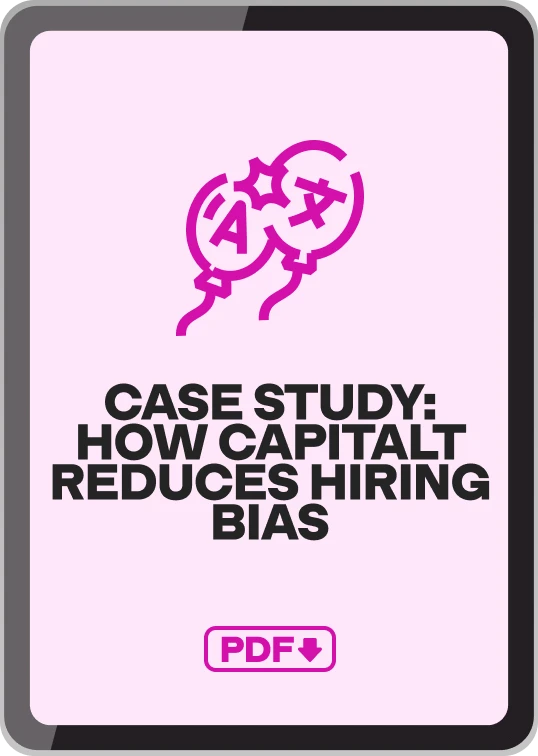
Learn how CapitalT reduced hiring bias with online skills assessments.
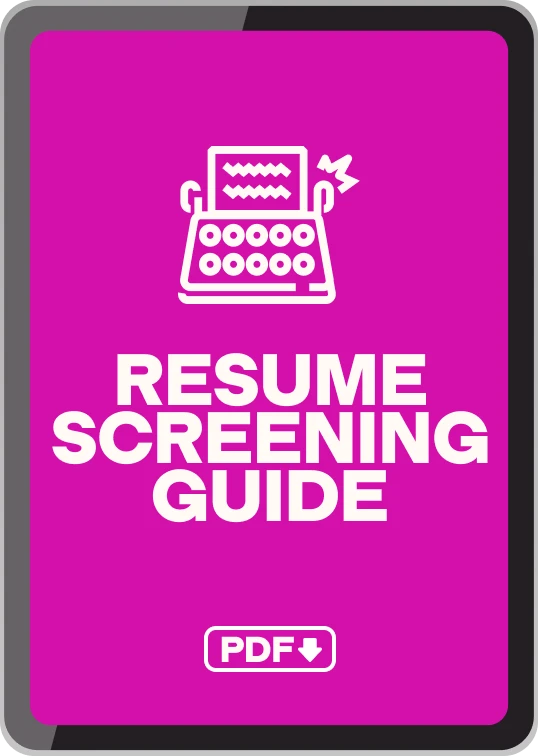
Learn how to make the resume process more efficient and more effective.
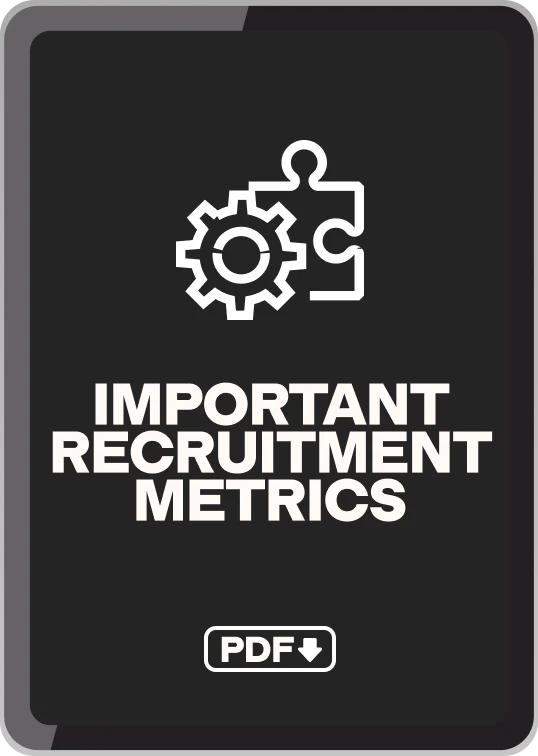
Improve your hiring strategy with these 7 critical recruitment metrics.
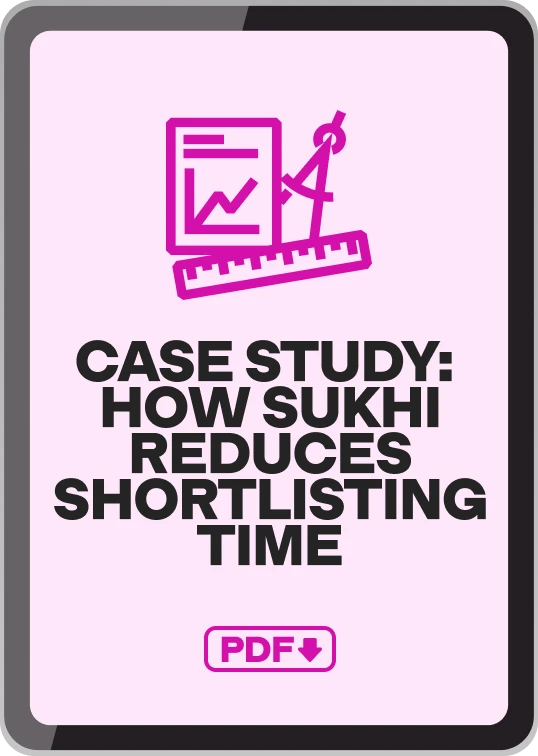
Learn how Sukhi decreased time spent reviewing resumes by 83%!
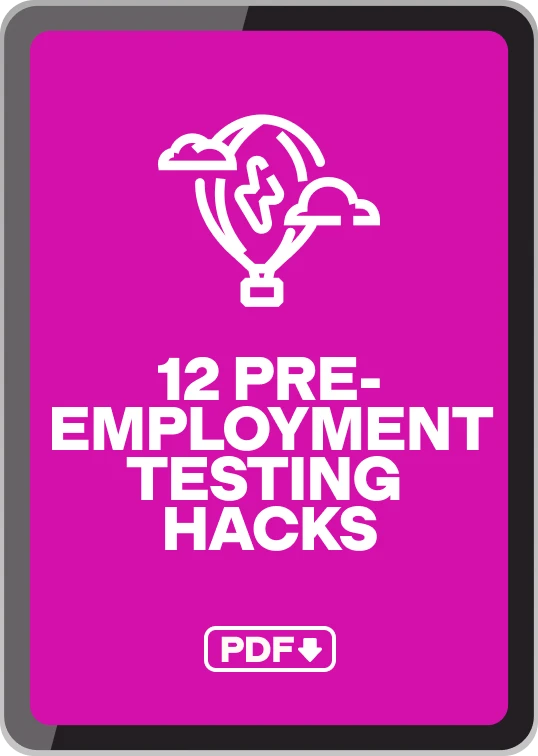
Hire more efficiently with these hacks that 99% of recruiters aren't using.
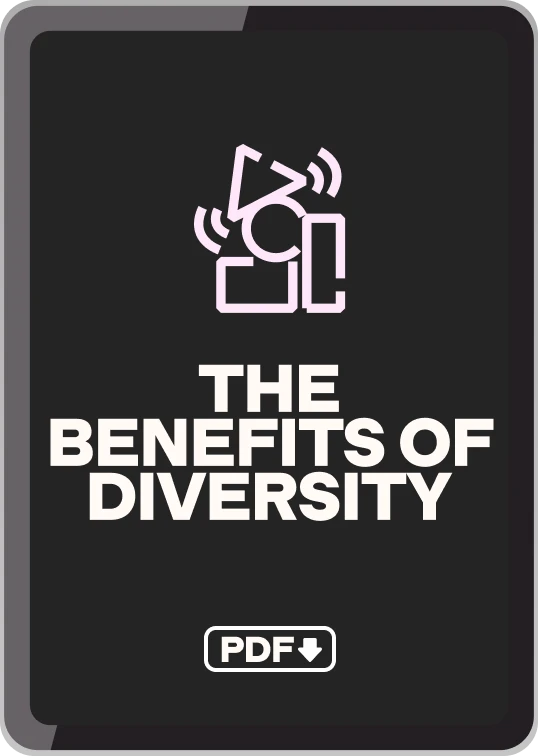
Make a business case for diversity and inclusion initiatives with this data.
DEI in 2024 is a more polarized topic than in 2020 – Check out our recent survey and get the insights Download the report
- HR Toolkit |
- HR Templates |
- Interview questions |
Critical-thinking interview questions and answers
Use these sample critical-thinking interview questions to discover how candidates evaluate complex situations and if they can reach logical decisions.

An experienced recruiter and HR professional who has transferred her expertise to insightful content to support others in HR.
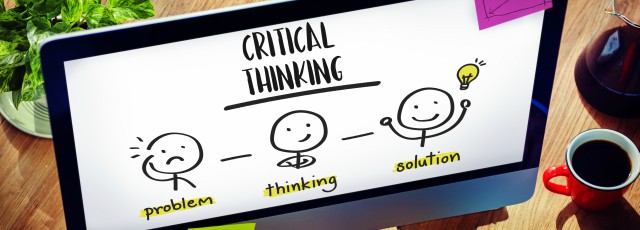
10 good critical-thinking interview questions
- Tell me about a time you had to make a decision with incomplete information. What did you do?
- During a live presentation to key stakeholders, you spot a mistake in your manager’s report, but your manager isn’t at the presentation. How do you handle this?
- Describe a time when you had to convince your manager to try a different approach to solve a problem.
- You’re working on a project and you struggle coming to an agreement with your team about your next step. What would you do to make sure you choose the right direction and get your co-workers onboard?
- What’s the best sales approach: increase prices to achieve higher revenues or decrease prices to improve customer satisfaction?
- How do you evaluate the credibility of a source of information?
- Describe a situation where you had to adapt your communication style to effectively convey your message.
- How do you prioritize tasks when faced with multiple urgent deadlines?
- What steps do you take to analyze a complex problem?
- Can you give an example of a time when you had to think on your feet during a crisis?
Here are 10 essential interview questions and sample answers to help identify the best candidates for this role.
1. Tell me about a time you had to make a decision with incomplete information. What did you do?
This question assesses how the candidate makes decisions when they don’t have all the facts.
Sample answer:
“I once had to decide on a vendor with limited information. I prioritized the most critical factors like reliability and cost, and made a provisional choice, subject to change as more information became available.”
2. During a live presentation to key stakeholders, you spot a mistake in your manager’s report, but your manager isn’t at the presentation. How do you handle this?
This question evaluates the candidate’s ability to handle sensitive situations tactfully.
“I would subtly correct the mistake without drawing attention to it, and later discuss it privately with my manager to prevent future errors.”
3. Describe a time when you had to convince your manager to try a different approach to solve a problem.
This question gauges the candidate’s ability to influence others and advocate for better solutions.
“I suggested an alternative workflow to my manager that could save time. I presented data to back up my proposal, and after a trial period, my approach was adopted.”
4. You’re working on a project and you struggle coming to an agreement with your team about your next step. What would you do to make sure you choose the right direction and get your co-workers onboard?
This question assesses the candidate’s collaborative problem-solving skills.
“I would facilitate a team discussion to hear all perspectives. We would weigh the pros and cons of each option and come to a consensus, ensuring everyone feels heard.”
5. What’s the best sales approach: increase prices to achieve higher revenues or decrease prices to improve customer satisfaction?
This question tests the candidate’s ability to think critically about business strategies.
“Both approaches have merits and drawbacks. The best strategy would depend on the company’s goals, market conditions, and customer base.”
6. How do you evaluate the credibility of a source of information?
This question assesses the candidate’s ability to discern reliable information.
“I look at the source’s reputation, the quality of the content, and whether the information is supported by credible references.”
7. Describe a situation where you had to adapt your communication style to effectively convey your message.
This question evaluates the candidate’s flexibility in communication to suit different situations.
“When presenting technical information to non-technical stakeholders, I avoid jargon and use analogies to make the content more relatable.”
8. How do you prioritize tasks when faced with multiple urgent deadlines?
This question assesses the candidate’s time-management and decision-making skills.
“I categorize tasks based on their urgency and importance. I tackle high-priority tasks first and delegate when possible.”
9. What steps do you take to analyze a complex problem?
This question gauges the candidate’s problem-solving methodology.
“I break down the problem into smaller parts, analyze each component, identify root causes, and then develop a step-by-step solution.”
10. Can you give an example of a time when you had to think on your feet during a crisis?
This question tests the candidate’s ability to think critically under pressure.
“During a system outage, I quickly assessed the situation, communicated with the team, and implemented a contingency plan to minimize downtime.”
What does a good critical-thinking candidate look like?
A strong candidate with critical-thinking skills is analytical, adaptable, and able to make well-reasoned decisions. They should also be effective communicators who can collaborate to solve problems.
Why test candidates’ critical-thinking skills
Critical-thinking skills allow people to evaluate situations through reasoning to reach logical decisions. Companies benefit from employees who think critically (as opposed to mechanically performing tasks) because these individuals use an independent mindset to seek ways to improve processes.
Critical thinkers are great assets in all teams and roles. They are:
- Responsible. You can count on them to make tough decisions.
- Consistent. They’re top performers who check their facts before acting.
- Unbiased. They keep their emotions in check to reach sound decisions.
- Creative. They suggest out-of-the-box solutions.
Challenge candidates with complex critical thinking questions to reveal their skills. But, present them with realistic problems related to the job. Brainteasers (e.g. some Google-type questions) are off-putting for candidates who already feel the pressure of the interview process. Questions like “How many haircuts happen in America every year?” are very popular online, but may not reveal much about their skills. Asking something like “How would you explain cloud computing to a 6-year-old?” will more accurately show you a candidate’s way of thinking.
Keep your challenging interview questions as job-related as possible. Sometimes it’s not important to assess whether the answer is right or wrong. Puzzling questions are your opportunity to evaluate how candidates react outside their comfort zone.
These critical-thinking interview question examples will help you identify candidates with high potential for future leadership positions. Combine them with various behavioral interview question types (like problem-solving and competency-based questions) to create complete candidate profiles and make better hiring decisions.
How to assess critical-thinking skills in interviews
- Use hypothetical scenarios and examples from candidates’ past experiences to understand their mindsets. An analytical way of thinking (comparing alternatives and weighing pros and cons) indicates people who make logical judgments.
- When problems arise, employees don’t always have ample time to design a detailed action plan. Opt for candidates who strike a balance between good and fast decision-making.
- Critical thinking requires questioning facts and the status quo. Look for candidates who have implemented new procedures or applied changes to processes in their past positions. These are signs of professionals who actively seek ways to improve how things get done, as opposed to taking the “this is how we always do it” approach.
- Candidates who are intrigued by solving problems are more likely to effectively manage challenges and stressful situations on the job. During your interview process, keep an eye out for candidates who show enthusiasm and don’t easily quit when faced with problems, even if they can’t immediately find solutions.
- They don’t fact-check. If you present candidates with a hypothetical problem and they don’t ask for clarifications, it’s a sign they take information for granted. A critical thinker should always research data for accuracy before relying on it.
- They make assumptions. Beyond taking things for granted, employees who make assumptions tend to jump to rushed and often biased conclusions. Look for candidates who use logical arguments to justify their decisions.
- They don’t answer. If they don’t at least try to solve the problem, they’ll probably keep procrastinating when something goes wrong or push their work onto to someone else. Asking for help when you face a challenge is more than acceptable, but avoiding problems reveals irresponsible employee behavior.
- They give you the obvious answer. Tricky questions are tricky for a reason. Candidates who go with the first answer that comes in mind are more likely to approach challenges superficially and avoid using critical-thinking skills to come up with the best solution.
Frequently asked questions
Want a custom interview kit, related interview questions.
- Problem-solving interview questions and answers
- Analytical interview questions and answers
- Decision-making interview questions and answers
Related Topics
- How to assess soft skills in an interview
- A guide to interview preparation for employers
- How to interview candidates for better hiring results
Jump to section
Let's grow together.
Explore our full platform with a 15-day free trial. Post jobs, get candidates and onboard employees all in one place.
Share on Mastodon
Module 5: Thinking and Analysis
Problem-solving with critical thinking, learning outcomes.
- Describe how critical thinking skills can be used in problem-solving
Most of us face problems that we must solve every day. While some problems are more complex than others, we can apply critical thinking skills to every problem by asking questions like, what information am I missing? Why and how is it important? What are the contributing factors that lead to the problem? What resources are available to solve the problem? These questions are just the start of being able to think of innovative and effective solutions. Read through the following critical thinking, problem-solving process to identify steps you are already familiar with as well as opportunities to build a more critical approach to solving problems.
Problem-Solving Process
Step 1: define the problem.
Albert Einstein once said, “If I had an hour to solve a problem, I’d spend 55 minutes thinking about the problem and five minutes thinking about solutions.”
Often, when we first hear of or learn about a problem, we do not have all the information. If we immediately try to find a solution without having a thorough understanding of the problem, then we may only be solving a part of the problem. This is called a “band-aid fix,” or when a symptom is addressed, but not the actual problem. While these band-aid fixes may provide temporary relief, if the actual problem is not addressed soon, then the problem will continue and likely get worse. Therefore, the first step when using critical thinking to solve problems is to identify the problem. The goal during this step is to gather enough research to determine how widespread the problem is, its nature, and its importance.
Step 2: Analyze the Causes
This step is used to uncover assumptions and underlying problems that are at the root of the problem. This step is important since you will need to ensure that whatever solution is chosen addresses the actual cause, or causes, of the problem.
Asking “why” questions to uncover root causes
A common way to uncover root causes is by asking why questions. When we are given an answer to a why question, we will often need to question that answer itself. Thus the process of asking “why” is an iterative process —meaning that it is a process that we can repeatedly apply. When we stop asking why questions depends on what information we need and that can differ depending on what the goals are. For a better understanding, see the example below:
Problem: The lamp does not turn on.
- Why doesn’t the lamp turn on? The fuse is blown.
- Why is the fuse blown? There was overloaded circuit.
- Why was the circuit overloaded? The hair dryer was on.
If one is simply a homeowner or tenant, then it might be enough to simply know that if the hair dryer is on, the circuit will overload and turn off. However, one can always ask further why questions, depending on what the goal is. For example, suppose someone wants to know if all hair dryers overload circuits or just this one. We might continue thus:
- Why did this hair dryer overload the circuit? Because hair dryers in general require a lot of electricity.
But now suppose we are an electrical engineer and are interested in designing a more environmentally friendly hair dryer. In that case, we might ask further:
- Why do hair dryers require so much energy?
As you can see from this example, what counts as a root cause depends on context and interests. The homeowner will not necessarily be interested in asking the further why questions whereas others might be.
Step 3: Generate Solutions
The goal of this step is to generate as many solutions as possible. In order to do so, brainstorm as many ideas as possible, no matter how outrageous or ineffective the idea might seem at the time. During your brainstorming session, it is important to generate solutions freely without editing or evaluating any of the ideas. The more solutions that you can generate, the more innovative and effective your ultimate solution might become upon later review.
You might find that setting a timer for fifteen to thirty minutes will help you to creatively push past the point when you think you are done. Another method might be to set a target for how many ideas you will generate. You might also consider using categories to trigger ideas. If you are brainstorming with a group, consider brainstorming individually for a while and then also brainstorming together as ideas can build from one idea to the next.
Step 4: Select a Solution
Once the brainstorming session is complete, then it is time to evaluate the solutions and select the more effective one. Here you will consider how each solution will address the causes determined in step 2. It is also helpful to develop the criteria you will use when evaluating each solution, for instance, cost, time, difficulty level, resources needed, etc. Once your criteria for evaluation is established, then consider ranking each criterion by importance since some solutions might meet all criteria, but not to equally effective degrees.
In addition to evaluating by criteria, ensure that you consider possibilities and consequences of all serious contenders to address any drawbacks to a solution. Lastly, ensure that the solutions are actually feasible.
Step 6: Put Solution into Action
While many problem-solving models stop at simply selecting a solution, in order to actually solve a problem, the solution must be put into action. Here, you take responsibility to create, communicate, and execute the plan with detailed organizational logistics by addressing who will be responsible for what, when, and how.
Step 7: Evaluate progress
The final step when employing critical thinking to problem-solving is to evaluate the progress of the solution. Since critical thinking demands open-mindedness, analysis, and a willingness to change one’s mind, it is important to monitor how well the solution has actually solved the problem in order to determine if any course correction is needed.
While we solve problems every day, following the process to apply more critical thinking approaches in each step by considering what information might be missing; analyzing the problem and causes; remaining open-minded while brainstorming solutions; and providing criteria for, evaluating, and monitoring solutions can help you to become a better problem-solver and strengthen your critical thinking skills.
iterative process: one that can be repeatedly applied
- Problem solving. Authored by : Anne Fleischer. Provided by : Lumen Learning. License : CC BY: Attribution
- College Success. Authored by : Matthew Van Cleave. Provided by : Lumen Learning. License : CC BY: Attribution
- wocintech stock - 178. Authored by : WOCinTech Chat. Located at : https://flic.kr/p/FiGVWt . License : CC BY-SA: Attribution-ShareAlike
- Five whys. Provided by : Wikipedia. Located at : https://en.wikipedia.org/wiki/Five_whys . License : CC BY-SA: Attribution-ShareAlike

Can you describe a time when your initial approach to a problem failed and you had to change course? How did you reassess and alter your approach?
How do you evaluate the reliability and credibility of the information you use to make decisions, how have you used data analysis to support your decision-making process, describe a time when you had to make a decision without having all the information you needed. how did you handle it, can you give an example of a time when you had to challenge the status quo to achieve a better outcome, how do you handle situations where you have to make a decision under pressure, can you describe a time when you had to persuade others to adopt your solution or viewpoint, what steps do you take to ensure you're not biased when you're problem-solving, can you provide an example of a time when you had to draw conclusions from a set of complex data, describe a situation where your initial decision was incorrect. how did you realize your error and correct it, can you explain how you'd approach a problem that has multiple possible solutions, can you provide an example of a time when you had to make a difficult decision that involved ethical considerations, can you provide an example of a time when you had to solve a complex problem that required a creative solution, can you explain how you'd approach a problem that you've never encountered before, how have you used critical thinking to improve a process in your past work, how do you approach situations where there's significant ambiguity or unknown variables, how do you approach disagreements or conflicts that emerge during a problem-solving process, can you provide an example where you had to identify and analyze the root cause of a problem rather than just addressing the symptoms, can you describe an instance where you had to use both qualitative and quantitative data to solve a problem, how do you balance the need for innovation with the risks associated with trying new approaches, can you describe a time when you had to adjust your critical thinking approach based on the audience or stakeholders involved, can you explain a situation where you used critical thinking to learn from a failure, how have you used critical thinking to evaluate multiple potential solutions to a problem, can you describe a time when your ability to think critically was the key to completing a project or task successfully, can you provide an example of a situation where you made an informed decision by using critical thinking skills, can you describe a time when you used critical thinking skills to solve a complex problem at work, can you describe a situation when you had to challenge an existing process or policy at work what was your thought process and the outcome, can you describe a situation where you had to navigate through complex, conflicting information to make a strategic decision, how would you approach a problem where you have limited information to make a decision, can you provide an example when you had to make a quick decision under pressure what was your thought process and how did you ensure it was the right decision, can you provide an example of a complex problem you had to solve by breaking it down into smaller, more manageable parts, can you give an example of when you used logic and reasoning to solve a problem at work, critical thinking interview questions with detailed answers.
Most important Critical Thinking interview questions for freshers, intermediate and experienced candidates. The important questions are categorized for quick browsing before the interview or to act as a detailed guide on different topics interviewers who look for critical thinking and critical reasoning skills typically test for.
Critical Thinking Beginner Interview Questions
View answer
Hide answer
This question is intended to assess how a candidate adapts their approach when an initial solution to a problem fails, demonstrating resilience and a willingness to reassess using critical thinking skills. Here is a possible scenario:
In my previous role as an operations manager for a manufacturing company, we faced significant production delays due to a bottleneck in one section of our assembly line. Initially, my solution was to increase the manpower in that section, believing that the issue was simply a lack of resources. However, despite the increased resources, the bottleneck persisted, and our production delays continued.
Having seen my initial solution fail, I knew I needed to reassess the problem. I started by stepping back and collecting more information. This time, rather than just focusing on the problematic section, I studied the entire production process, spoke with different team members, and also considered external factors such as supply chain and market demand.
Upon analyzing this new data, I discovered that the bottleneck wasn't simply a resource issue. The real problem lay in our outdated machinery in that section, which was not capable of handling the increased production volume. The issue was further exacerbated by a recent surge in market demand.
Armed with these new insights, I revised my approach. Instead of focusing on increasing manpower, I advocated for upgrading our machinery to a more efficient model capable of handling higher production volumes. Although this involved a significant initial investment, the analysis showed that it would improve our production efficiency, reduce delays, and ultimately, increase our profits in the long term.
After implementing the new machinery, we saw a significant improvement in our production speed and efficiency, solving the bottleneck issue.
This answer demonstrates the ability to reassess a problem when an initial solution fails and to adapt one's approach accordingly. The key takeaway is that when faced with failure, critical thinking can guide us to reassess, reanalyze, and ultimately find an effective solution.
The ability to evaluate the reliability and credibility of information is a key aspect of critical thinking, especially in a world where information is abundant and easily accessible. Here's how one might approach this:
When I encounter a piece of information that I'm considering using to make a decision, I start by examining the source. Is it reputable? Does it have a history of providing accurate and unbiased information? For instance, academic journals, government websites, and respected news organizations are typically reliable sources.
Next, I look at the evidence supporting the information. Does the source provide references, data, or other verifiable facts to back up its claims? Reliable information should be supported by evidence.
I also consider the timeliness of the information. Is it up-to-date, or could it be outdated and no longer applicable? This is particularly important in fast-changing fields like technology or healthcare.
I'll also look at potential biases. Every source has a perspective, but it's important to distinguish between an informed perspective and a biased one. If a source consistently presents one side of an argument, or if it's sponsored by an entity with a vested interest in a certain outcome, I take that into account.
Finally, I cross-check the information with other sources. If multiple reputable sources are consistent with the information, it adds to its credibility.
This approach helps me ensure that the information I use to make decisions is reliable and credible. However, it's essential to remember that even with these checks, no source is infallible. Therefore, I always stay open to new information and am ready to revise my decisions if credible information emerges that contradicts my previous understanding.
This question aims to understand the candidate's ability to incorporate data analysis into their critical thinking process. Here's a potential response:
In my previous role as a digital marketing manager, data analysis was integral to my decision-making process. A specific example that comes to mind is when I was tasked with optimizing our pay-per-click (PPC) ad campaign to increase conversions while maintaining our budget.
I began by gathering data from our past campaigns, including click-through rates (CTR), conversion rates, cost per click (CPC), and overall ROI. I also gathered external data such as industry benchmarks and competitor's ad campaigns for reference.
Next, I used this data to identify patterns and trends. I noticed that ads targeting certain demographics had higher conversion rates, while others had high click-through rates but low conversions. This analysis suggested that while we were successful in attracting clicks from a broad audience, we were not effectively converting specific demographic groups.
Based on this analysis, I decided to adjust our PPC strategy. I proposed focusing our budget on demographics that showed high conversion rates, reducing spend on groups with low conversions, and developing new strategies to better appeal to those groups.
This decision, driven by data analysis, resulted in a significant increase in our conversion rates and overall ROI, proving the effectiveness of data-supported decision making.
The key is to emphasize your ability to gather relevant data, analyze it to derive insights, and use those insights to make informed decisions. Whether in marketing, operations, finance, or other areas, the ability to incorporate data analysis into your critical thinking process is invaluable.
This question explores how a candidate uses critical thinking when faced with uncertainty and incomplete information, a common situation in the real-world workplace. Here's a possible scenario:
In my previous role as a product manager, there was an instance where we were developing a new feature for our product. However, due to time constraints and budget limitations, we didn't have the opportunity to conduct a full-scale market research or user testing before deciding on the final feature design.
Faced with this situation, I had to make a decision with the information at hand. I started by gathering as much relevant information as possible within the constraints. This involved analyzing the data we already had on our user behavior, reviewing feedback from our customers on similar features, and studying market trends.
Next, I prioritized the information based on its relevance and reliability. For example, direct user feedback was given more weightage compared to general market trends.
Then, I assessed the various options for the feature design, taking into consideration the information at hand, our product goals, and the company's strategic direction. I evaluated each option against these parameters to identify potential risks and benefits.
Based on this analysis, I made a decision on the feature design. However, given the uncertainty, I also developed a contingency plan to pivot quickly if the chosen design did not resonate with our users once launched.
After the feature was launched, I closely monitored user feedback and engagement metrics to assess its performance and verify our decision. As it turned out, the feature was well-received, validating our decision-making process under uncertainty.
While this scenario is specific to product management, the underlying approach – gathering and prioritizing available information, assessing options, making the best decision possible under the circumstances, and revisiting the decision based on new data – can be applied across various roles and industries.
Challenging the status quo often requires critical thinking skills, as it involves questioning existing methods and coming up with new and better ways to do things. Here's an illustrative scenario:
In my previous role as a junior software developer, I was assigned to a team responsible for maintaining a legacy system. I noticed that a significant amount of our time was spent on repetitive manual testing, which was prone to human error and was slowing down our workflow.
I realized that although this testing method was the way things had always been done, it wasn't the most efficient approach. Therefore, I took the initiative to research automated testing tools that could potentially improve our process.
After conducting a thorough evaluation of different tools, I presented my findings to the team lead, making a case for why switching to automated testing could improve our productivity, reduce errors, and allow us to focus more on other important aspects of our work.
Initially, there was resistance from some team members who were used to the old method and were skeptical about the effort required to implement a new system. However, after demonstrating the potential time savings and error reduction with a small pilot project, I managed to convince them.
With the team lead's approval, we gradually implemented automated testing, and as a result, we significantly reduced testing time and increased the accuracy of our tests. This experience taught me the importance of challenging the status quo and using critical thinking to propose and implement improvements.
In your answer, highlight your ability to question existing processes, conduct research, propose changes, and overcome resistance to bring about a better outcome. Your specific situation might be different, but the critical thinking process involved is universal.
Making decisions under pressure is a challenging task that requires swift and effective critical thinking. Here's a possible answer:
In my previous role as a team lead in a software development company, I often had to make decisions under pressure, particularly during product launches or when addressing critical issues that affected system performance.
In such situations, my first step was to calm myself and ensure I maintained a clear head to address the issue at hand. Stress can cloud judgment, so it was important to maintain composure.
Next, I would quickly gather as much information as I could about the situation. In a time-sensitive scenario, it might not be possible to have all the information one would ideally want, but it's crucial to have enough to make an informed decision.
Following this, I'd analyze the situation quickly, considering different scenarios and the possible impacts of various decisions. This involved a risk-benefit analysis to understand the potential consequences and their severity.
Once I had considered the alternatives, I'd make the best decision given the circumstances and the information at hand. Importantly, I'd communicate this decision clearly to my team and ensure everyone was aligned and knew what to do next.
After the immediate pressure had passed, I would then conduct a more thorough review of the situation. This could involve analyzing what led to the pressure situation, evaluating the effectiveness of the decision I made, and identifying learnings to manage similar situations better in the future.
The goal of this response is to show that you can remain calm under pressure, use critical thinking skills to gather and analyze information quickly, make informed decisions, and learn from these situations to continually improve.
This question tests your ability to use critical thinking not just to arrive at a solution or viewpoint, but also to convince others of its merit. Here's an example:
As a project manager for a tech company, I spearheaded a project to improve our customer support system. During my research, I identified an AI chatbot solution that would significantly increase efficiency and response times for customer inquiries.
However, when I presented this solution to the management team, there was considerable resistance due to concerns about the cost, potential customer reactions to interacting with AI, and the effort required to integrate the chatbot with our existing systems.
To address these concerns, I began by acknowledging them, showing that I understood their viewpoints. Then, I systematically used evidence to argue for the chatbot solution.
I presented data showing the increasing consumer acceptance of AI chatbots in customer service. I also showed projections of the time and cost savings we could achieve, underpinned by case studies from similar companies that had successfully implemented chatbots.
To address the integration concerns, I demonstrated how the chatbot could be seamlessly integrated with our existing systems, and outlined a step-by-step plan for implementation and testing that would ensure minimal disruption to our operations.
Throughout the process, I remained open to questions and provided clear and concise responses, further establishing the credibility of my proposal.
Eventually, I was able to persuade the management team to approve a trial implementation of the chatbot. The trial was a success, leading to faster response times, increased customer satisfaction, and substantial cost savings for the company.
The key to this kind of question is to demonstrate your ability to not only critically evaluate a problem and come up with a solution, but also to effectively communicate your idea and persuade others, even in the face of resistance.
Recognizing and mitigating bias is a crucial aspect of critical thinking. Biased thinking can distort our understanding of a problem and lead us to incorrect or ineffective solutions. Here's an example of how someone might approach this:
When problem-solving, I first try to be aware that bias can and does exist. Acknowledging the potential for bias is the first step to mitigating its impact. This includes biases related to confirmation bias (favoring information that confirms our pre-existing beliefs), recency bias (emphasizing recent information over historical data), or any other cognitive bias.
Next, I ensure diversity of thought in my problem-solving process. If possible, I collaborate with others, as different perspectives can help challenge our own biases. Even when working alone, I try to 'argue against myself' by considering alternative explanations or solutions that differ from my initial thoughts.
I also strive to rely on data and evidence rather than assumptions or gut feelings. Making decisions based on hard data helps to limit the influence of personal bias.
Moreover, I seek out and consider contradictory information. While it's human nature to avoid information that contradicts our beliefs, it's important to actively seek it out to counteract confirmation bias.
Finally, I always remain open to changing my mind in the face of new evidence. Staying adaptable and willing to revise our conclusions is crucial in minimizing the impact of bias.
The aim of your answer should be to demonstrate your awareness of the potential for bias, and your proactive steps to mitigate its impact on your decision-making and problem-solving processes. This shows a mature and well-considered approach to critical thinking.
The ability to interpret complex data and draw meaningful conclusions is an essential aspect of critical thinking, particularly in data-driven roles. Here's a possible answer:
In my previous role as a market analyst, I was often tasked with analyzing complex datasets to understand market trends and inform our business strategy. One such instance involved assessing the impact of a new government policy on our target market.
I started with a large set of data, including industry reports, economic data, government documents, and our internal sales data. The data was complex and multi-dimensional, with many variables to consider such as different customer segments, geographic regions, and timeframes.
To make sense of this data, I began by cleaning and organizing it to ensure its quality and relevance. I then used various analytical techniques such as regression analysis, correlation analysis, and segmentation analysis to identify patterns and relationships in the data.
One of the key findings was a negative correlation between the introduction of the policy and sales figures in certain customer segments and regions. By drilling down into the data, I also discovered that this effect was particularly pronounced for a specific product category.
Based on these conclusions, I presented a report to the management team recommending adjustments to our marketing and sales strategies for the affected product category and regions. These recommendations were implemented and helped mitigate the impact of the policy change on our sales.
In your response, the goal is to demonstrate your ability to work with complex data, apply appropriate analytical techniques, and draw meaningful conclusions that inform decision-making. While the specifics will depend on your field and experiences, the underlying critical thinking skills are universally valuable.
The ability to recognize and correct one's mistakes is an important aspect of critical thinking. Here's an example of a situation a candidate could describe:
As a financial analyst, I once recommended an investment in a particular tech startup based on its strong growth figures and promising market. However, after we made the investment, the company's performance did not meet our expectations.
To understand the discrepancy, I revisited my initial analysis. I discovered that while I had thoroughly analyzed the company's financials and market potential, I had not given enough weight to the industry-wide regulatory risks, which had materialized and were affecting the startup's operations.
This was a mistake in my initial decision-making process. I had allowed the impressive growth figures to overshadow other important factors. Recognizing this error, I took steps to correct it and prevent it from recurring.
To mitigate the immediate issue, I advised a partial divestment from the startup, reducing our exposure to the risk. At the same time, we diversified our portfolio to include more stable, low-risk investments to balance our risk profile.
To prevent such oversights in the future, I adjusted my analysis process to include a more comprehensive assessment of non-financial factors, such as regulatory risks, competitive landscape, and management team quality. I also attended a professional development course on risk analysis to further improve my skills in this area.
This experience was a valuable lesson in the importance of holistic analysis and continuous learning in decision making.
The key here is to show your capacity for self-evaluation, accepting mistakes, learning from them, and making necessary changes to prevent their recurrence. This reflects a high level of critical thinking and professional maturity.
Approaching a problem that has multiple possible solutions requires a systematic process to evaluate and compare the options. Here's how someone might handle it:
When faced with a problem with multiple solutions, I begin by gathering as much information as I can about the problem and the potential solutions. This could involve research, asking for input from others, or drawing on my own past experiences.
Once I've gathered information, I list out the potential solutions and evaluate each one against a set of criteria. The criteria could be based on factors like feasibility, cost, time, resources, impact, and alignment with my team or organization's goals.
To help with the evaluation, I often find it useful to create a decision matrix. This involves listing the options and then scoring each one based on the various criteria. The scores can then be added up to provide an overall evaluation of each option.
After evaluating the options, I consider the results and use my judgment to select the best solution. While the decision matrix is a useful tool, it's important to also consider other factors that may not be easily quantified, such as ethical considerations or potential risks.
Finally, once I've chosen a solution, I make a plan to implement it and monitor its effectiveness. If it doesn't work as expected, I'm prepared to revisit the problem and consider the other solutions.
In your answer, the goal is to demonstrate your ability to systematically evaluate multiple solutions and make an informed decision. Even if you don't use a decision matrix or a similar tool, showing that you have a logical process for decision-making will reflect positively on your critical thinking skills.
Critical Thinking Intermediate Interview Questions
Making decisions involving ethical considerations is a key aspect of critical thinking, especially in roles where ethical dilemmas can arise. Here's a possible answer:
In a previous role as a procurement officer, I was faced with an ethical decision concerning a potential supplier. The supplier offered significantly lower prices than competitors, which would be a great advantage for our budget. However, I came across information suggesting they were able to cut costs by using unfair labor practices.
I was faced with a difficult decision: save money for the company by choosing the low-cost supplier or prioritize ethics by selecting a more expensive, but fair, supplier.
Firstly, I ensured that the information about the low-cost supplier's labor practices was accurate. I performed more research, looking into reports and credible sources, and found multiple indicators confirming the initial information.
Next, I presented the information to my superiors, outlining the ethical dilemma. I proposed that we choose a more expensive, but ethically sound, supplier, emphasizing the potential harm to our company's reputation if we were associated with unfair labor practices.
While the decision involved a financial sacrifice, it was essential to uphold our company's values and commitments to ethical practices. My superiors agreed with the recommendation, and we chose the supplier who conducted fair labor practices.
In retrospect, this was not just the right decision ethically, but also strategically, as our company later received positive recognition for our commitment to ethical sourcing.
In your answer, focus on demonstrating your ability to prioritize ethical considerations, even when it's difficult, and make a decision that aligns with both your personal and professional values. Show that you understand the importance of ethics in your profession and in business more broadly.
Critical thinking isn't just about being logical or analytical – creativity can play a crucial role, especially when tackling complex problems. Here's an example:
In my previous role as an operations manager at a manufacturing company, we faced a significant challenge due to supply chain disruptions. Our primary supplier had gone out of business, and we were struggling to find an alternative that offered the same quality and price.
Rather than trying to find a single new supplier, I decided to think outside the box. I suggested we explore the possibility of splitting our order among several smaller suppliers. This way, we could not only meet our immediate needs but also reduce the risk of future disruptions.
To test the feasibility of this idea, I did extensive research into potential suppliers, assessing their capacity, quality, pricing, and reliability. I also analyzed our production process to see how it might be affected by receiving materials from multiple sources.
After concluding that this strategy could work, I proposed the idea to senior management. They were initially skeptical, but I presented my research and explained the potential benefits. They agreed to a trial run.
The result was a resounding success. Not only were we able to maintain our production quality and costs, but the diversification also made our supply chain more resilient. We were less dependent on a single supplier and therefore less vulnerable to potential disruptions.
In retrospect, this was a prime example of how creative thinking can provide solutions to complex problems. By not confining myself to traditional solutions, I was able to find an innovative approach that served our company well.
In answering this type of question, it's important to illustrate how you can think beyond the conventional solutions and bring a creative perspective to problem-solving. Show that you can think outside the box and take calculated risks to solve complex problems.
Facing unfamiliar problems is common in any job role. The ability to apply critical thinking skills to tackle such problems is essential. Here's an example of how someone might approach it:
When confronted with an unfamiliar problem, my first step is to define the problem as clearly as possible. I would ask clarifying questions and gather as much information as I can to understand the situation fully.
Next, I would break the problem down into smaller, more manageable parts. For instance, if the problem is about improving customer satisfaction, I might break it down into elements such as product quality, customer service, and pricing.
After breaking down the problem, I'd start researching possible solutions. This might involve online research, consulting with colleagues or experts, or reviewing similar past situations.
Once I have a list of possible solutions, I'd evaluate them based on factors such as feasibility, cost-effectiveness, and potential impact. This involves weighing the pros and cons of each solution and how well each solution aligns with the desired outcomes.
Then, I would choose the most promising solution and develop a plan to implement it. This plan would include clear steps, resources required, and a timeline.
Lastly, after implementing the solution, I would monitor the results and make adjustments as needed. If the first solution does not work as expected, I'd be ready to revisit the problem and consider the other solutions.
Your answer should showcase your ability to apply a systematic and logical process to tackle new problems. This includes problem definition, problem decomposition, research, solution evaluation, implementation, and review. This shows your ability to navigate unfamiliar situations using your critical thinking skills.
The application of critical thinking to improve processes demonstrates practical problem-solving skills and the ability to add value. Here's a potential answer:
In my previous role as a project manager, I noticed that our team was spending an excessive amount of time on weekly status meetings. The meetings often ran over schedule and didn't always provide clear action items.
I used critical thinking to identify the problem and propose a solution. I started by gathering data, including how long each meeting took, how many people were involved, and the outcomes of the meetings. I also collected feedback from team members about their perceptions of the meetings' effectiveness.
Upon analyzing the data and feedback, it became apparent that the problem was two-fold. Firstly, there was no clear structure for the meetings, leading to unfocused discussions. Secondly, there was too much time spent on updating the status of ongoing tasks, which could be communicated more efficiently.
Based on these findings, I proposed changes to the meeting structure. We implemented an agenda with specific time allocations for each topic. This ensured focused discussions and prevented unnecessary diversions.
For status updates, I recommended the use of a shared digital project management tool where everyone could update their progress. This reduced the need for lengthy verbal updates during meetings.
After implementing these changes, we significantly reduced the duration of our weekly meetings and improved their productivity. The team appreciated the more efficient use of their time, and we could dedicate more effort to the actual work on our projects.
This example demonstrates how critical thinking can lead to process improvements. It shows the ability to identify a problem, collect and analyze data, propose a solution, and measure the impact of the changes.
Dealing with ambiguity is a vital part of many roles, particularly those at a senior level or in fast-paced, dynamic industries. Here's a way a candidate could handle it:
When faced with ambiguous situations, my first step is always to try and gather as much information as possible. This might involve asking clarifying questions, conducting research, or consulting with colleagues or experts. The goal is to reduce the level of uncertainty, even if it can't be completely eliminated.
However, I recognize that in some situations, decisions need to be made even when not all the information is available. In such cases, I rely on risk assessment and scenario planning.
Risk assessment involves identifying potential risks and their impacts. It helps me understand what could go wrong if a particular decision is made. Scenario planning, on the other hand, allows me to anticipate different outcomes based on the decisions made. Both these methods help in making informed decisions in the face of ambiguity.
It's also important to be comfortable with making revisions as more information becomes available. I always approach ambiguous situations with a flexible mindset, ready to pivot or adjust plans based on new data or changes in the situation.
Finally, in such scenarios, clear communication becomes crucial. Whether it's with team members, superiors, or stakeholders, I ensure to explain the situation, how I plan to approach it, and any assumptions I'm making.
This approach not only helps me navigate through ambiguous situations but also ensures those involved are well informed and understand the decision-making process, further mitigating risks.
Through your response, you aim to show that you can take thoughtful and measured risks and make sound judgments even in the face of uncertainty. This highlights your advanced critical thinking and decision-making skills.
Conflicts or disagreements are common during problem-solving, especially when it involves a team. Here's a way someone might handle it:
When a conflict arises, my first step is to ensure that everyone involved has a chance to express their views. Often, conflicts arise due to misunderstandings or a lack of clear communication, so promoting open dialogue can help clear up any issues.
Next, I would try to understand the root cause of the disagreement. This might involve asking questions to clarify each person's perspective and understand why they hold their viewpoint. Understanding the motivations and reasons behind differing views can often reveal a path towards resolution.
Once I have a better understanding of the situation, I would facilitate a discussion aimed at finding a common ground or compromise. This might involve suggesting potential solutions, mediating between parties, or finding areas where everyone agrees.
If a resolution still seems difficult, I might propose using a decision-making tool or technique. For example, we might use a decision matrix to objectively evaluate different options, or we might bring in a neutral third party to mediate the discussion.
Finally, regardless of the outcome, I always aim to ensure that everyone feels heard and respected. It's important to maintain positive relationships and a good team dynamic, even when disagreements occur.
Your answer should illustrate your conflict resolution skills, emphasizing your ability to promote open communication, understand differing perspectives, and facilitate a resolution. It should also demonstrate your understanding of the importance of maintaining positive team dynamics and relationships.
Addressing the root cause of a problem rather than just dealing with the symptoms is a key aspect of effective problem-solving and critical thinking. Here's a possible answer:
When I was working as a customer service representative at an e-commerce company, we started receiving complaints about delayed deliveries. The initial response was to apologize to the customers and assure them that their orders would arrive soon.
However, I noticed that the number of complaints was increasing, which suggested that this was not a one-off issue. I decided to dig deeper to understand the root cause of the problem.
I began by examining the complaints in detail to identify any patterns or common factors. I found that the delays were predominantly occurring with orders that were processed by one specific warehouse.
Next, I coordinated with the warehouse management team to understand what might be causing the delays. After some discussion, we discovered that a recent software update in their inventory management system was causing processing errors. These errors were slowing down the order fulfillment process, which was resulting in delayed deliveries.
Upon identifying the root cause, I reported the issue to the IT department, who then rectified the software error. Following this correction, the delivery times improved, and the number of complaints reduced significantly.
By focusing on identifying and addressing the root cause of the problem, we were able to provide a long-term solution, rather than just dealing with the symptoms. This not only resolved the immediate issue but also helped prevent similar problems in the future.
In your answer, you should aim to showcase your analytical skills and your ability to look beyond the obvious to identify the underlying issues. This shows that you are not just a problem solver, but a problem preventer.
The ability to use both qualitative and quantitative data in problem-solving can provide a more comprehensive understanding of the issue. Here's an example of how someone might approach it:
When I was working as a product manager in a software company, we noticed that the usage of one of our key features was significantly lower than expected. To understand why this was happening and how to address it, I decided to use both quantitative and qualitative data.
For the quantitative analysis, I looked at our product usage data to understand the extent of the issue. This involved analyzing how often users interacted with the feature, the length of interaction, and how this compared to our other features. I also analyzed user demographics to see if there were any patterns in who was or wasn't using the feature.
However, the quantitative data only gave me the 'what' – it didn't tell me 'why' users were not engaging with the feature. To understand the 'why', I turned to qualitative data. I arranged interviews with a sample of users who rarely used the feature and asked for their feedback. I also reviewed user feedback from support tickets and social media to gather more insights.
The quantitative data showed that new users were less likely to use the feature, while the qualitative data indicated that these users found the feature confusing and not user-friendly.
Based on these findings, I worked with the UX design team to simplify the feature and make it more intuitive for new users. We also added a tutorial for the feature in our onboarding process to help new users understand how to use it.
Post-implementation, both the quantitative and qualitative data showed improvements. There was a significant increase in the usage of the feature, particularly among new users, and the feedback on the feature's user-friendliness also improved.
This approach demonstrates the ability to use both quantitative and qualitative data to get a comprehensive understanding of a problem and devise effective solutions.
Balancing innovation and risk is a key aspect of strategic decision-making. Here's an illustrative example of how one might approach this:
As the Head of Product Development in a tech company, I frequently face the challenge of pushing for innovation while also managing the associated risks. My approach is to always base decisions on a comprehensive risk-benefit analysis.
When considering a new approach or innovation, I begin by defining the potential benefits. This includes looking at how it could enhance our product offering, increase our competitiveness, or improve our operations.
Next, I assess the potential risks. This involves considering factors such as cost, time, technical feasibility, impact on existing processes, and the potential for negative outcomes.
Once the potential benefits and risks are outlined, I weigh them against each other. This involves considering the severity of potential risks, the likelihood of those risks, and the overall impact of the benefits.
In some cases, the potential benefits may clearly outweigh the risks, making the decision relatively straightforward. In other cases, the decision might be less clear. When the risks are high, I might opt for a more cautious approach, such as running a pilot project or phased implementation, which allows us to test the new approach on a smaller scale before full implementation.
Throughout this process, communication is key. I make sure to involve all relevant stakeholders in the decision-making process and ensure everyone understands both the potential benefits and risks.
This approach allows us to drive innovation while also managing the associated risks effectively. It shows that I'm able to make thoughtful and balanced decisions, even in complex and uncertain situations.
Adjusting your critical thinking approach based on your audience or stakeholders is a crucial skill, especially in roles that require frequent cross-functional collaboration or customer interaction. Here's an example:
In my previous role as a Technical Project Manager, I was managing a project that involved building a new feature for our software product. The feature was technically complex and required the collaboration of different teams including software developers, UX designers, and quality assurance engineers. Moreover, we had to ensure that the feature would meet the expectations of our end users, who were non-technical.
The biggest challenge was to ensure effective communication and decision-making among all stakeholders, despite their diverse backgrounds and perspectives.
When communicating with the software developers, I used my technical understanding to discuss detailed requirements, potential challenges, and solution approaches. Critical thinking here involved deep problem-solving, technical analysis, and understanding of software development best practices.
On the other hand, when discussing the project with UX designers and end users, I had to shift my approach. Instead of focusing on the technical aspects, I focused on the user perspective - how the feature would be used, what user problems it would solve, and how the user experience could be optimized. This involved empathetic thinking and understanding of user behavior and needs.
Throughout the project, I continually adapted my communication and problem-solving approach based on who I was working with. This ensured that all stakeholders could effectively contribute to the project, and that the final product was technically sound and user-friendly.
By adjusting my critical thinking approach based on the audience, I was able to bridge the gap between different stakeholders and drive the project to a successful conclusion. This story demonstrates adaptability, excellent communication skills, and a versatile critical thinking approach.
Learning from failure is an essential part of personal and professional development, and critical thinking plays a key role in this process. Here's an example:
In one of my early projects as a Junior Data Analyst, I was assigned to create a predictive model for sales forecasting. Despite my best efforts and thorough research, the model failed to deliver accurate predictions when implemented, which had a negative impact on our sales planning.
Rather than getting disheartened, I decided to use this experience as a learning opportunity. I started by critically evaluating what went wrong. This involved reviewing my work and methods, identifying potential shortcomings in my data collection and analysis, and considering other factors that might have affected the model's performance.
Upon reflection, I realized that my model didn't adequately account for some key external factors, such as market trends and seasonal variations, which significantly affected sales. I also realized that I had over-relied on historical data and didn't take enough into account potential changes in future market conditions.
From this experience, I learned the importance of thoroughly understanding all the factors that can influence the variable I am trying to predict. I also learned to validate my models with real-world data and to be open to adjusting them as necessary.
This failure ultimately improved my analytical skills and my approach to predictive modeling. I applied these lessons in my subsequent projects, leading to more reliable and accurate predictive models.
The ability to critically learn from failure shows resilience, continuous learning, and the ability to improve. These are valuable qualities in any professional setting.
Evaluating multiple potential solutions to a problem is a common scenario where critical thinking is required. Here's an illustrative example:
In my role as a Marketing Specialist, our team was faced with the challenge of increasing the reach of our social media posts. We brainstormed and came up with several potential solutions, including investing in paid promotions, partnering with influencers, and launching a user-generated content campaign.
In order to evaluate these options, I had to employ critical thinking skills. I started by defining the criteria we would use to judge the solutions: potential reach, cost, required resources, and alignment with our brand.
Next, I gathered data on each solution. For paid promotions, I researched the potential reach and cost of different social media platforms. For influencer partnerships, I compiled a list of potential influencers, estimated their reach, and calculated potential partnership costs. For the user-generated content campaign, I analyzed similar campaigns from other brands to estimate potential reach and engagement, and outlined the resources we would need to manage the campaign.
After gathering this data, I compared each solution against our criteria. This helped us understand the trade-offs of each option. For example, while paid promotions could offer immediate results, they could also be expensive. Influencer partnerships could offer high reach, but finding the right influencers and managing these partnerships could be resource-intensive. The user-generated content campaign could generate high engagement and organic reach, but it would require careful planning and monitoring.
Finally, I presented my analysis to the team. We discussed the pros and cons of each option, and ultimately decided to start with a user-generated content campaign because it offered the best balance of reach, cost, and resource requirements, and aligned well with our brand's community-focused values.
Through this process, I was able to use critical thinking to systematically evaluate each potential solution, make an informed recommendation, and facilitate a decision-making discussion. This story shows my ability to analyze data, consider multiple factors, and make reasoned judgments.
The ability to think critically can often be the key to success in completing projects or tasks. Here's an example:
In a previous role as an Events Coordinator, I was given the responsibility of organizing a large outdoor community event. This was a sizable task, requiring coordination with various stakeholders, including vendors, community groups, security, and the city council.
I knew that to execute this event successfully, I needed to anticipate potential challenges and devise effective solutions. For example, weather unpredictability was a significant concern. To mitigate this, I identified a suitable indoor venue as a backup and arranged flexible contracts with vendors to accommodate a last-minute change of location.
Additionally, I anticipated that crowd management could be a challenge, especially given the popularity of the event in previous years. To address this, I worked closely with security teams to design a crowd management strategy, which included efficient entry and exit routes, clear signage, and trained personnel at strategic points.
Moreover, to ensure a smooth setup and breakdown, I coordinated with vendors and provided them with detailed schedules and layout plans, highlighting key logistical information.
The event was a great success, with positive feedback from attendees, vendors, and community groups. It wouldn't have been possible without the critical thinking employed at various stages - from the planning phase, where potential challenges were anticipated, to the execution phase, where solutions were effectively implemented. This example demonstrates how critical thinking can lead to successful project completion, even in complex and unpredictable situations.
Critical Thinking Advanced Interview Questions
Sure, this question aims to evaluate the candidate's ability to gather and analyze information in order to come up with a reasonable decision. Let's take a hypothetical situation in a business context:
You were part of a team that was in charge of deciding whether to continue or halt a project. The project had been running for a year, but the results weren't as expected. Some team members wanted to halt the project due to lack of progress, while others wanted to continue, believing that there was potential in the long run.
In this situation, the first step would be to gather as much information as possible. This could include data on project performance, team member opinions, market research, and more. A candidate might have used data analysis tools to make sense of the project's performance metrics, or held discussions with team members to understand their perspectives.
After information gathering, it's important to analyze the data. The candidate could have identified patterns in the data, checked the project's performance against set benchmarks, and evaluated the potential benefits and drawbacks of continuing the project.
The final step in the critical thinking process would be to make a decision. Based on their analysis, the candidate might have decided that it's best to halt the project, or perhaps to adjust the project's strategy and continue. They should be able to justify their decision based on the data and analysis.
Remember that this is a hypothetical example and the specifics will depend on the candidate's personal experiences. What's important is that the candidate demonstrates the ability to gather and analyze data, evaluate options, and make informed decisions.
The goal of this question is to understand the candidate's ability to employ critical thinking skills in a real-world, complex situation. An example of how someone might answer this question is as follows:
In my previous role as a project manager, our team was assigned a significant project with a tight deadline. During the project's initiation phase, it became clear that the resources allocated were insufficient for the complexity and scale of the tasks at hand.
Using my critical thinking skills, I decided to first identify the problem areas. The issues were mainly inadequate personnel and an overly ambitious timeline.
Having identified the problem, I then conducted a thorough analysis of the situation. I scrutinized our project plan, examined the skillsets of our team members, and compared the project's requirements with our available resources.
Once the analysis was done, I decided to approach the problem on two fronts.
First, I proposed to the upper management the need for more resources. I presented them with a clear and data-backed picture of why the current team size was inadequate and how increasing the team size could positively impact the project's delivery.
Second, I reassessed the project timeline. I divided the project into smaller, manageable parts and reprioritized them based on their business impact and resource requirement.
My approach was successful. Management provided additional resources and agreed to the revised, more realistic timeline. The project was eventually completed on time, within budget, and met the client's expectations.
This example demonstrates the use of critical thinking in problem identification, thorough analysis, formulating action plans, and decision-making to solve a complex workplace problem.
This question is designed to gauge the interviewee's ability to critically evaluate existing norms and procedures, their capacity to drive change, and their courage to stand up for their beliefs when they see room for improvement. Here is an illustrative response:
In a previous role, I was working in a marketing department where we were relying heavily on traditional marketing methods like print advertising, television commercials, and direct mail. Although these methods were somewhat effective, I believed that we were missing out on a significant portion of our potential audience by not engaging in digital marketing.
I started by gathering data to support my viewpoint. I researched industry trends and statistics, and also analyzed our own marketing data. I found that a significant portion of our target audience was more active on digital platforms, and our engagement with them through traditional channels was declining.
Next, I analyzed this information and found that investing in digital marketing could potentially increase our audience reach and engagement while reducing costs. I considered different digital marketing strategies and their potential return on investment.
Once I had this information, I presented my findings to the management team. I used my research to explain why I believed a shift to digital marketing was necessary and beneficial for our company. I also suggested a phased approach to slowly reduce our dependence on traditional marketing while gradually increasing our digital presence.
My proposal was met with resistance initially, as change often is. However, I used my critical thinking skills to address concerns, answer questions, and provide additional information as needed.
Eventually, my proposal was accepted. We implemented the new digital marketing strategy gradually, and after a few months, we saw a significant increase in audience engagement and a decrease in marketing costs. This situation taught me that challenging existing norms can lead to improved processes and beneficial changes.
The specific details of your situation may be different, but the crucial point is to demonstrate your ability to critically evaluate existing procedures, think strategically, and drive change when necessary.
This question seeks to evaluate the candidate's skills in managing complex, conflicting information and utilizing critical thinking to make strategic decisions. Below is an illustrative scenario:
In a previous role as a project manager for a software company, I was assigned a project that had fallen behind schedule and was experiencing internal disagreements. The client wanted additional features that weren't initially agreed upon, and the development team claimed that implementing these changes would push the deadline further.
Firstly, I undertook to understand the scope of the project and the client's requests in-depth. I gathered information from all available resources, including project documentation, client communication, team meetings, and individual discussions with team members. This allowed me to grasp the nature of the conflicting information and the challenges it presented.
The next step involved analysis. I evaluated the technical feasibility of implementing the additional features within the given timeframe. This included talking to the developers, assessing the workload, and considering potential solutions. At the same time, I had discussions with the client to understand their needs and their business rationale behind the requested changes.
Following the analysis, I found that integrating all the additional features would indeed be impractical within the original timeframe. However, I also realized that not all features were equally important to the client. Some of them could provide immediate value, while others could be postponed for future updates.
In light of this, I proposed a solution to both the client and the development team. We could prioritize and incorporate the most valuable features in the current project scope and postpone the rest for future updates. This approach required rescheduling, but it was a reasonable compromise that respected the client's needs and the team's capacity.
This situation was complex due to the conflicting needs of the client and the development team. However, by critically examining and analyzing the information, I was able to come up with a strategic decision that catered to both parties' needs without overburdening the team or disappointing the client.
While the details of your situation may differ, the key point to highlight in your answer is your ability to navigate through conflicting information, analyze complex scenarios, and make strategic decisions that balance various interests.
This question is designed to assess a candidate's ability to problem solve and make sound judgments even when faced with limited data. An example answer may look like the following:
If I were to approach a problem with limited information, my first step would always be to acknowledge the lack of data and consider the potential implications of this. This is important because understanding the limitations of your knowledge can prevent hasty decisions and allow for a more cautious approach.
Once I've acknowledged the data limitations, I would then make a concerted effort to gather as much additional information as possible within the constraints of the situation. This could involve conducting research, seeking advice or input from colleagues, or utilizing past experience and knowledge that might be applicable to the situation at hand.
In situations where obtaining additional information isn't possible or practical, I would have to rely on analysis of the available information, no matter how limited. This involves careful scrutiny of every piece of data at hand, considering all possible implications and outcomes of different decision paths.
When the information is severely limited, it may be necessary to make assumptions to fill in the gaps. However, it's crucial that these assumptions are clearly stated, reasonable, and based on sound logic or past experience. It is also essential to remember that decisions based on assumptions carry a certain level of risk due to the potential inaccuracy of those assumptions.
Finally, once a decision has been made, it's crucial to monitor the outcomes closely. This allows for any necessary adjustments to be made quickly if the results indicate that the original decision may not have been the best one.
Through this process, critical thinking can be applied even in situations with limited information. The goal is to make the most informed decision possible given the circumstances, while remaining flexible and ready to adapt as new information becomes available.
This question examines the candidate's ability to apply critical thinking skills swiftly under pressure. Here's an illustrative scenario:
In my previous role as a supply chain manager, we encountered an issue where a critical shipment was delayed due to an unexpected transportation strike. This shipment was crucial for an ongoing production run, and any further delays could have resulted in significant losses.
Despite the pressure, I knew it was crucial to avoid impulsive decisions. I began by quickly gathering as much information as I could within the time constraints. This involved understanding the possible duration of the transportation strike, checking the availability of the material in question in our inventory, and assessing the impact of the delay on our production schedule.
Next, I had to analyze the information swiftly. I realized that waiting for the strike to end could result in significant production downtime. However, sourcing the material locally was another option, though it would increase our costs due to higher local prices.
Given the urgent nature of the situation, I had to make a quick decision. I evaluated the potential cost of production downtime against the increased cost of local sourcing. I found that despite the higher cost of local materials, we would overall incur less loss than if we allowed the production to halt.
After making the decision to source the materials locally, I communicated the situation and my decision to both the production team and the senior management. It was also critical to closely monitor the situation, ready to revisit the decision should the strike end sooner than expected or if other unforeseen issues arose.
While the specifics of your experience may vary, the key aspect to focus on is your ability to rapidly collect and analyze information, make decisions under pressure, and continuously monitor the situation to ensure the decision remains the most effective solution.
This question is designed to assess a candidate's ability to use a systematic, step-by-step approach to solve complex problems. Here's a possible scenario to illustrate this:
In my previous role as a lead software engineer, our team was tasked with developing a new feature for our application that required integrating several different technologies. The complexity and scope of the project were daunting at first glance, and the team was struggling to get started due to the enormity of the task.
To tackle this, I used a critical thinking technique known as 'decomposition,' which involves breaking a complex problem down into smaller, more manageable parts.
Firstly, I organized a series of brainstorming sessions with the team to fully understand the problem and its requirements. This helped us outline the overall structure of the feature and the different technologies involved.
After we had a clearer understanding of the overall task, I divided the project into smaller, more manageable sub-tasks. These sub-tasks were designed to be independent of each other as much as possible, each representing a different aspect of the overall problem. This allowed the team to work simultaneously on different parts of the problem.
For each sub-task, we defined success criteria, estimated the time needed, and identified potential risks. This process was iterative, and we often had to re-evaluate and adjust our plans based on the progress and new insights we gained along the way.
This approach of breaking down the problem helped us manage the complexity of the task and maintain momentum. By solving each smaller problem, we gradually built up the complete solution. Eventually, we were able to successfully develop the feature and integrate it into the application within the set deadline.
While the details of your situation may differ, the essential point is to demonstrate your ability to systematically approach complex problems, break them down into manageable parts, and drive the project to completion.
This question is intended to evaluate a candidate's ability to apply logical thinking and reasoning in a practical context. Here is an illustrative response:
In my previous role as a customer service representative, I was often faced with customers who were upset due to a misunderstanding of a product's features or limitations. One particular case that stands out involved a customer who was upset because a software product they purchased wasn't working as they expected.
The first step in my logical reasoning process was to gather as much information as possible. This involved listening carefully to the customer's concerns, asking relevant questions to understand the specifics of their issue, and reviewing any associated documentation or product specs.
Next, I analyzed the gathered information. In this case, I found that the customer was attempting to use the software for a purpose it wasn't designed for.
Once I identified the problem, the next step was to identify potential solutions. In this case, one solution was to educate the customer about the intended use of the product and suggest alternate methods or products that could better suit their needs.
After assessing the feasibility and impact of this solution, I chose to implement it. I carefully explained to the customer the software's intended use and provided alternative solutions to their problem. While initially upset, the customer appreciated the clear explanation and was satisfied with the alternative solutions proposed.
Finally, I sought feedback from the customer to ensure that the problem had been fully resolved and that they were satisfied with the outcome. This closed the loop on the problem-solving process.
The critical aspect in this answer is demonstrating the application of logical steps (information gathering, analysis, solution identification, implementation, and feedback) to solve a problem effectively. The specifics of your experience may be different, but this step-by-step approach should be clearly reflected in your answer.
Business Analyst

- Product Tour
- Integrations
- AI Resume Parser
- Aptitude Tests
- Coding Tests
- Psychometric Tests
- Personality Tests
- Skills assessment tools
- 52 pre-employment tools compared
- Compare Adaface
- Compare HackerRank vs Adaface
- Compare Mettl vs Adaface
- Online Compiler
- Guide to pre-employment tests
- Check out all tools
Singapore (HQ)
32 Carpenter Street, Singapore 059911
Contact: +65 9447 0488
WeWork Prestige Atlanta, 80 Feet Main Road, Koramangala 1A Block, Bengaluru, Karnataka, 560034
Contact: +91 6305713227

Top 25 Critical Thinking Interview Questions and Answers in 2024
Editorial Team

Critical thinking skills and abilities play a crucial part in every role. It has a wide range of positive impacts on personality and professionalism. Critical thinking allows individuals to find and solve problems effectively by evaluating information from different perspectives. It helps the employees make better decisions by thoroughly evaluating and understanding their options.
Interviewers often ask questions to assess and analyze your skills. They identify your problem-solving skills and develop the most suitable solutions. So, during an interview, you can represent your analytical and critical thinking skills in every decision. In this article, we have compiled the Top 25 Critical Thinking Interview Questions and Answers In 2023 that can be asked that need to be well prepared.
1. What Do You Mean By Critical Thinking Or Approach?
Critical thinking is approaching a problem or subject by evaluating the available information. It is also related to evidence and then making a sound judgment about what is true or what to do. It involves the ability to analyze, question, and evaluate. On the basis of this information and it prepares us to make well-supported decisions based on that information. It is essential for problem-solving, decision-making, and effective communication .
2. What Is The Best Way To Explain Complex Ideas?
Explaining complex ideas is a vital skill in a business setting. Here are a few approaches that help:
- Start with a broad overview with a big picture that helps the listener to understand easily.
- Giving examples of the real world or everyday life in simple language also helps to tell the complex concept.
- Using visuals such as Diagrams, ppts, graphs, charts, and images can help to simplify complex ideas.
- Breaking complex ideas into smaller parts is a great way to understand complex concepts.
3. If You Had To Solve A Problem, How Would You Approach It?
If I had a problem, I would find the best suitable solution by analyzing the problem. By considering every aspect, I prefer to break down the complex problem into parts. The most feasible solution will be my priority based on its effectiveness. I will generate multiple solutions and select the best one to meet the needs.
4. What Is The Best Way To Identify Assumptions In A Problem Or Situation?
I use several methods to identify assumptions in a problem or situation. One of the methods I use is the “5 Whys” method, where I repeatedly ask “why” a certain situation or problem is occurring to identify underlying assumptions or causes. Another method I use is a systematic approach. I generate a list of all possible assumptions related to a problem or situation and evaluate each assumption based on its plausibility and the evidence supporting it. I also use different tools such as mind maps and SWOT analysis to identify assumptions and their relationship to the problem.
5. What Is The Best Way To Determine The Credibility Of A Source?
For evaluating the credibility of a source, several points are taken into consideration. Such as history, reputation, and expertise are reviewed. Additionally, it is important to know the feedback and reviews from various sources that would help to know credibility. It’s important to understand the potential contradictions that may lead to conflicts.
6. What Are The Criteria For Evaluating The Logical Soundness Of An Argument?
I evaluate the logical soundness of an argument by assessing the reasoning. I analyze the evidence presented in the argument. One method I use is formal logic, which involves evaluating the structure of the argument to see if the premises logically support the conclusion. Using this method, I can determine whether an argument is valid and sound. Additionally, I also look for coherence and consistency in the argument. Suppose the reasoning is clear and the evidence is relevant to the conclusion. In that case, I can determine if an argument is logical and sound.
7. How Do You Manage The Situation When You Disagree With A Team Member?
If I disagree with a team member, I will listen to my fellow more patiently. I shall be communicative and humble to know the prospect or point of view. After that, I would explain my point clearly and plainly to settle the dispute. However, I will give you the full opportunity to get feedback. Anyhow, if the disagreement on any point does not resolve, I would like to take help from a third party. This way, I will find the best possible and suitable solution that benefits both of us. However, I will be more accommodating professionally and respectfully during the procedure.
8. Have You Ever Faced A Situation Requiring You To Use Critical Thinking To Solve It?
I faced such a situation when I worked in a company experiencing decreased sales. I used critical thinking skills to solve the problem by first identifying the cause of the decrease in sales. The company gathered data on customer demographics, buying habits, and feedback. Then we carried out an analysis of the company’s marketing and sales strategies. Once the cause of the decrease in sales was identified, the company then generated possible solutions and evaluated their feasibility and effectiveness. It included adjusting the marketing strategy, offering promotions or sales, or finding new target demographics.
9. What Are The Steps You Take To Determine Cause-And-Effect Relationship?
Critical thinking and a systematic approach are basic strategies for knowing the cause-and-effect relationship. A scientific and statistical approach is really helpful in detecting the relationship further.
- First, I gather all the required information and identify the problem or question.
- I research using measurement errors, randomized control trials, and observational studies.
- Based on these observations and further feedback, I try to find the results that might affect the relationship.
10. How Do You Approach A Task Or Problem That Requires Creativity?
When I approach a task or problem requiring creativity, I use brainstorming methods, generating many ideas quickly without evaluating them. It helps to generate a diverse set of ideas that can be evaluated and refined later. Another approach I use is the SCAMPER technique. It is a method that helps me to generate new ideas. This technique encourages me to think about how I can change or modify a task in different ways, like substitution, adapting, modifying, eliminating, or reversing.
11. What Are Some Situations You Have Had To Consider Multiple Viewpoints?
During my previous job, the company was considering a new marketing strategy. Various opinions were on board. There were controversial opinions on marketing. Some members want to focus on traditional advertising methods, while others want to focus on digital marketing. In this situation, I gathered information from various sources to know the effectiveness of each method. I did market research and knew the target audience and how they get information from various channels. By knowing the company goals, targets, and budget, I presented the report that best suits to company.
12. How Do You Determine Whether A Solution Is The Best One For A Given Problem?
When determining whether a solution is the best for a given problem, I analyze the potential outcomes, consider the long-term impact, and get feedback from others. It will help me understand the risks, benefits, and long-term consequences. Moreover, I also use a cost-benefit analysis. It helps evaluate a solution’s financial and non-financial costs and benefits. Finally, I compare it to other solutions.
13. Is It Possible To Handle A Situation With Limited Information?
More information is needed to fully comprehend a problem, find a solution, or make decisions. However, there are methods to manage and make the best available information.
- We need to understand the issues from different perspectives.
- I was thinking of the best and worst that could happen.
- We discussed with team members to create alternatives and analyze all aspects.
- I Gather as much data as possible and use it to make forecasts.
- It was choosing the possible and feasible decision to execute with minimum risk and maximum output.
- I look for trends in the data that enable me to identify underlying causes.
14. Is There A Way You Keep Yourself Updated About Current Events And Developments In Your Industry?
It’s a continuous process, so one of the methods I use is to regularly read industry-specific publications and journals, and online sources in my field. Online courses and sources allow me to polish my skills and excel in my field. I also use it to attend events, conferences, and trade shows related to my profession. It broadens my view and provides me an opportunity to expand my network. I also engage with social media and online communities that keep me updated on modern trends.
15. In Your Opinion, How Can Research Data Be Evaluated For Reliability And Validity?
Reliability can be assessed by comparing different types of the same measurement. Validity can be assessed by comparing the results to other relevant data or theories. First, look for a well-designed study with a clear research question, hypothesis, and methodology. Secondly, the sample should be representative of the population being studied. Thirdly the measures used in the study should be valid and reliable and have been tested in previous research. Finally, the study should control for other variables that could affect the results, such as age, gender, and socioeconomic status.
16. Have You Ever Had To Make A Decision Based On Incomplete Information?
Once as a manager of a retail store, I had to decide whether to order more stock of a particular product. I needed to have complete information about the demand for that product in the future. If I had ordered more stock, it would tie up funds and storage space. Otherwise, there was a risk of running out of stock and losing sales. In this situation, I used the forecasting method. I assessed the historical sales data, customer feedback, and other available data. I decided based on the available information, which was my good judgment.
17. What Is An Example Of A Time When You Had To Think Outside The Box To Solve A Problem?
I had to think outside the box to solve a company-related pandemic problem during my last job. My team and many workers faced a shortage of personal protective equipment (PPE) during the COVID-19 pandemic. Instead of relying on traditional suppliers, I contacted local businesses such as tailors and fashion designers, who could quickly pivot their operations to produce PPE such as face masks and gowns. This creative solution advised by me helped the company to secure the necessary PPE to protect the staff and workers.
18. How Do You Keep An Open Mind When Evaluating New Ideas Or Perspectives?
Staying open-minded is crucial when evaluating new ideas, so I follow different strategies that help me a lot:
- I usually give a fair evaluation of new ideas rather than reject them.
- I give time to truly understand the other person’s point of view rather than just preparing my response.
- I do not make decisions of my own will; I prefer to feedback and support from others.
- I keep myself respectful of other people’s ideas and perspectives, even if I don’t agree with them.
- Keeping in mind diverse perspectives help me to broaden my understanding.
19. If You Have To Choose Between Two Options, How Do You Weigh The Pros And Cons?
After generating an alternative course of action, quantifying options helps you weigh your decision. If you are stuck between similar options, dig a little deeper. Find people who have tried those options before. Look for reviews online. If you have a friend or colleague who is knowledgeable in his area, ask him pertinent questions. Use a structured approach by creating a decision matrix. A decision matrix is a tool that allows you to evaluate multiple options based on a set of criteria. For example, the criteria might be cost, feasibility, customer, and employee impact. List all of the options that are being considered.
20. How Do You Stay Objective When Faced With Emotional Or Subjective Situations?
Staying objective when faced with an emotional situation can be challenging, but several strategies can help.
- When evaluating an emotional situation, it’s important to separate facts from opinions, beliefs, and emotions.
- Use critical thinking skills to evaluate the information and consider alternative perspectives.
- Make sure you understand what is true and just a perception or a feeling.
- Gather information from multiple sources to get a well-rounded view of the situation.
21. Does The Problem At Hand Have Any Alternative Explanations Or Solutions?
Looking at a problem from different perspectives and considering possible solutions is vital. Through evaluation and research, it is easy to get alternative solutions. After collaborative work found alternative solutions and decisions, and I looked at the problems from different angles.
22. How Do You Will Strive That Any Decision Align With Our Company’s Values And Beliefs?
While making any decision, I acknowledge that it’s important to consider how it aligns with the company’s values and beliefs. I strive to make decisions based on moral and ethical values after establishing clear guidelines. Furthermore, I ensure that different decision-making processes are per company guidelines to meet values and beliefs.
23. Tell Me About A Point Of Time When You Needed To Make A Decision Quickly
Once, my manager had to leave the office earlier. He handed over the responsibility of conducting a meeting to a client. I thoroughly researched and gathered all the required information. I met with other members who will have the relative information and conducted meeting very well. The client was happy and satisfied, and he approved our proposal. It was a great moment of honor for me.
24. You Discover A More Immediate, Or Less Resource-Intensive Solution To A Problem. You Try To Demonstrate It To Your Authority, But They Need To Seem To Understand. What Do You Do?
Suppose I have discovered a cheaper, quicker, or less resource-intensive solution to a problem. In that case, I shall opt for several steps to communicate the solution effectively. I shall keep providing the following information to support my solution and negotiate on and off.
- I would gather all relevant and necessary information to present it with facts and figures.
- A demographic presentation would also help to clear my points and claims.
- Throwing light on different aspects such as cost savings, rising efficiency, or reduced resource use will use as a tool.
- I use simple and clear language in a compelling way to negotiate.
25. Can You Describe A Time When You Anticipated A Problem In Advance And Took Steps To Stop It From Becoming An Issue?
In my last role as a manager, I led a team to develop a new software product. During the planning stage, I anticipated a potential problem with the availability of certain resources needed to complete the project on time. To prevent this problem from becoming an issue, I highlighted the potential shortage of resources, such as budget and timeline, that may lead to other issues. I chose the most viable solution and implemented the plan accordingly.
The interviewers ask critical questions to evaluate whether you can tackle changing situations, evaluate new information, and take action accordingly. Furthermore, they judge your problem solving and decision making skills from multiple perspectives during an interview. So, preparing yourself for critical questions is important before appearing in an interview. The top 25 Critical Thinking Interview Questions and Answers In 2023 are aligned on a single page to help you to give answers more confidently. It’s a great opportunity to learn to respond to different critical questions.
- Top Things to Consider When Choosing a Healthcare Career Path
- Top 25 Aerotek Interview Questions and Answers in 2024
- Top 25 AWS Lambda Interview Questions And Answers in 2024
- Top 25 Charles Schwab Interview Questions And Answers in 2024
© 2024 Copyright ProjectPractical.com

IMAGES
COMMENTS
Here are some critical thinking questions you can use to increase your awareness about different problems and to make better decisions by carefully examining available information.
283 Philosophical Questions to Spark Deep Critical Thinking. It can be easy to get so caught up in daily life that we forget to stop and think about our world. Thinking about philosophical questions can help you think critically. Building a practice of thinking critically of the world will empower you to make decisions that you feel confident ...
200+ critical thinking questions to ask when you're presented with a claim, reading a book, listening to a podcast, watching TV or Youtube, watching the news, in an argument or debate, questions to spot lies and scams
Strong critical thinking skills are key. Encourage careful reading and deeper connections with this list of critical thinking questions.
The Ultimate Cheat Sheet For Digital Thinking by Global Digital Citizen Foundation is an excellent starting point for the 'how' behind teaching critical thinking by outlining which questions to ask. It offers 48 critical thinking questions useful for any content area or even grade level with a little re-working/re-wording. Enjoy the list!
Master your responses to Critical Thinking related interview questions with our example questions and answers. Boost your chances of landing the job by learning how to effectively communicate your Critical Thinking capabilities.
What are some of the most common types of questions for teaching critical thinking? This led to many dozens of answers.
Become a truly effective and intuitive critical thinker. Explore these approaches, methods, and questions in your research, studies, or writing.
Critical thinking questions are a great way to help you learn and get to the heart of many topics such as philosophy, history and many more
This article is covers 10 critical thinking questions that you can use to solve everyday problems, make decisions and get better outcomes.
Discover commonly asked critical thinking questions encountered during job interviews along with sample answers.
Here are some questions and examples for how to boost your critical thinking capabilities.
Go beyond memorization! Help kids excel with these critical thinking questions for better creativity, decision-making, and perspectives.
Critical thinking is an essential cognitive skill that entails the ability to reason, analyze, synthesize, and evaluate information. It goes beyond mere acquisition of knowledge. Instead, it involves deep, reflective thought, demanding us to question our assumptions, weigh evidence, and consider consequences. It's about making clear, reasoned judgments. In essence, critical thinking is ...
Critical thinking goes beyond technical expertise and is essential in a wide range of professions. It's a skill that enables employees to analyze information, solve problems, and make informed decisions. You can gauge critical thinking using assessment tests, practical problem solving, or through crafting interview questions highlighting critical thinking abilities.
Master critical thinking with top-notch answers to critical thinking interview questions. Boost your problem-solving skills for career success.
Critical thinking. Analytical thinking. Criticism. How do you navigate the thousands of decisions you have to make on a daily basis? In this article, I take a look at the role of critical thinking, analytical thinking, and raw criticism play and offer 10 questions you may ask yourself to improve your outcomes.
Hire candidates with proven critical thinking abilities using skills testing and our top critical thinking interview questions and answers.
These examples of critical-thinking interview questions to ask candidates assess analytical thinking and creative skills and their decision-making process.
The critical thinking process typically includes collecting information and data, asking thoughtful questions and analyzing possible solutions. Learning more about critical thinking skills can help you improve this process and become more efficient when dealing with challenges.
These questions are just the start of being able to think of innovative and effective solutions. Read through the following critical thinking, problem-solving process to identify steps you are already familiar with as well as opportunities to build a more critical approach to solving problems. ... Since critical thinking demands open-mindedness ...
Critical Thinking interview questions with detailed answers Most important Critical Thinking interview questions for freshers, intermediate and experienced candidates. The important questions are categorized for quick browsing before the interview or to act as a detailed guide on different topics interviewers who look for critical thinking and critical reasoning skills typically test for.
The top 25 Critical Thinking Interview Questions and Answers In 2023 are aligned on a single page to help you to give answers more confidently. It's a great opportunity to learn to respond to different critical questions.
Hiring a Critical Thinking? Our Critical Thinking interview questions and answers will help you hire the most qualified Critical Thinking candidate for your job.